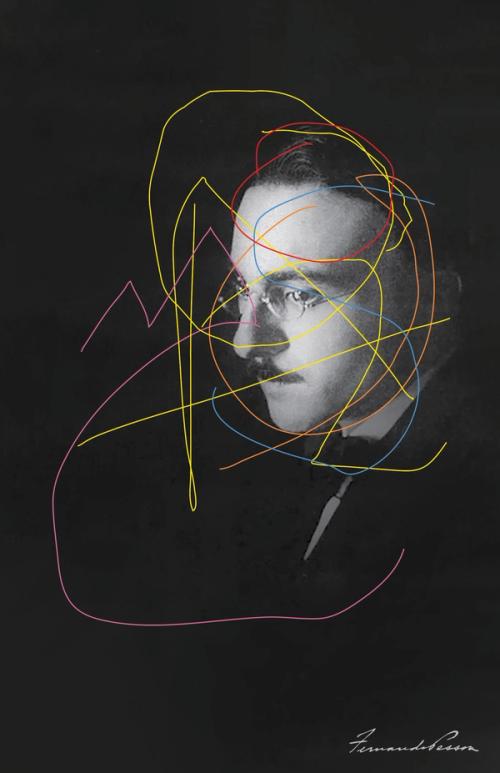Addendum to
The Complete Works of Álvaro de Campos
[Adenda a The Complete Works of Álvaro de Campos]
Patricio Ferrari
Margaret Jull Costa
Keywords
Álvaro de Campos, Poetry, Prose, English translation, New Directions, Facsimiles.
Abstract
The Complete Works of Álvaro de Campos (New Directions, 2023), brings together the poetry and prose of Fernando Pessoa’s most prolific heteronym in English translation, in a single edition, for the first time. More importantly, it features a large number of texts previously unavailable in English. The digital dossier presented here serves as an addendum to the U. S. edition which was abridged to attract a larger anglophone readership. This digital dossier in translation includes all the poems in the Tinta-da-china Poetry Annex section, as well as a large selection of Campos’ prose texts unpublished during Pessoa’s lifetime. Some facsimiles of these texts are also reproduced here for the first time.
Palavra-chave
Álvaro de Campos, Poesia, Prosa, Tradução para inglês, New Directions, Fac-símiles.
Resumo
The Complete Works of Álvaro de Campos (New Directions, 2023), reúne a poesia e a prosa do heterónimo mais prolífico de Fernando Pessoa em tradução inglesa numa única edição, pela primeira vez. Mais importante ainda, apresenta um grande número de textos anteriormente indisponíveis em inglês. O dossiê digital aqui apresentado serve de adenda à edição norte-americana a qual foi abreviada para atrair um maior número de leitores anglófonos. Este dossiê digital em tradução inclui todos os poemas do anexo, bem como uma grande selecção de textos em prosa de Campos não publicados durante a vida de Pessoa. Alguns fac-símiles destes textos são também reproduzidos aqui pela primeira vez.
Álvaro de Campos was one of the three major heteronyms created by Portuguese poet Fernando Pessoa, who gave each heteronym (there were nearly 140 fictitious authors) a thorough biography, including a set of signatures, an astrological chart, literary influences, and philosophical idiosyncrasies (Pessoa, 2022). Campos, according to his creator, was born on 15 October (like the German philosopher Friedrich Nietzsche), but in 1890. He studied mechanical engineering and shipbuilding in Glasgow, yet never completed the course. Orphaned at an early age, he travelled to the East in his early ‘20s where he became an opium addict, much like the Portuguese symbolist poet Camilo Pessanha (1867-1926), who sailed to Macau in 1894. Back in Portugal, on a visit to the Ribatejo province, Campos met Alberto Caeiro―the literary master of Pessoa’s fictitious coterie. A dandy and flaneur, Álvaro de Campos read Blake, Whitman, and Nietzsche, among others. In his own day he was both celebrated and criticized for his vociferous poetry imbued with Whitmanian free-verse rhythms, his praise for the rise of technology and his polemical views on industrial civilization―also attested in manifestos, interviews and essays. Some of his most notable works such as the “Ode marítima” [Maritime ode], “Ultimatum,” and “Tabacaria” [Tobacconist’s shop] were published during Pessoa’s lifetime. Fernando Pessoa did not end Campos’ life, which means that this heteronym would survive his creator, who died in 1935 at the age of 47.
The Complete Works of Álvaro de Campos (New Directions, 2023; Pessoa, 2023) ―based on the ground-breaking Tinta-da-china critical edition published in Portugal by Jerónimo Pizarro and Antonio Cardiello (Pessoa, 2019 [2014])―brings together the poetry and prose of Pessoa’s most prolific heteronym in a single edition in English translation for the first time. Moreover, it features a large number of texts previously unavailable in English.
The digital dossier presented here serves as an addendum to the recently published U.S. edition which was abridged to attract a larger Anglophone readership. The digital publication, available on the New Directions’ website, comprises two sections:
Poetry
Includes all the fragmentary, unfinished, and drafts of poetry that Pessoa attributed to Álvaro de Campos, a fragmentary text from an ode (probably “Passing of the Hours” or “Salute to Walt Whitman”), all the poems whose attribution transitioned from Alberto Caeiro to Campos, and all the poems, which, although unattributed by Pessoa to Campos, the editors linked to this heteronym based on theme, lexicon, and materiality; this section closes with a list of Campos poems that Pessoa assembled in the mid 1920s (36 poems + 1 project list).
Prose
Includes a large selection of prose texts by Álvaro de Campos that remained unpublished during Pessoa’s lifetime, namely, a number of texts written for “Notes in Memory of my Master Alberto Caeiro,” some miscellaneous prose texts such as essays and fiction pieces, the full interview given by Campos, the main extant body of correspondence from the Portuguese and the French, and some loose prose fragments; this section closes with one of the last lists of literary works in which Fernando Pessoa planned to include a book by Álvaro de Campos (57 texts + 1 project list).
The poetry section reproduces all of the original Portuguese texts alongside the English translation; in the prose section, however, the reader will find only the English text. In order to reflect the fragmented or unfinished nature of some of these texts, especially the poems, we have not amended the punctuation. When deemed necessary, we have inserted footnotes for contextualisation. Unless otherwise specified, all the footnotes are by the editors. Some facsimiles of both poems and prose texts are reproduced here for the first time.
*
Whether we’re talking about the bulk of Campos’ corpus, available in the New Directions edition, or the texts published in this dossier, translating Álvaro de Campos into English is deceptively simple. The difficulty lies in reproducing that very conversational style, especially in the poetry, which is also full of oddities like: “A estrada inteiramente insubjectiva | Branca, branca, sem pensamento algum” [The entirely unsubjective road | White, white, without a single thought] (Poetry, n.º 3), interjections to mark a specific cadence, as in “Arre, que tanto é muito pouco!” [Hup, so much is so very little!] (Poetry, n.º 5), or the use of foul language to generate a specific tone (“Ora porra!” [Goddamn it!], Poetry, n.º 6). It is often so tempting when translating to impose a meaning―we are interpreters after all, eager to understand what the writer means―but it is also vital to respect ambiguity and opacity, as in Campos’ proverbs (Prose, n.º 33). Translating the distinct rhythms of Pessoa’s three heteronyms is equally crucial, as in the staccato cadence produced by anaphora (repetition of words at the beginning of successive poetic lines) (Poetry, n.º 17)―one of Walt Whitman’s favored rhetorical devices―or the use of syntactical rhythm (e.g., “Trapos somos, trapos amamos, trapos agimos.” [We are rags, we love as rags, we live as rags.], Poetry, n.º 14.
Equally important is getting the tone right, ventriloquizing the voice of the poet, as much as that of the fiction writer. Capturing the humor, as well as the lucid, snarky, superior tone, of Campos’ interview, with the additional challenge of common Portuguese expressions (e.g., “Conto do vigário” [Shaggy Dog Story]) (Prose, n.º 46) requires not only close attention, but also reading and rereading Pessoa’s ‘other’ heteronyms, including Pessoa himself.
While the poetry section in this dossier represents only the tail of Campos’ comet, the same metaphor cannot be applied to the prose―especially the selection of miscellaneous prose texts. In the latter, the reader will bear witness to Campos’ varied tapping into an array of fields of knowledge―from literature and philosophy to politics, sociology, and psychology. It is no surprise that Campos, the prose writer, has been compared to the author(s) of The Book of Disquiet. At times, even Pessoa could not tell them apart, as evident in a text datable to 1930, where his creator wrote: “Alvaro de Campos (?) or The Book of Disquiet (or something else),” (Prose, n.º 56). This reveals the extent to which Pessoa’s heteronymic project remained a grand work in progress.
Poetry
I. Clearly Campos
The sixteen texts in this section―explicitly attributed to Álvaro de Campos by Fernando Pessoa―are fragmentary, unfinished or can simply be considered drafts.
Annex 1 [c. 1915]
O binomio de Newton é tão bello como a Venus
[de Milo.
O que ha é pouca gente para dar por isso.
(Alvaro de Campos)
óóóó ― óóóóóóóóó ― óóóóóóóóóóóóóó
(O vento lá fóra).]
[Newton’s binomial theorem is as beautiful as the Venus
[de Milo.
It’s just that very few people realize this.
(Álvaro de Campos)
óóóó ― óóóóóóóóó ― óóóóóóóóóóóóóóó
(The wind outside).]
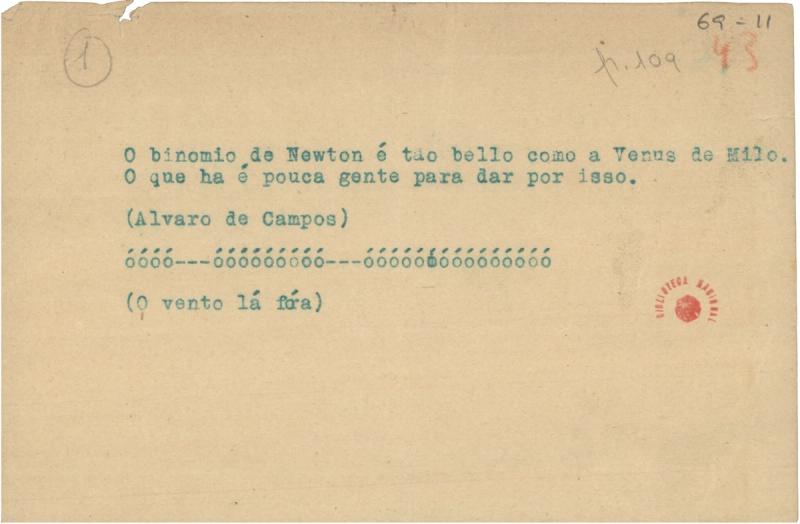
Annex 2 [c. 1915]
E, disperso arfar de sêdas pretas, o silencio [And, the dispersed panting of black silk, the silence
[da Noite. [of the Night.
Uma comedia a sangue e noite
A comedy of blood and night
As mortes, o ruido, as violações, o sangue,
Deaths, noise, rapes, blood,
[o brilho das baionetas... [the glint of bayonets...
Todas estas cousas são uma só cousa e essa cousa
All these things are just one thing, and that thing
[sou Eu... [is Me...]
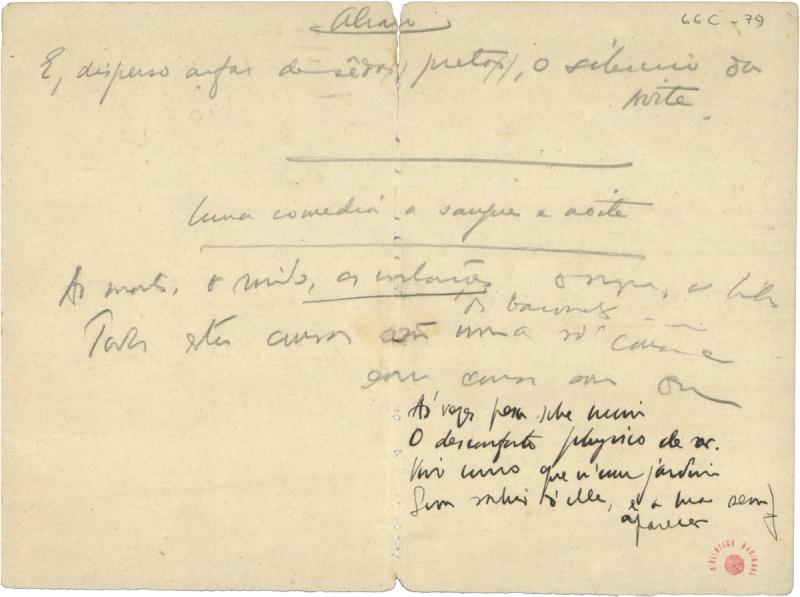
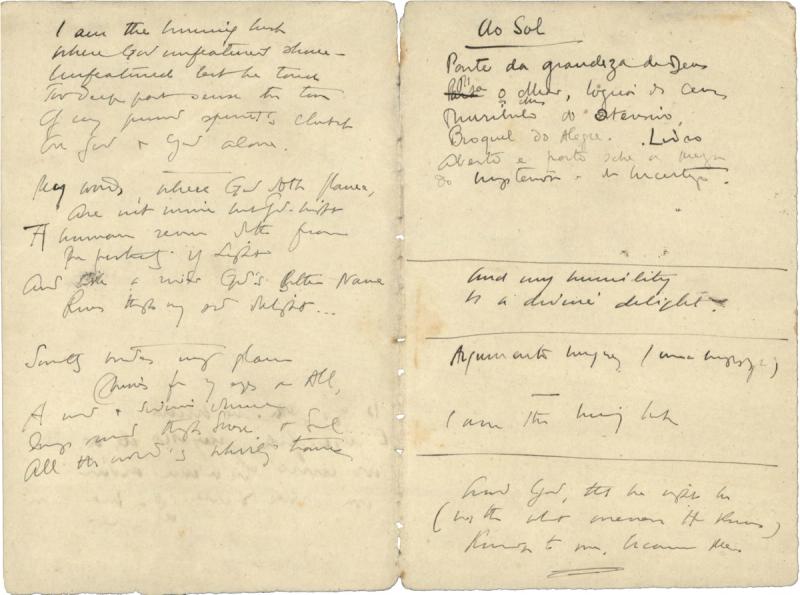
Annex 3 [c. 1915]
A estrada inteiramente insubjectiva
[The entirely unsubjective road
Branca, branca, sem pensamento algum
White, white, without a single thought]
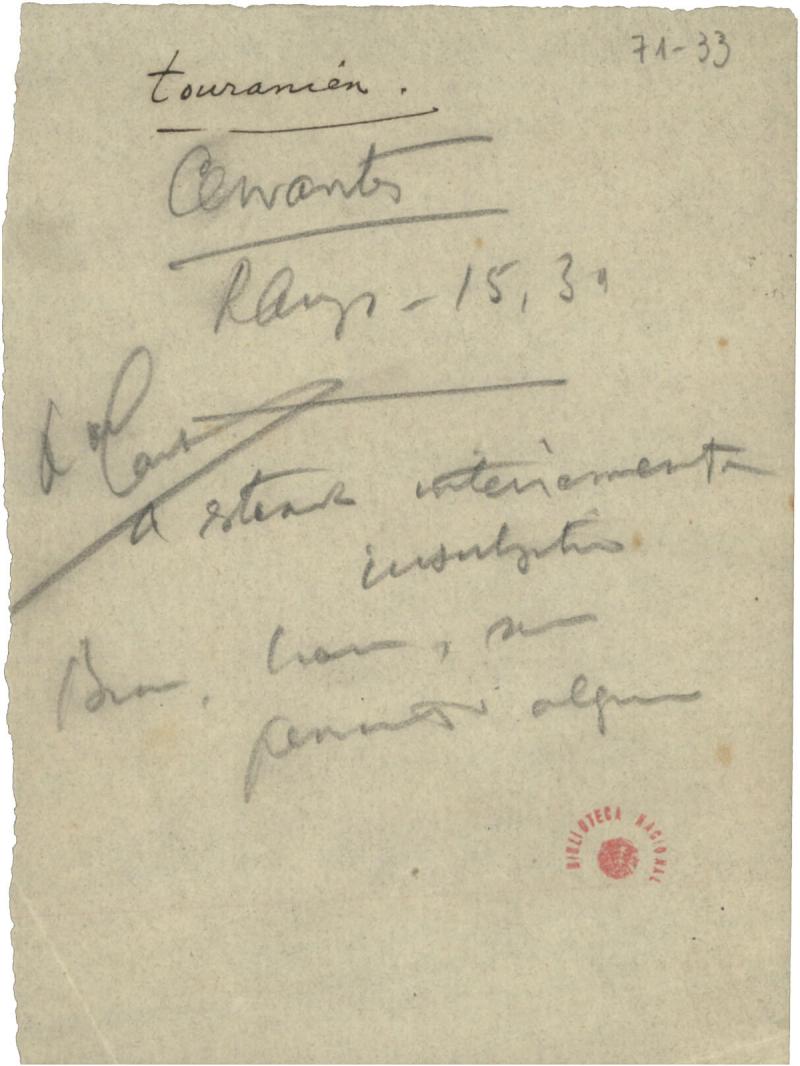
Annex 4 [c. 1915]
Toda a gente é interessante se a gente souber
[Everyone is interesting if we know how
[ver toda a gente. [to look at everyone.
Que obra-prima virtual cada cara que existe!
What a potential work of art every face is!
Que expressões em todas, em tudo!
What expressions there are on every face, on everything!
Que extraordinario perfil qualquer perfil!
What an extraordinary profile any and every profile is!
Vista de frente, que cara qualquer cara!
Seen full on, what a face every face is!
Os gestos humanos de tal qual, que humanos
How human are the human gestures
[os gestos! [of any human!]
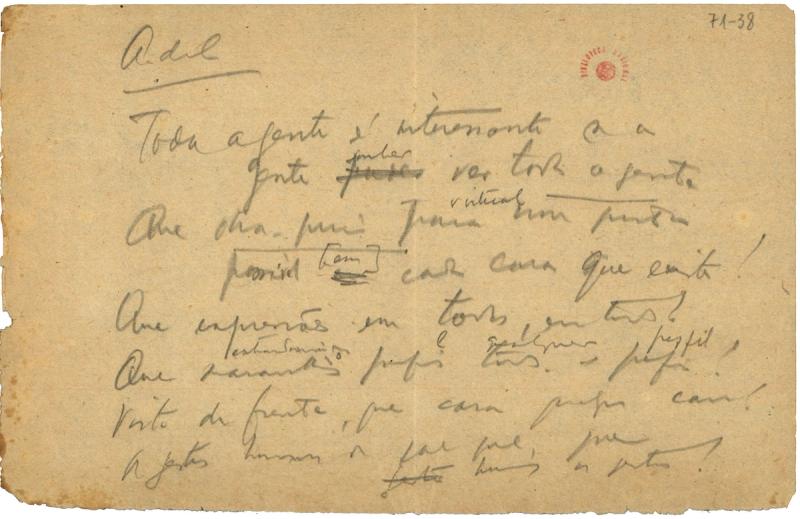
Annex 5 [c. 1915]
Arre, que tanto é muito pouco! [Hup, so much is so very little!
Arre, que tanta besta é muito pouca gente!
Hup, so many brute beasts make so few people!
Arre, que o Portugal que se vê é só isto!
Hup, the Portugal we see is only this!
Deixem ver o Portugal que não deixam ver!
Let the Portugal they won’t let people see be seen!
Deixem que se veja, que esse é que é Portugal!
Let it be seen, because that is what Portugal is!
Ponto. Period.
Agora começa o Manifesto:
Here begins the Manifesto:
Arre! Hup!
Arre! Hup!
Oiçam bem: Listen up:
ARRRRRE! HUUUUUUP!]
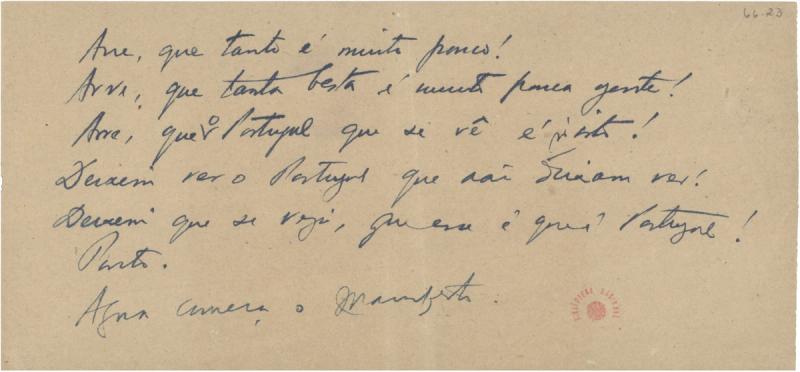
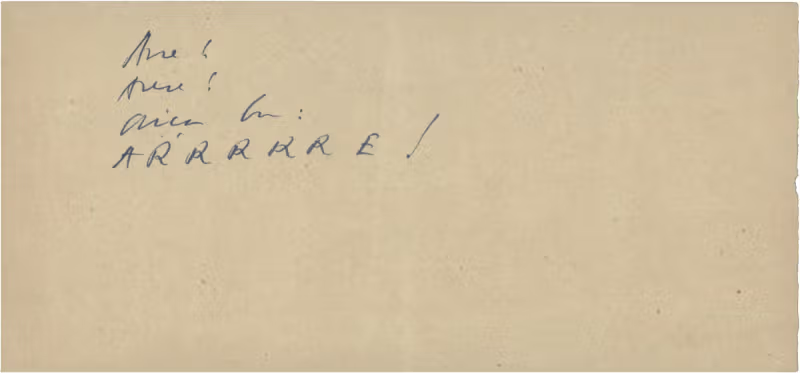
Annex 6 [c. 1915]
Ora porra! [Goddamn it!
Então a imprensa portugueza é que é a
So the Portuguese press is what
[imprensa portugueza? [the Portuguese press is?
Então é esta merda que temos que beber com
So this is the shit we have to drink in with
[os olhos? [our eyes?
Filhos da puta! Não, que nem ha puta que
Sons of bitches! No, no bitch would have
[os parisse. [borne them.]
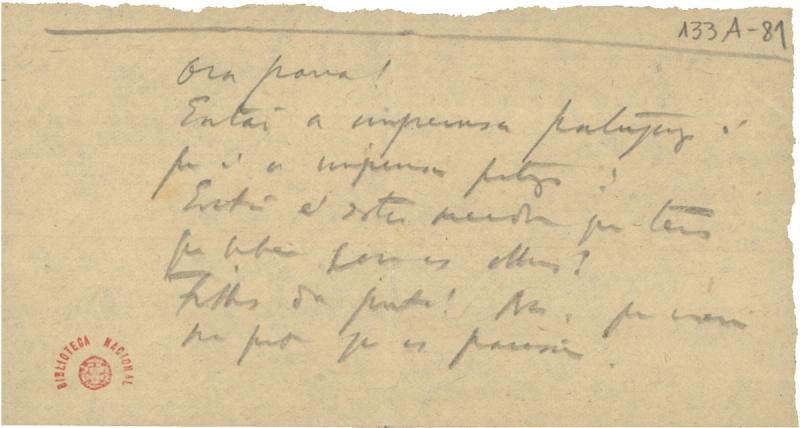
Annex 7 [c. 1928]
O que é haver ser, o que é haver seres, o que é
[How amazing that being exists, how amazing that beings
[haver cousas, [exist,how amazing that things exist,
O que é haver vida em plantas e nas gentes,
How amazing that there is life in plants and in people,
E cousas que a gente constroe –
And things that people make ―
Maravilhosa alegria de cousas e de seres –
A marvellous joyous coming-together of things and people
Perante a ignorancia em que estamos de como
Especially given our complete ignorance of how
[isto tudo pode ser. [all this can possibly be.]

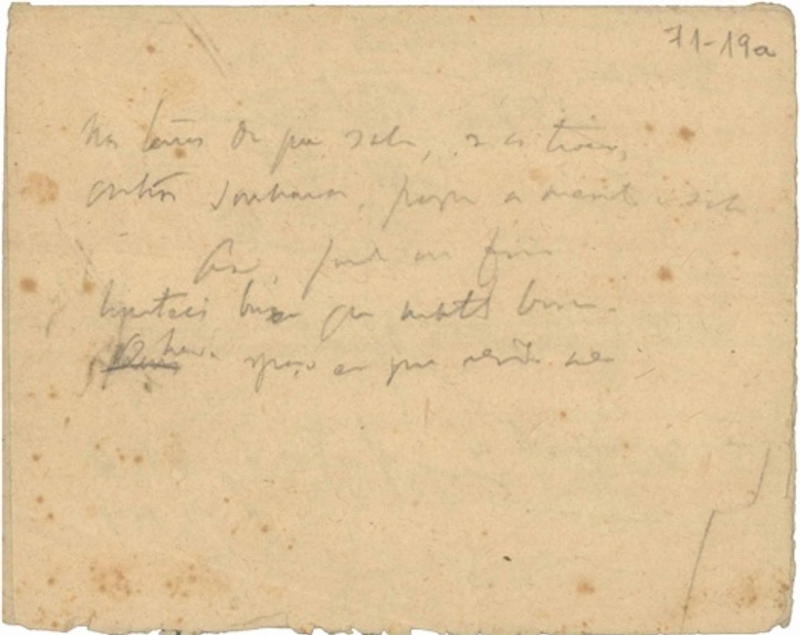
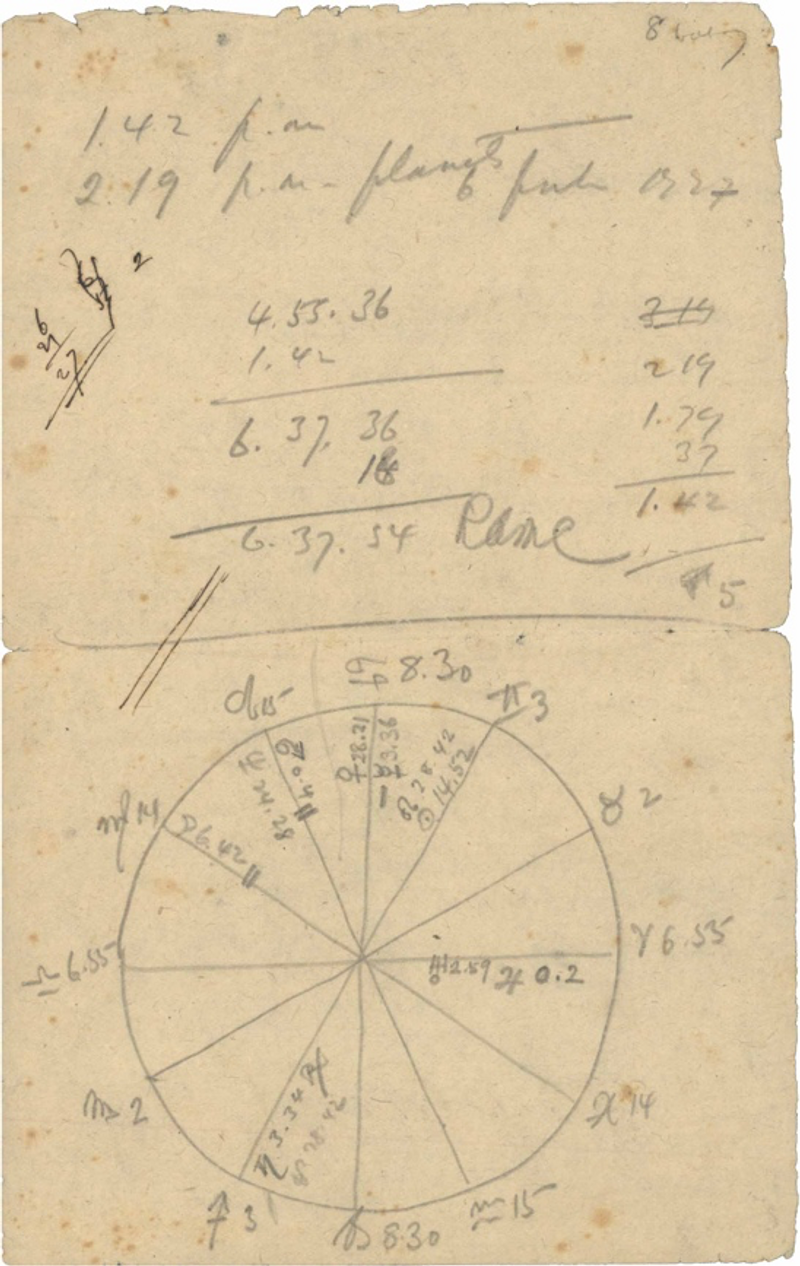
Annex 8 [22-1-1929]
O soslaio do operario estupido ao
[The stupid workman’s sideways glance at the
[engenheiro doido – [crazy engineer ―
O engenheiro doido fóra da engenharia...
The crazy engineer outside the world of engineering...
O sorriso trocado que sinto nas costas quando
The exchange of glances behind my back when
[passo entre os normaes –
I walk among normal people ―
(Quando me olham cara a cara não os sinto sorrir).
(When they look me in the face, I don’t feel them smile).]
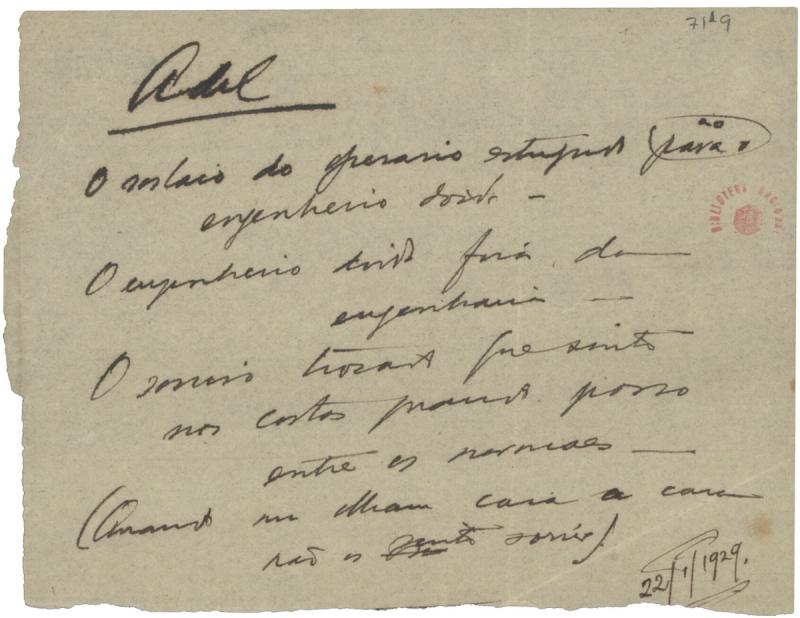
Annex 9 [c. 22-1-1929]
Não tenho sinceridade nenhuma que te dar.
[I have no sincerity to give you.
Se te fallo, adapto instintivamente phrases
If I speak to you, I instinctively adapt my phrases
A um sentido que me esqueço de ter.
To a meaning I forget to have.]

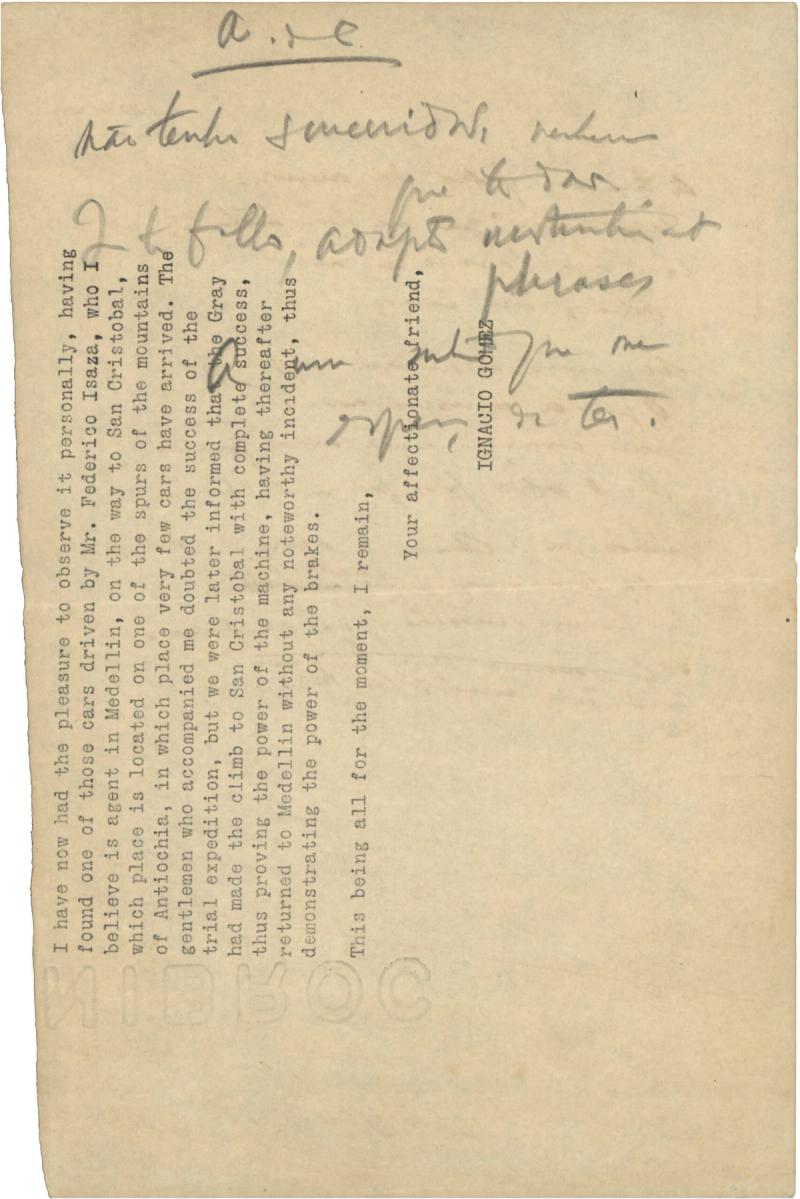
Annex 10 [c.1929]
Desfraldando ao conjuncto ficticio
[Unfurling before the fictitious entirety
[dos ceus estrellados [of the starry skies
O splendor do sentido nenhum da vida...
The splendid meaninglessness of life...
Toquem num arraial a marcha funebre minha!
Let them play my funeral march at a fair!
Quero cessar sem consequencias...
I want to cease without any consequences...
Quero ir para a morte como para uma festa
I want to go to death as if to a party
[ao crepusculo. [in the dusk.]
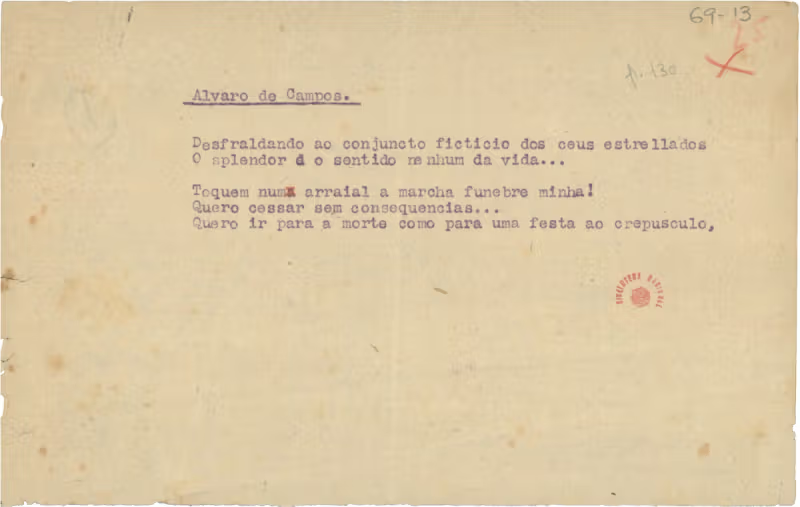
Annex 11 [28-2-1931]
Ah, quem me dera ser desempregado!
[Ah, how I wish I didn’t have a job!
Não ter que fazer a valer, mas de dentro!
To have absolutely nothing to do, but inside!
Ter [...] To have (...)]
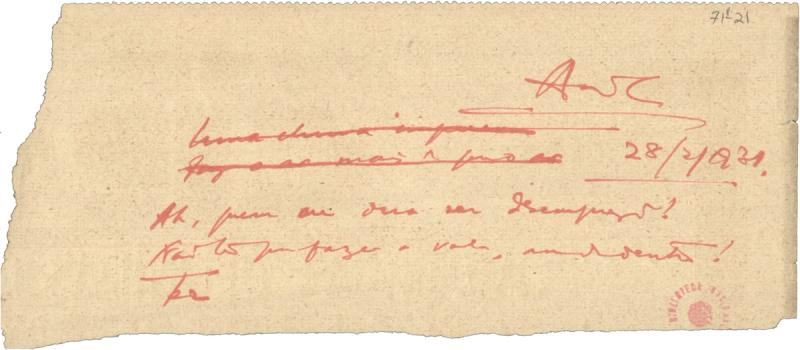

Annex 12 [c. 1931]
Mas eu não tenho problemas; tenho só mysterios.
[But I don’t have any problems; I have only mysteries.
Todos choram as minhas lagrimas, porque as
Everyone weeps my tears, because
[minhas lagrimas são todos. [my tears are everyone.
Todos soffrem no meu coração, porque o meu
Everyone suffers in my heart, because my
[coração é tudo. [heart is everything.]
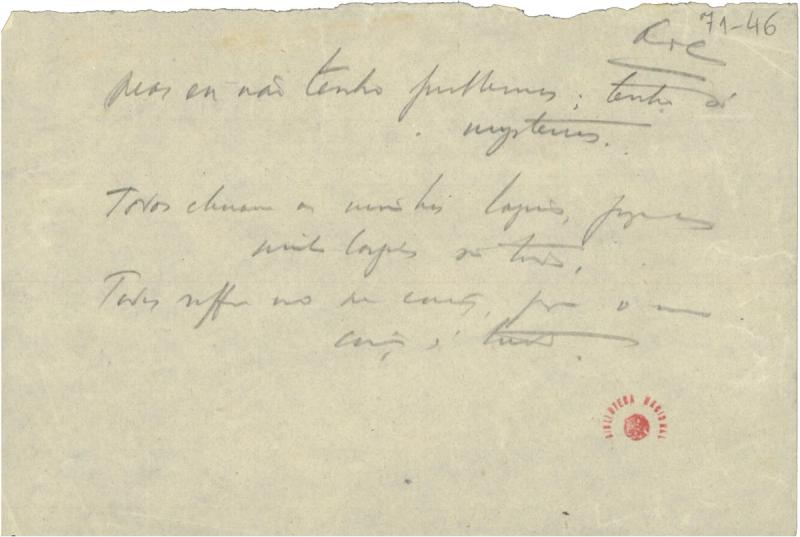
Annex 13 [c. 1931]
O horror sordido do que, a sós comsigo,
[The sordid horror of what, alone with itself,
Vergonhosa de si no escuro, cada alma
Shamefaced in the darkness, every
[humana pensa. [human soul thinks.
A agua de aqui é boa, não é?
Is the water around here good?
Se é! Quantos vinhos que julguei melhores bebi!
Yes, it is! Better even than some wines I’ve drunk!
A agua de aqui – a verdade!
The water around here ― the truth!
A verdade não – a melhor apparencia d’ella...
No, not the truth ― the closest thing to the truth...
Quando, em grandes praças de eu distrahido,
When, in the great squares of my distracted self,
Apregoam em torno de mim os jornaes todos
When, all around me, the newspaper sellers are hawking
[e eu durmo. [their wares, I sleep.]
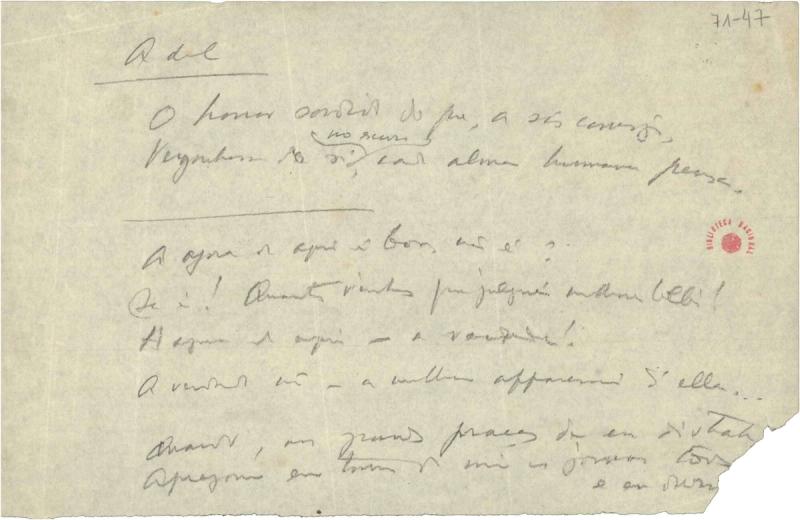
Annex 14 [c. 29-1-1933]
A clareza falsa, rigida, não‐lar dos hospitais
[The false, stiff, unhomely brightness of hospitals
A alegria humana, vivaz, sobre o caso da vizinha
The cheerful human joy at the case of the neighbor
Da mãe inconsolavel a que o filho morreu
Of the inconsolable mother whose son died
[ha um anno [a year ago.
Trapos somos, trapos amamos, trapos agimos.
We are rags, we love as rags, we live as rags.
Que trapo tudo que é este mundo!
This whole world is a rag!
Onde é que os mortos dormem? Dorme alguem
Where do the dead sleep? Does anyone sleep
Neste universo atomicamente vão?
In this atomically futile universe?]

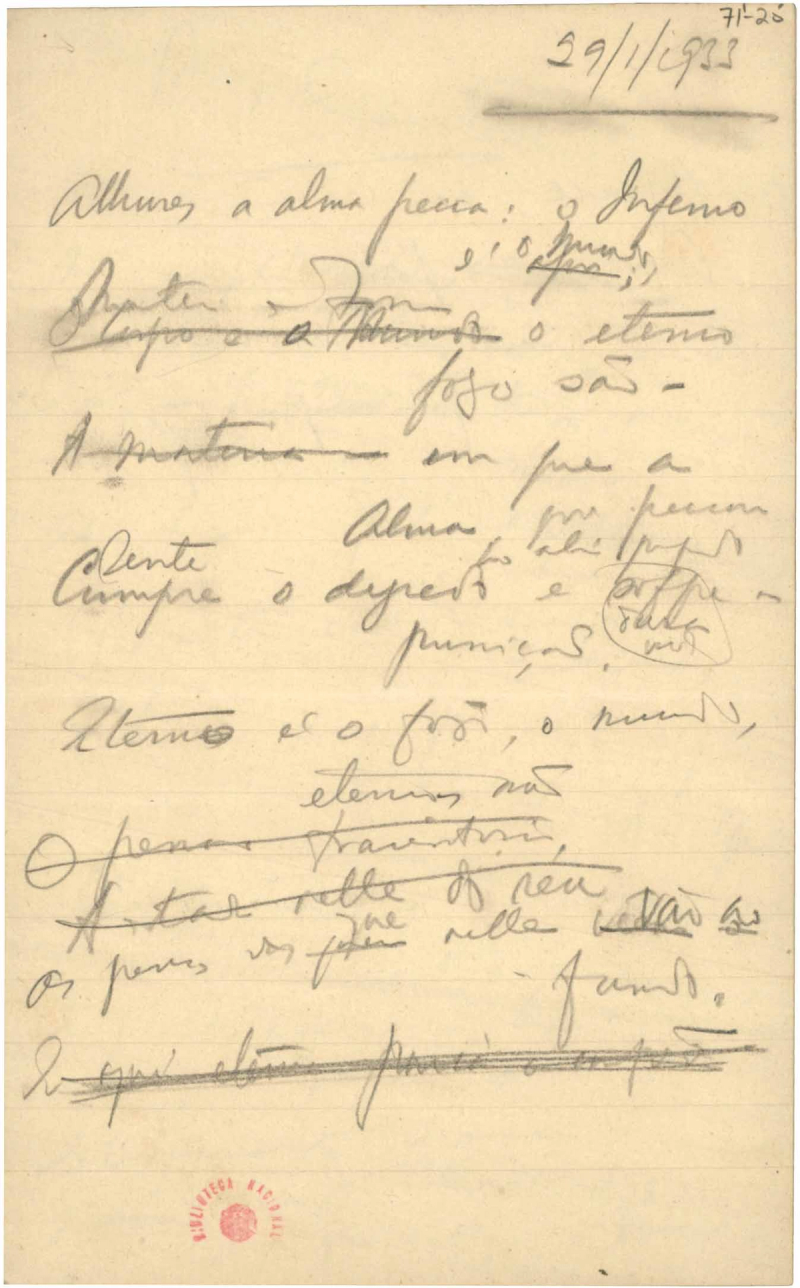
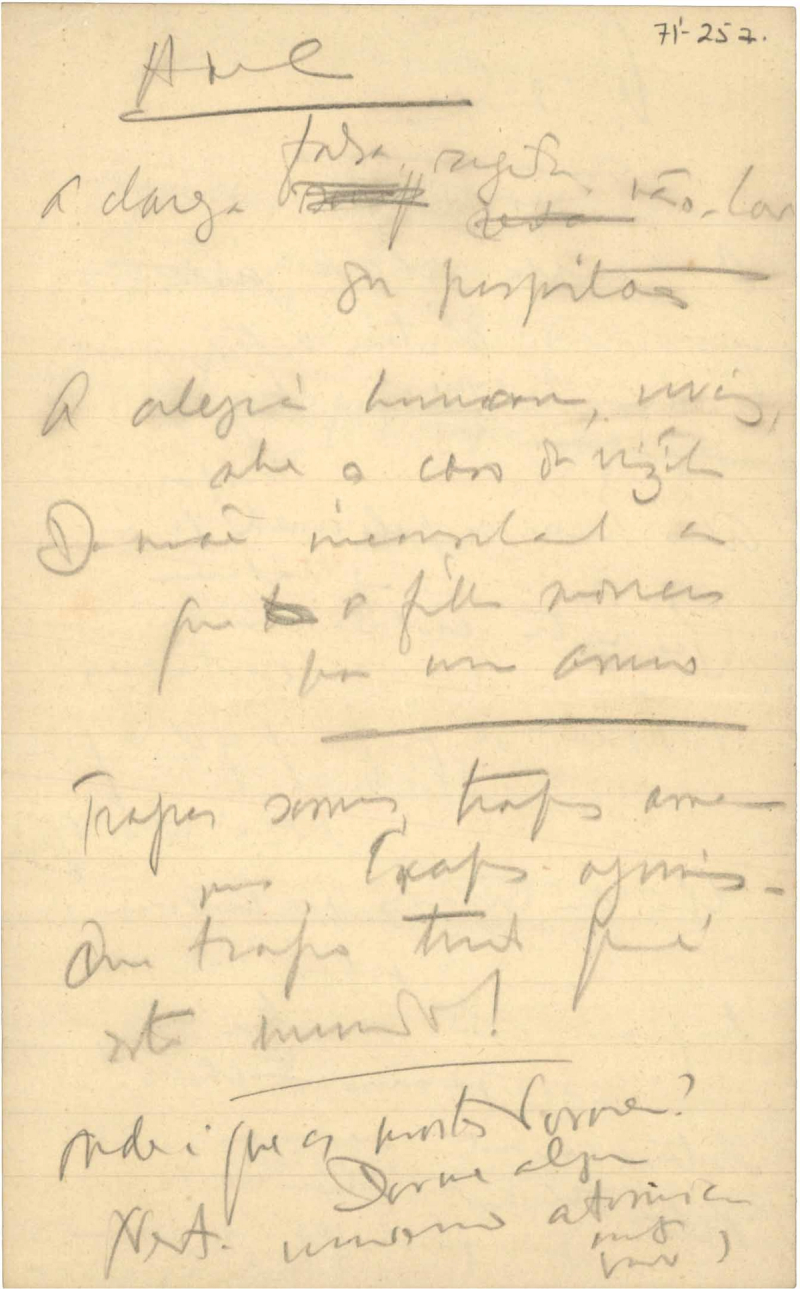
Annex 15 [c. 1933]
O sorriso triste do ante‐dia que começou,
[The sad smile of the pre-dawn that has just begun,
Platina fria no engaste de negro azulando‐se
Cold platinum in the black frame growing
[escuramente. [darkly blue.]
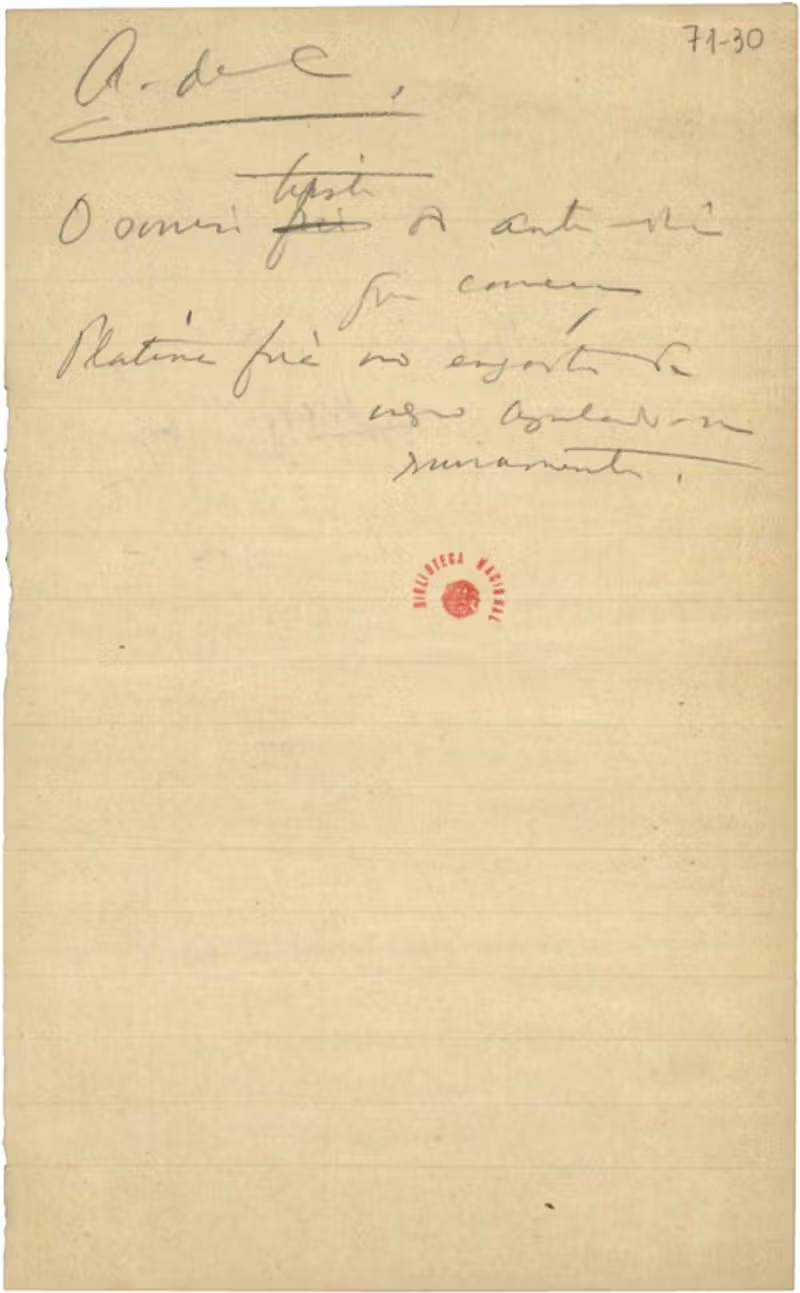
Annex 16 [c. 1935]
Não ter emoções, não ter desejos, não ter vontades,
[To have no emotions, no desires, no ambitions,
Mas ser apenas, no ar sentido das coisas
Just to be, in the sentient air of things
Uma emoção abstracta com azas de pensamento,
An abstract emotion with wings of thought,
[...] (...)
Não ser desonesto nem não desonesto, separado
Not to be dishonest or not-dishonest, separately or
[ou junto, [together,
Nem egual a outros nem differente dos outros,
Neither equal to others nor different from others,
Vivel‐os em outrem, separar‐se d’elles
But to experience them otherly, to separate oneself from them
Como quem, distrahido, se esquece de si...
Like someone who, distracted, forgets himself...]
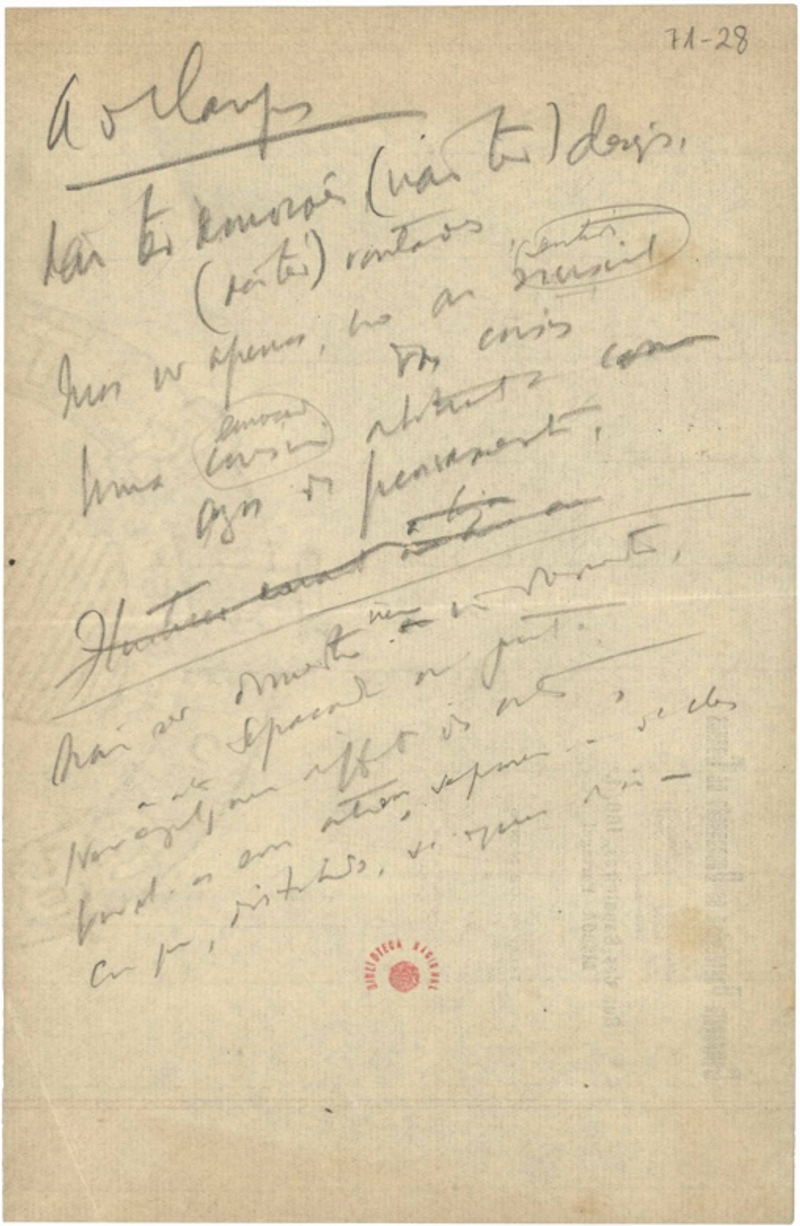
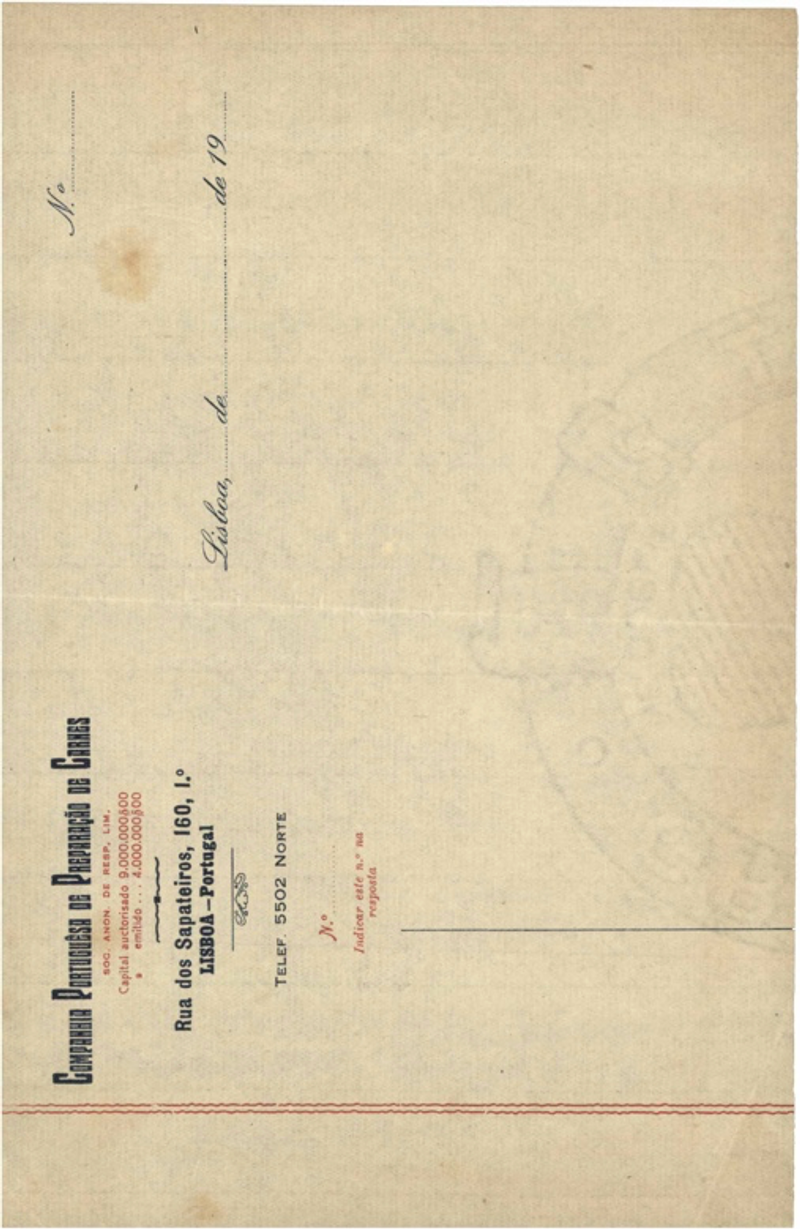
II. Passing of The Hours or Whitman
This fragment could be part of two odes included in The Complete Works of Álvaro de Campos: “Salute to Walt Whitman” (n.º 11) or “The Passing of the Hours” (n.º 13). Its inclusion in this Poetry Appendix accentuates its open-ended nature.
Annex 17 [c. 1916]
Passagem das horas ou Walt Whitman [Passing of the Hours or Walt Whitman
Eu, o rhythmista febril I, the febrile rhythmist
Para quem o paragrapho de versos é uma pessoa
For whom a paragraph of verses is a whole
[inteira, [person,
Para quem, por baixo da metaphora apparente,
For whom, beneath the apparent metaphor,
Como em strophe, antistrophe, epodo o poema
Like this poem I’m writing in strophe, antistrophe,
[que escrevo, [and epode,
Que por detraz do delirio construo
That I construct out of madness
Que por detraz de sentir penso
That I think out of feeling
Que amo, expludo, rujo, com ordem e oculta
That I love, explode, roar, with a hidden order and a hidden
[medida,[measure,
Eu ante ti quereria ter menos de engenheiro
With you, I would like to have less of the engineer
[na alma, [in my soul,
Menos de Grego das machinas, de Bacchante
Less of the Greek of machines, less Bacchante
[de Apollo[of Apollo,
Nos meus momentos de alma mutiplicados
In my soulful moments multiplied
[em versos. [into verses.
Mas o ar do mar alto
But the air of the high seas
Chega, por um influxo de dentro do meu sangue
Arrives in an influx from within my blood
Ao meu cerebro desterrado em terra,
To my brain in exile from exile,
E a furia com que medito, a raiva com que
And the fury with which I meditate, the rage with which
[me domino [I subdue myself
Abre‐se como uma vela, tomada de vento, aos ares
Opens to the air like a sail filled by the wind,
Ampla servidão ao rasgo de assombro dos [...]
Ample servitude to the flicker of amazement of the (...)]
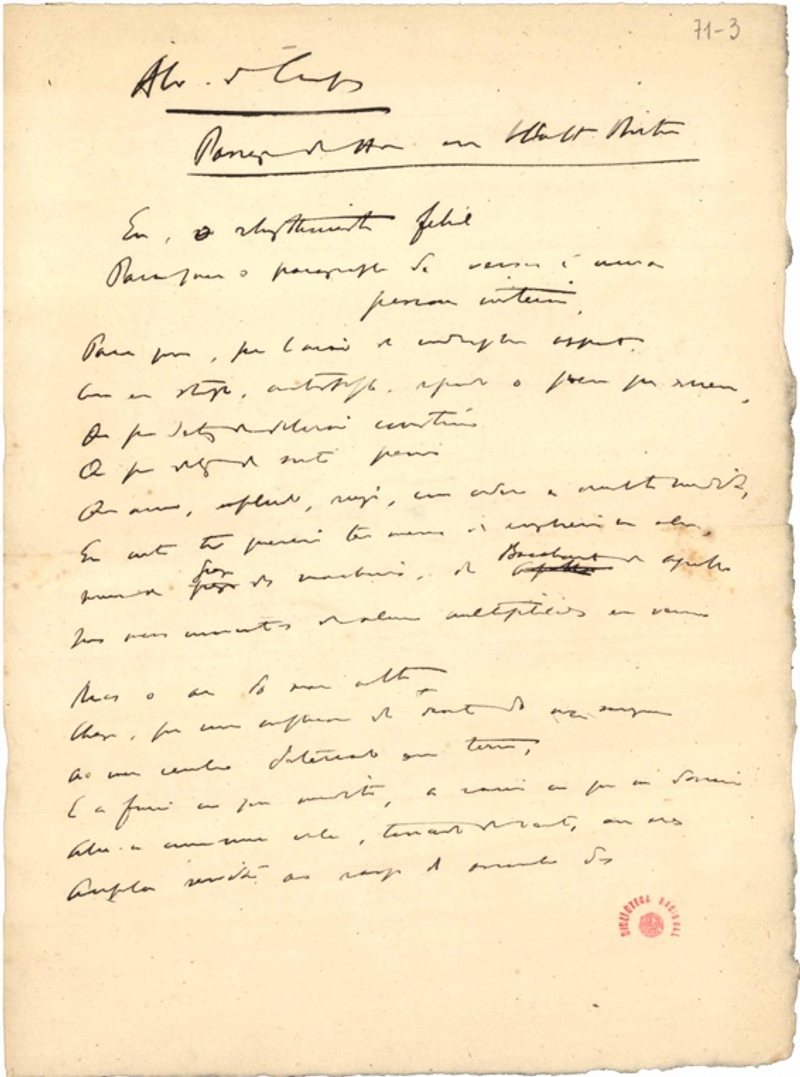
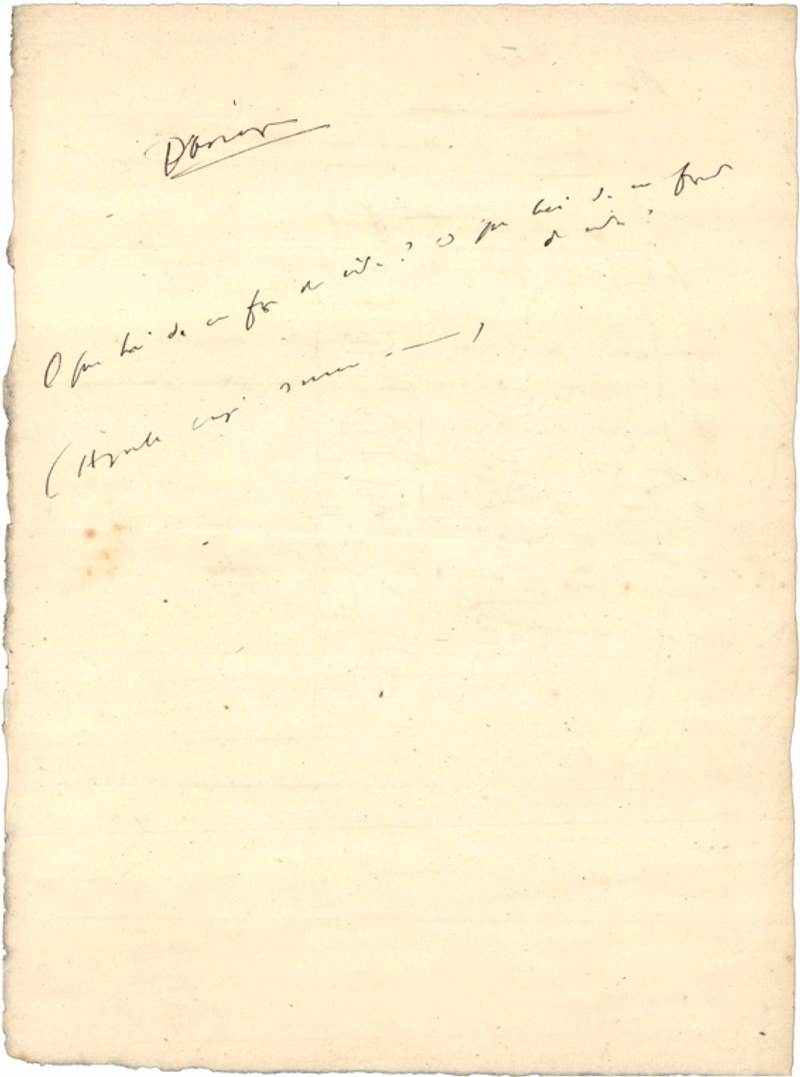
III. From Caeiro to Campos
The four texts in this section were attributed to Álvaro de Campos at a later date and not when they were written. They reveal a transition from an avant-garde Alberto Caeiro to a sensationist Campos.
Annex 18 [c. 27-11-1914]
O melodioso systema do Universo, [The melodious system of the Universe,
O grande festival pagão de haver
The great pagan festival celebrating the existence
[o sol e a lua [of the sun and the moon
E a titanica dança das estações
And the titanic dance of the seasons
E o rhythmo placido das eclípticas
And the placid rhythm of the ecliptics
Mandando tudo estar calado.
Commanding everything to fall silent.
E atender apenas ao brilho exterior do universo.
And attend only to the outer glow of the universe.]
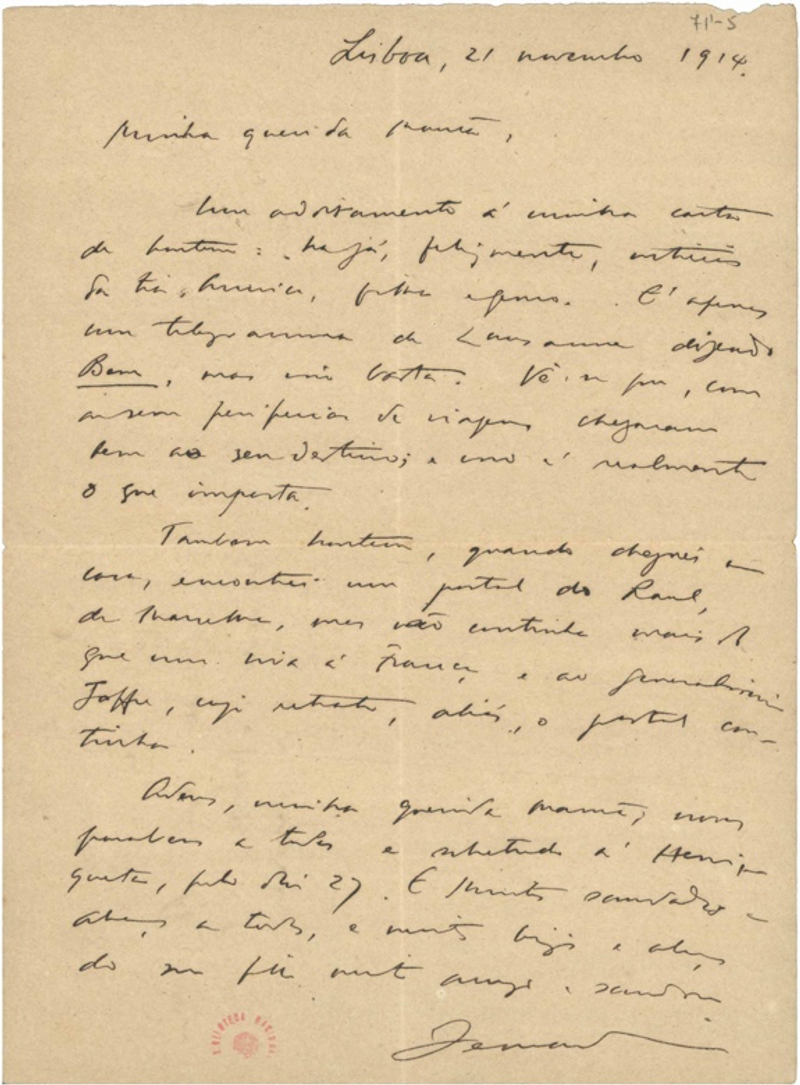
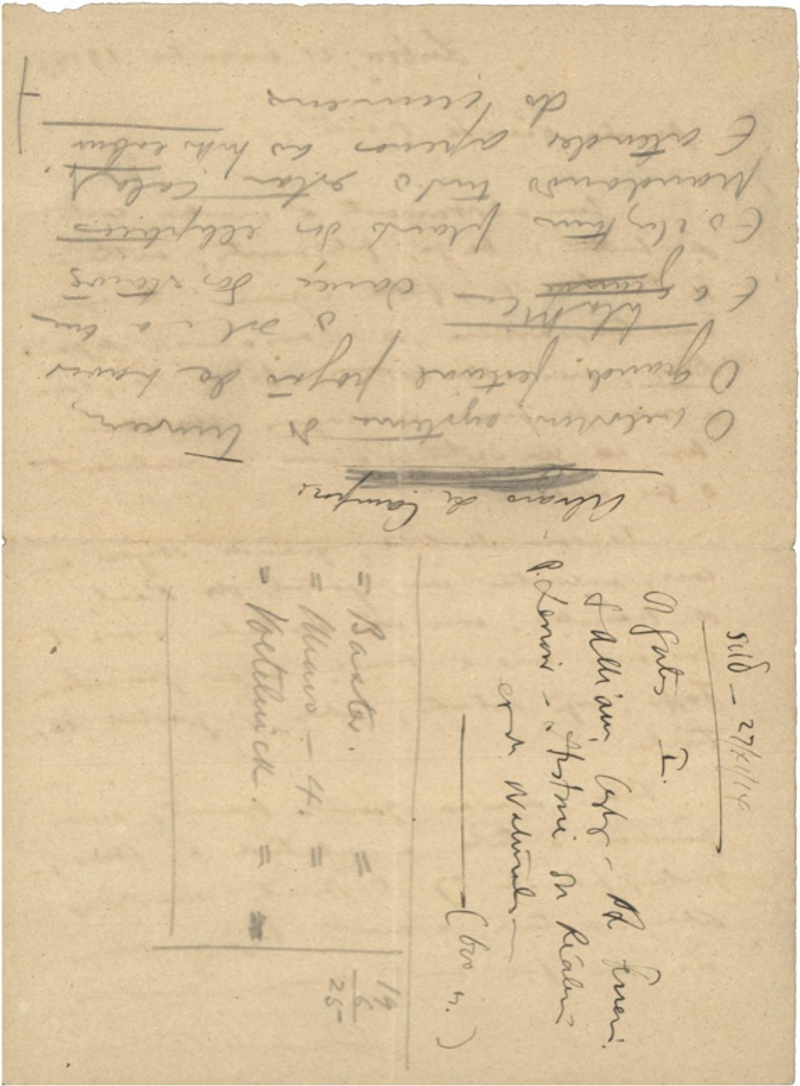
Annex 19 [c. 1914]
Ah, os primeiros minutos nos cafés de novas
[Ah, the first few minutes in the cafés of new
[cidades![cities!
A chegada pela manhã a caes ou a gares
Arriving in the morning at docks and train stations
Cheios de um silencio repousado e claro!
Full of a bright, restful silence!
Os primeiros passantes nas ruas das cidades
The first passers-by in the streets of the cities
[a que se chega... [you arrive in...
E o som especial que o correr das horas tem
And the special sound that the passing of the hours makes
[nas viagens... [on journeys...
Os omnibus ou os electricos ou os automoveis...
The buses or the trams or the automobiles...
O novo aspecto das ruas de novas terras...
The new look of the streets of new places...
A paz que parecem ter para a nossa dôr,
The peace they seem to bring to our sorrows,
O bulicio alegre para a nossa tristeza,
The joyful bustle to our sadness,
A falta de monotonia para o nosso coração cançado!...
The lack of monotony to our weary [heart!...
As praças nitidamente quadradas e grandes,
The squares so very quadrangular and large,
As ruas com as casas que se approximam ao fim,
The streets with endless rows of houses,
As ruas transversaes revelando subitos interesses,
The side streets suddenly revealing something interesting,
E atravez d’isto tudo, como uma cousa que inunda
And through it all, like a thing that floods
[e nunca transborda [and never overflows,
O movimento, o movimento,
Movement, movement,
Rapida cousa colorida e humana que passa e fica...
A sudden colorful human thing that passes and stays...
Os portos com navios parados,
Ports with moored ships,
Excessivamente navios parados,
Too many moored ships,
Com barcos pequenos ao pé, esperando...
With small boats nearby, waiting...]
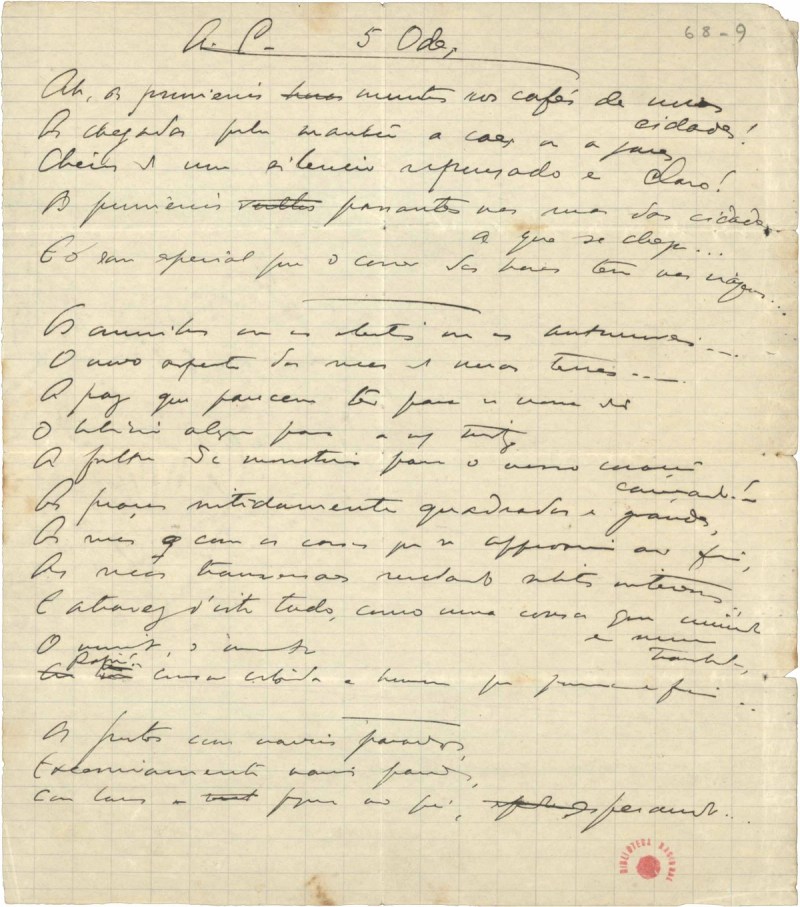
Annex 20 [c. 1914]
Uma vontade phyisica de comer o universo [A physical desire to eat the whole universe
Toma ás vezes o logar do meu pensamento...
Sometimes replaces my thoughts...
Uma furia desmedida
An unbridled fury
A conquistar a posse como que absorvedora
To take seemingly all-absorbing possession
Dos céus e das estrelasOf the skies and the stars
Persegue-me como um remorso de não ter
Pursues me like a feeling of remorse for not having
[comettido um crime. [committed a crime.
Como quem olha um mar
Like someone gazing at the sea
Olho os que partem em viagem...
I gaze at those setting off on a journey...
Olho os comboios como quem os estranha
I gaze at the trains as if I’d never seen them before,
Grandes cousas ferreas e absurdas
Absurd great iron contraptions
[que levam almas. [transporting souls,
Que levam consciencias da vida e de si-proprias
Transporting awarenesses of life and of themselves,
Para logares verdadeiramente reaes,
To really real places,
Para os logares que ― custa a crer ―
To places which ― hard though it is to believe ―
[realmente existem [really exist,
Não sei como, mas é no espaço e no tempo
How I don’t know, but they do exist in space and time
E teem gente que tem vidas reaes
And contain people who lead real lives
Seguidas hora a hora como as nossas vidas...
That are lived hour by hour just like our lives...
Ah, por uma nova sensação physica
Ah, for a new physical sensation
Pela qual eu possuisse o universo inteiro,
By which I could possess the entire universe,
Um novo tacto que fizesse pertencer-me,
A new touch that would make mine,
A meu ser possuidor phyisicamente,
Physically mine,
O universo com todos os seus sóes
The universe with all its suns
[e as suas estrelas [and its stars
E as vidas multiplas das suas almas...
And the multiple lives of its souls...]
Annex 21 [c. 1914]
E eu era parte de toda a gente que partia,
[And I was part of the crowd leaving,
A minha alma era parte do lenço com que
My soul part of the handkerchief that
[aquella rapariga acenava [the girl was waving
Da janella afastando‐se de comboio...
From the window as the train left...
O adeus do rapaz de bonnet claro
The farewell of the boy in the bright hat
É dirigido a alguem dentro de mim
And addressed to someone inside me
Sem que elle o queira ou o saiba...
Without him wanting it or knowing it...
E Paris‐Fuentes d’Oñoro
And Paris-Fuentes d’Oñoro written
Em lettras encarnadas em fundo branco
In red letters on a white background
Ao centro da carrugem, e no alto
In the center of the railway wagons, and on top
Em lettras que parecem mais vivas e salientes
In brighter and more prominent letters,
Ca Internacional dos Wagons [illegible word]
International [illegible word] Wagons Company
E o comboio avança – e eu fico...
And the train moves off― and I stay...
Ah, as horas indecisas em que a m[inha] vida
Ah, the indecisive hours when my life seems to have
[parece ter sido de um outro...[belonged to someone else...
As horas do crepusculo no terraço
The twilight hours on the terraces
[dos cafés cosmopolitas! [of cosmopolitan cafés!
Na hora de olhos humidos em que
The hour of tear-filled eyes when
[se accendem as luzes [the lights come on
E o cansaço sabe vagamente a uma febre passada.
And tiredness tastes vaguely of a fever now gone.
Grandes estandartes de fumo
Great banners of smoke from
[das chaminés das fabricas [the chimneys of factories
Sobre os telhados [...] Over the rooftops (...)]
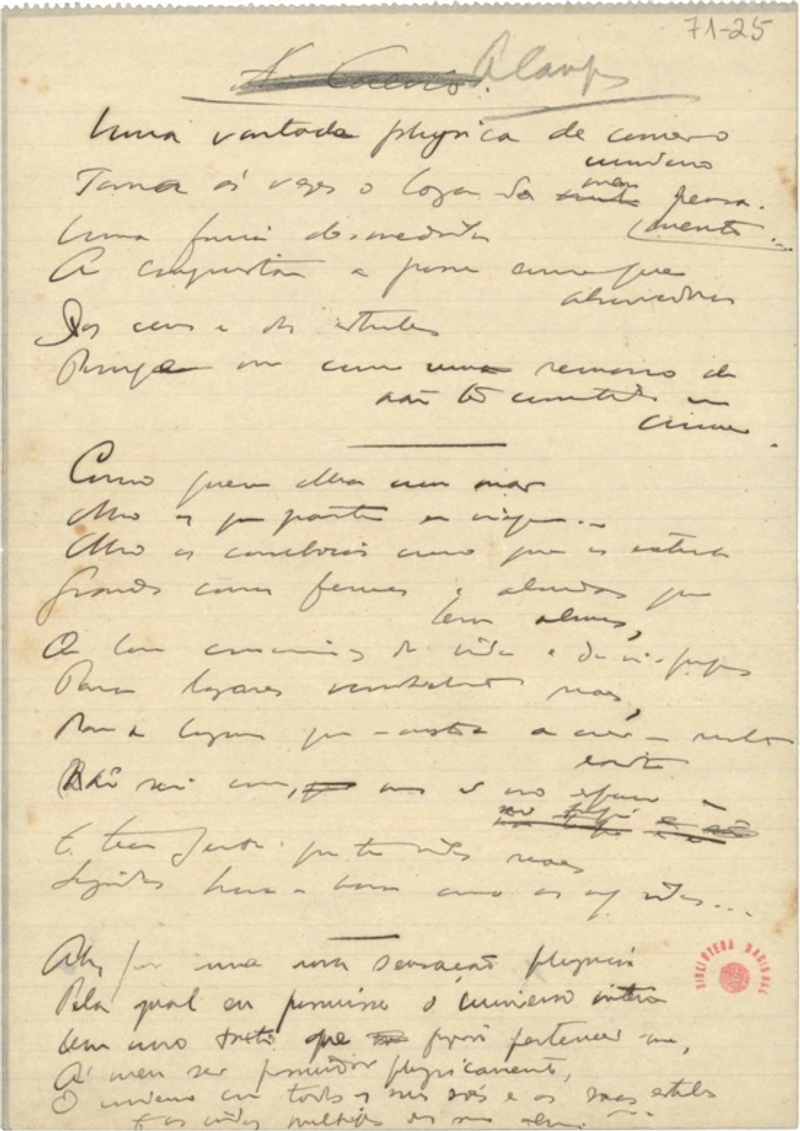
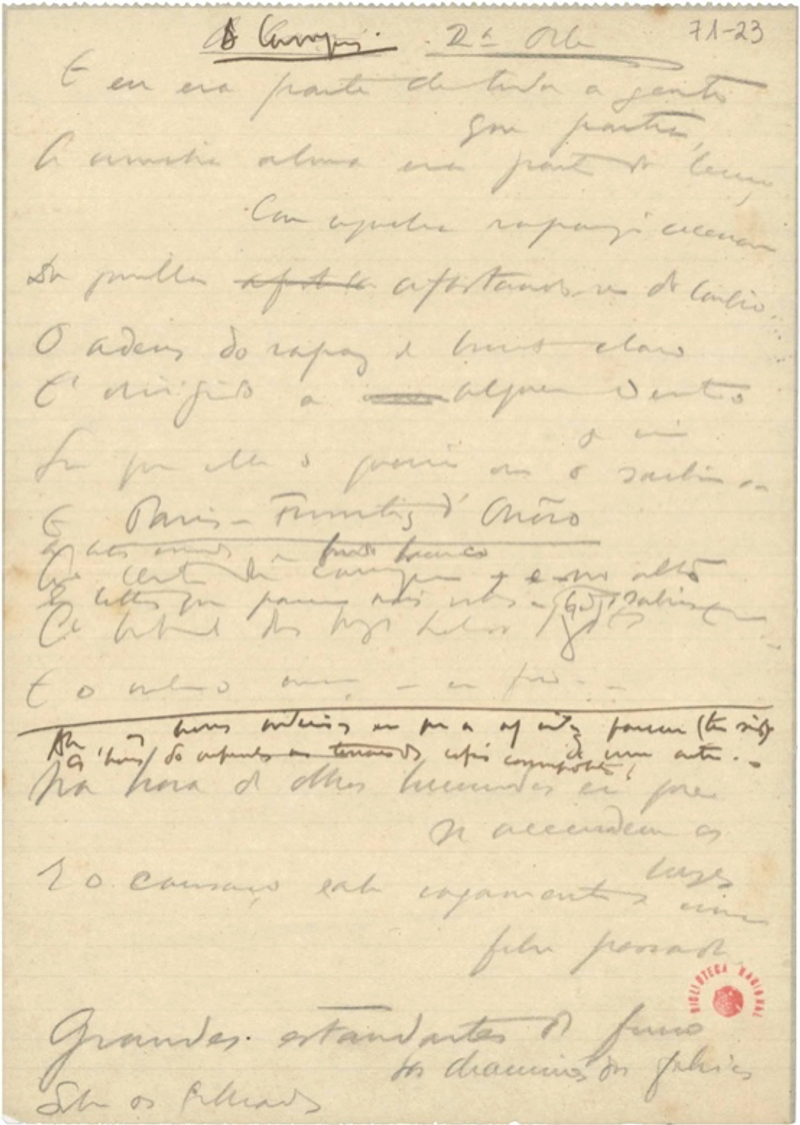
IV. Maybe Campos
In this final section of poetry, we include fifteen texts that Pessoa did not attribute to Campos and which are not necessarily attributable to him. According to the editors, there may well be many more texts of this nature in the Pessoa Archive held at the National Library of Portugal.
Annex 22 [20-11-1914]
Chove muito, chove excessivamente...
[It’s raining heavily, it’s raining excessively...
Chove e de vez em quando faz um vento frio...
It’s raining and every now and then there’s a cold wind...
Estou triste, muito triste, como se eu fosse o dia...
I am sad, very sad, as if I were the day itself...
N’um dia no meu futuro em que chova
One day in my future when it’s raining
[assim tambem [like this
E eu, á janella, de repente me lembre do dia de hoje,
And, standing at the window, I suddenly remember today,
Pensarei eu “ah, n’esse tempo eu era mais feliz”
I’ll think “ah, I was happier then”
Ou pensarei “ah que tempo triste foi aquelle”!
Or I’ll think “ah, what a sad time that was!”
Ah, meu Deus, eu que pensarei d’este dia n’esse dia,
Ah, dear God, I who will remember this day on that day,
Eu que serei, de que forma; o que me será o passado
What will I be, and how? What will the past that is now only
[que é hoje só presente?...[the present be to me then?...
O ar sobre mim desagasalhado, mais frio, mais triste
The air above me, stripped bare, colder, sadder
E ha uma grande duvida de chumbo
And there is a great leaden doubt
[no meu coração...[in my heart...]
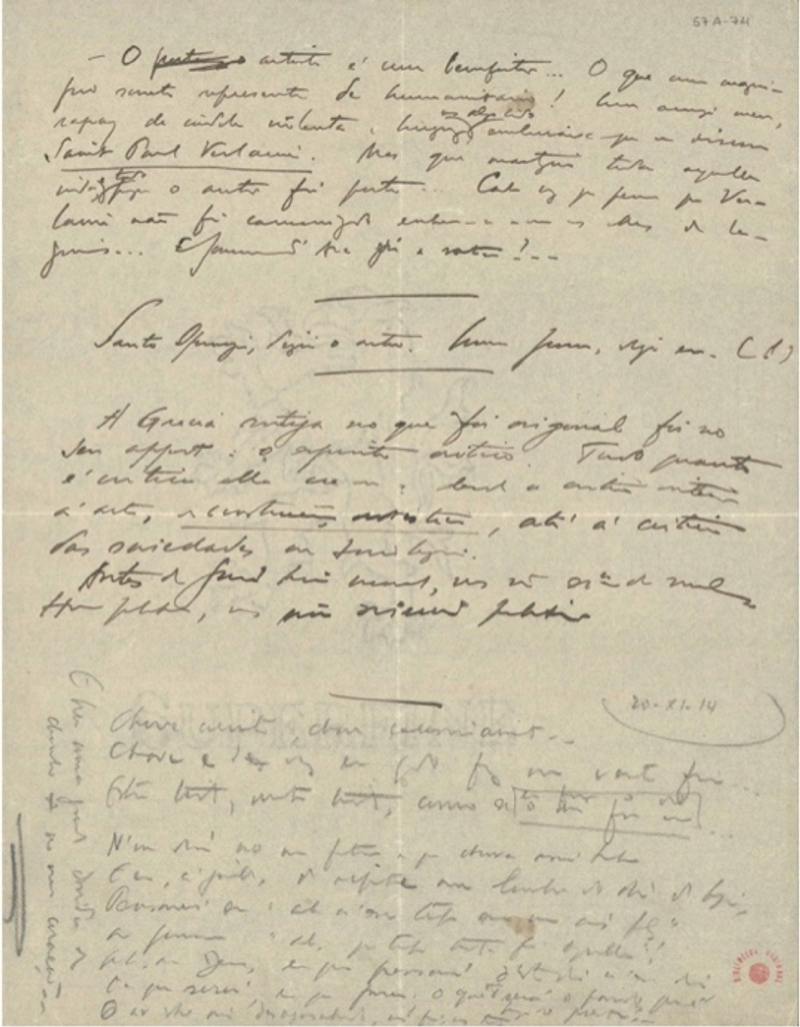
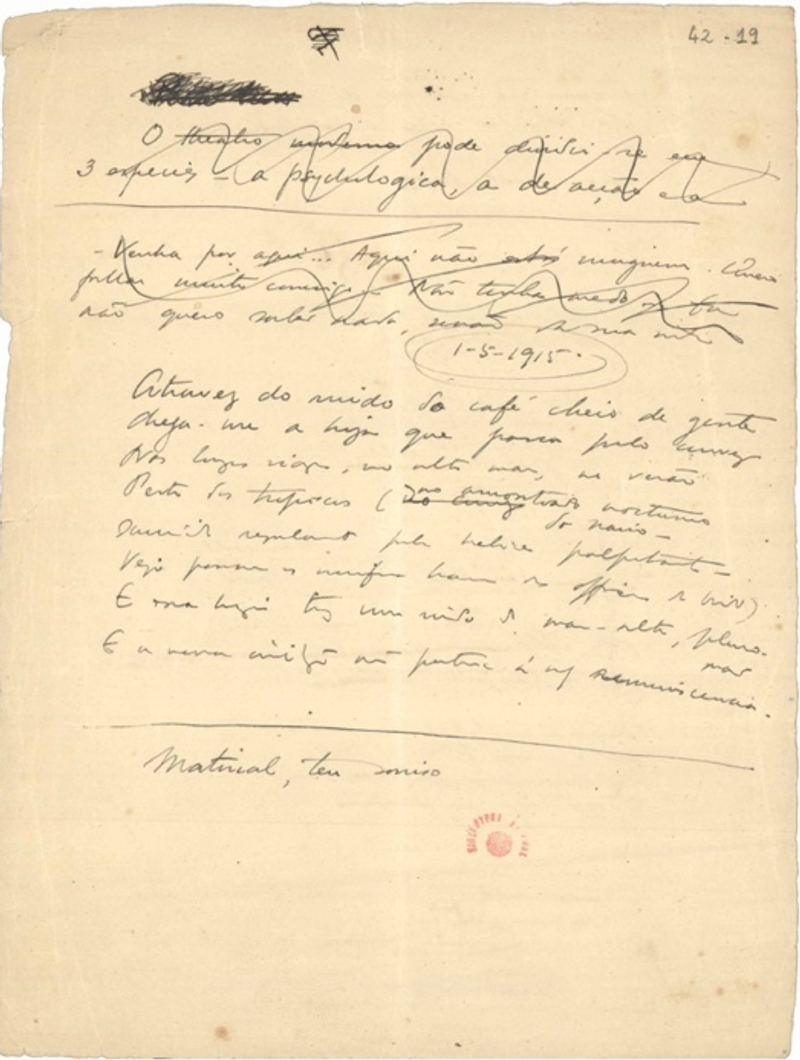
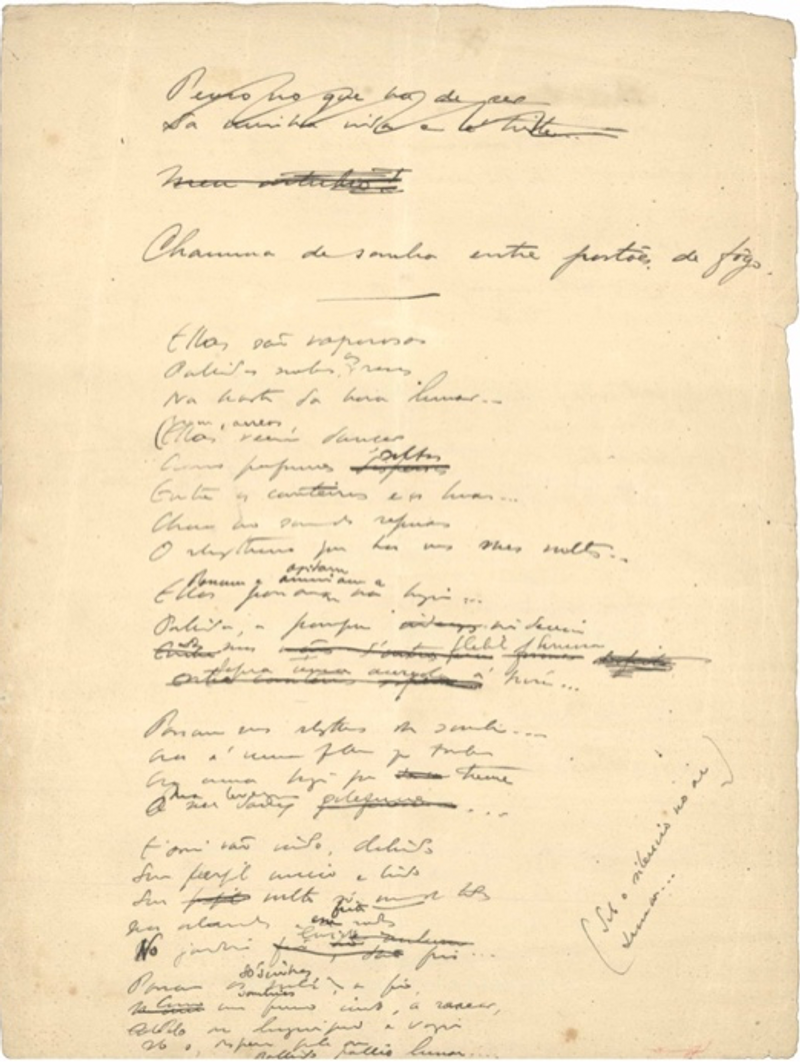
Annex 23 [1-5-1915]
Atravez do ruido do café cheio de gente
[Above the noise of the crowded café
Chega‐me a briza que passa pelo convez
I feel the breeze that blows along the deck
Nas longas viagens, no alto mar, no verão
On long voyages, on the open sea, in summer
Perto dos tropicos (no amontoado nocturno do navio –
Near the tropics (in the ship’s nocturnal huddle ―
Sacudido regularmente pela helice palpitante –
Regularly shaken by the throbbing propeller ―
Vejo passar os uniformes brancos dos oficiaes de bordo).
I see the white uniforms of the ship’s officers pass by).
E essa briza traz um ruido de mar‐alto, pluromar
And this breeze brings the sound of the high sea, the plural-sea
E a nossa civilização não pertence á
And our civilization has no place in
[minha reminiscencia. [my memory.]
Annex 24 [c. 1915]
Meu cerebro photographico... [My photographic brain...
Vaga nausea physica... O caes no longe cheira‐me
Vague physical nausea... The dock in the distance smells
[a aqui perto... [to me of the near-at- hand...
Que tristeza a de partir! What time did the Captain
How sad it is to leave! What time did the Captain
[say we were to leave? [say we were to leave?
[de partir e deixar atraz de nós [To leave and leave behind us
Não só as pedras da cidade, e as casas e
Not only the stones of the city, and the houses and
[a cidade vista de longe [the city seen from afar
Mas oh, Maryjane just come & see that village on
But oh, Maryjane just come & see that village on
[the other side of the river, [the other side of the river,
[it’s just perfect in this brightness [it’s just perfect in this brightness
Tambem as memorias antigas, as caricias maternas
But also those old memories, the motherly caresses
[hoje na sepultura, [now in the grave,
Tudo isso parece que ficou aqui, deixado aqui,
All that seems to have stayed here, to have been left here,
[e nós indo sem levar isso tudo...
[and here we are leaving without taking it all with us...
[Non, Monsieur, c’est de l’autre bord...
[Non, Monsieur, c’est de l'autre bord...
Ó Chico, não te chegues para fora
Oh Chico, don’t lean out
(Right eh!) podes cahir!
(Right eh!) you might fall!
Que lume na lenha da velha lareira provinciana –
The blazing fire in the old provincial fireplace –
[o senhor da‐me licença?...[excuse me, sir?...
[passa uma farda de guarda [the uniform of a customs officer
[fiscal pelo meu hombro – [brushes my shoulder ―
[e dos contos que me contavam [and the tales they used to tell me
[nas noites de inverno [on winter nights
[u��uf‐u‐u‐u‐u‐u... o apito [u-uff-u-u-u-u-u...
[do vapôr...[the steamship whistle...
Et vous aussi, Mark – Sim senhor, para o Rio de Janeiro
Et vous aussi, Mark ― Yes, sir, to Rio de Janeiro
Tenho lá... yes, all the time... Ó pobre pequenino rio
Oh, I have ... yes, all the time... O sad little river
[da minha terra! [of my childhood home!
O ruido da agua – shl, shl, shlbrtsher, shlbrtsher,
The sound of water ― shl, shl, shlbrtsher, shlbrtsher,
[e o meu velho primo, [and my old cousin, [perdido para sempre[lost forever
Quasi que me esqueço de me poder lembrar d’elle
I’ve almost forgotten how to remember him,
[came into the smoking saloon... [came into the smoking saloon ...
[Good evening Mr. Cameron. [Good evening Mr. Cameron.
[Like Lisbon? Oh, yes, but not [Like Lisbon? Oh, yes, but not
[(entram para dentro alguns [(they enter a few days
[dias antes atravez da minha [earlier through
[sensação d’elles no meu hombro [my feeling of them at my back
[que não tem olhos para os ver) [which has no eyes to see them)
u‐u‐u‐u‐u‐u‐u‐u u‐u‐u‐u‐u‐u‐u‐u
u‐u‐u u‐u‐u
u‐u‐u‐u‐u‐u‐u‐ u‐u‐u‐u‐u‐u‐u‐
u‐u‐u‐u‐u‐u‐u‐u‐u u‐u‐u‐u‐u‐u‐u‐u‐u
u‐u‐u‐u‐u‐u‐u‐ u‐u‐u‐u‐u‐u‐u‐
u‐u‐u‐u‐u‐u‐u u‐u‐u‐u‐u‐u‐u
u‐u‐u u‐u‐u
u‐u‐u u‐u‐u
u‐u u‐u
u.fff. (uu uff) u.fff. (uu uff)
f.f. f.f.
(fff.) (fff.)]
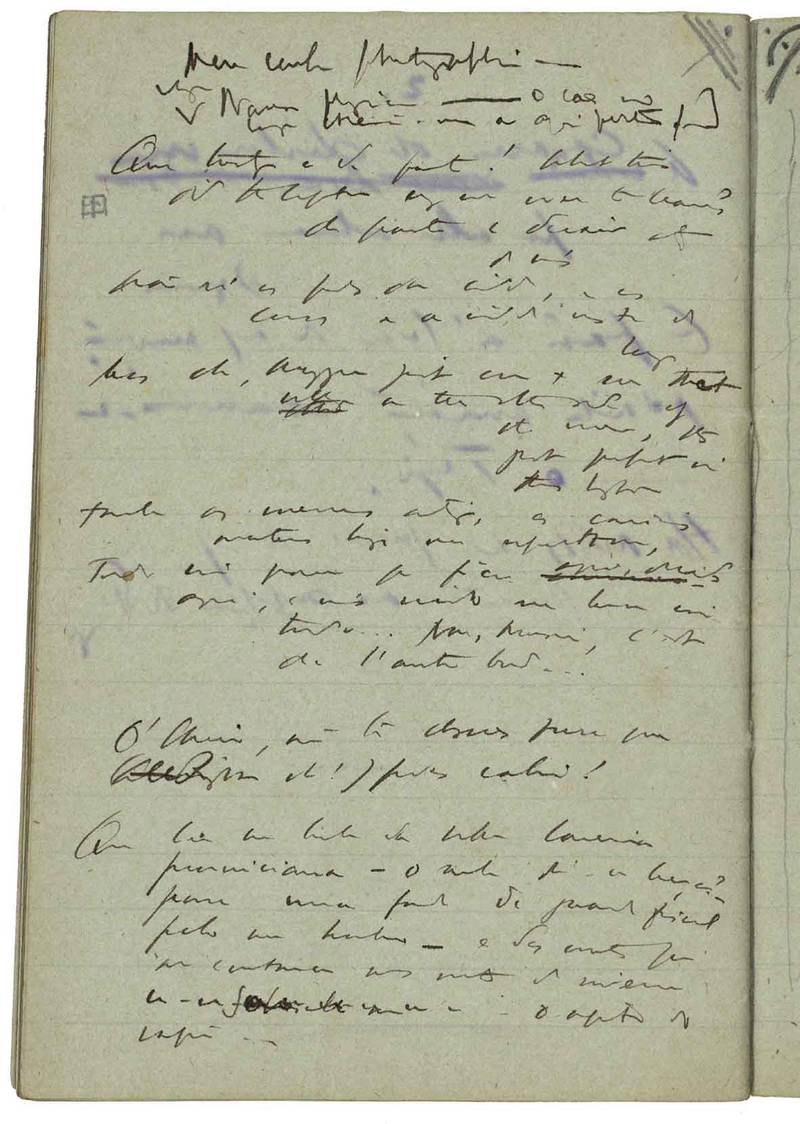
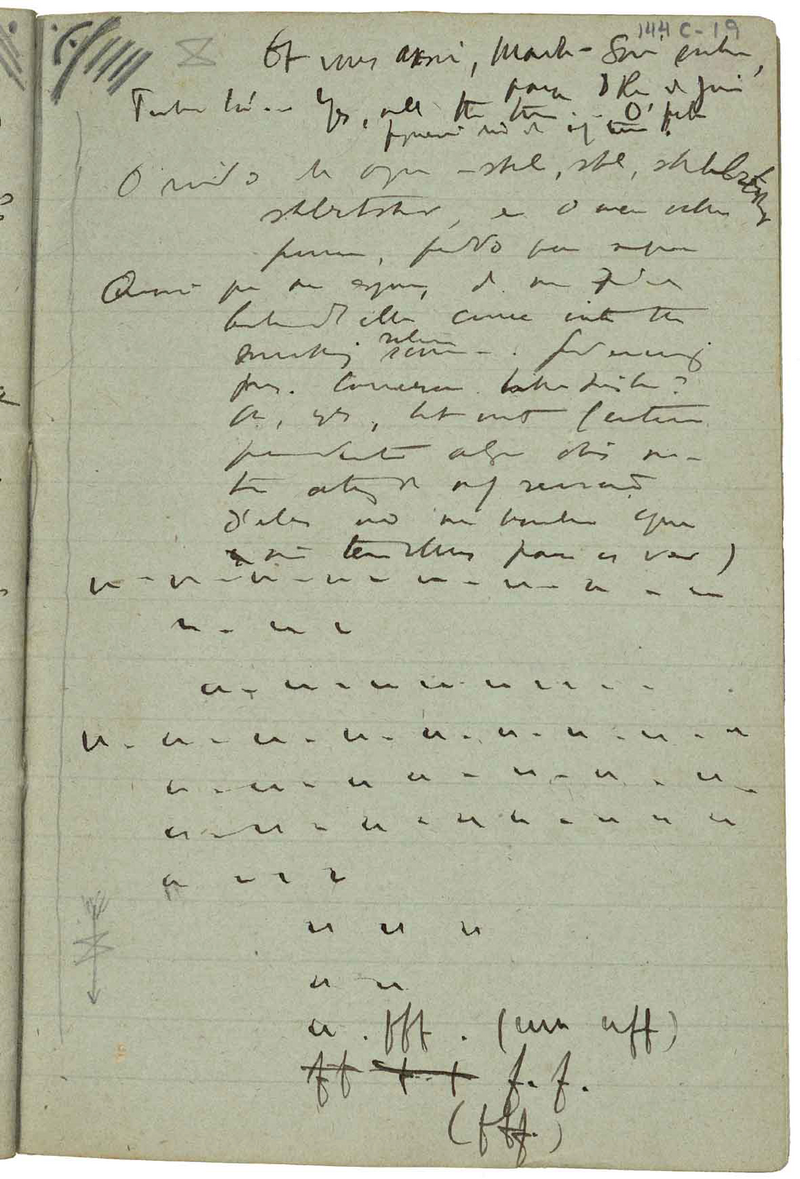
Annex 25 [c. 1916]
Da‐nos a Tua paz, [Give us Your peace,
Deus Christão falso, mas consolador, porque todos
False but comforting Christian God, because we are all
Nascem para a emoção resada a ti;
brought up to want the feeling for which we pray to you;
Deus anti‐scientifico mas que a nossa mãe ensina;
Anti-scientific God who our mother nonetheless teaches us;
Deus absurdo da verdade absurda, mas que tem
Absurd God of absurd truth who, however, contains
[a verdade das lagrimas [the truth of tears
Nas horas de fraqueza em que sentimos
Shed in the hours of weakness when we feel we merely pass
[que passamos[we merely pass
Como o fumo e a nuvem, mas a emoção não o quer,
Like smoke and cloud, a feeling that resists,
Como o rasto na terra, mas a alma é sensivel...
Like a footprint in the earth, but the soul is sensitive...
Da‐nos a Tua paz, ainda que não existisses nunca,
Give us Your peace, even if You never existed,
A Tua paz no mundo que julgas Teu,
Your peace in the world you think is Yours,
A Tua paz impossivel tam possivel á Terra,
Your impossible peace so possible for the Earth,
Á grande mãe pagã, christã em nós a esta hora
To the great pagan mother, who for us now is Christian,
E que deve ser humana em tudo quanto é
And who must be human in all that is
[humano em nós. [human in us.
Da‐nos a paz como uma briza sahindo
Give us peace like a breeze getting up
Ou a chuva para a qual ha preces nas provincias,
Or the rain for which prayers are said in the provinces,
E chove por leis naturaes tranquillizadoramente.
And it rains soothingly according to natural laws.
Da‐nos a paz, qualquer que ella seja, e regresse
Give us peace, whatever it may be, and return
O nosso espirito cançado ao quarto de
Our weary spirit to the room set aside
[arrumações e coser [for junk or for sewing,
Onde ao canto esta o berço inutil, mas não a
Where, in one corner, sits the useless cradle, but not the
[mãe que embala, [mother who does the cradling,
Onde na comoda velha esta a roupa da infancia,
Where, in the old chest of drawers, our childhood clothes
[despida[are tucked away, cast off
Com o poder illudir a vida com o sonho...
Along with the ability to deceive life with a dream.
Da‐nos a tua paz.
Give us your peace.
O mundo é incerto e confuso,
The world is uncertain and confused,
O pensamento não chega a parte nenhuma da Terra,
Thought gets nowhere on Earth,
O braço não alcança mais do que a mão pode conter,
The arm’s reach never exceeds its grasp,
O olhar não atravessa os muros da sombra,
The eye cannot pierce the wall of shadows,
O coração não sabe desejar o que deseja
The heart doesn’t know how to desire what it desires,
A vida erra constantemente o caminho da Vida.
Life is constantly straying from the path of Life.
Da-nos, Senhor, a paz, Christo ou Buddha que sejas,
Give us peace, O Lord, be you Christ or Buddha,
Da‐nos a paz e admite ignotos
Give us peace and allow it to enter
Nos valles esquecidos dos pastores
The forgotten valleys of unknown shepherds
Nos pincaros de gelo dos eremitas perdidos,
The steep, icy abodes of lost hermits,
Nas ruas transversaes dos bairros affastados
The side streets of remote
[das cidades, [city suburbs,
A paz que é dos que não conhecem e esquecem
The peace of those who know nothing of peace and
[sem querer. [unwittingly forget.
Materna paz que adormeça a terra,
The motherly peace that lulls the earth to sleep,
Dormente á lareira sem philosophias,
Drowsing beside the unphilosophical fireplace,
Memoria dos contos de fadas sem a vida lá fóra,
The memory of fairy tales untouched by life outside,
A canção do berço volvida atravez do menino
The lullaby that returns through that
[sem futuro, [futureless child,
O calôr, a ama, o menino,
The warmth, the nanny, the little boy,
O menino que se vae deitar
The little boy going off to bed
E o sentido inutil da vida,
And the futility of life,
O coveiro antigo das cousas,
The ancient gravedigger of things,
A dôr sem fundo da terra, dos homens, dos deuses
The bottomless sorrow of the earth, of men, of gods
Do mundo... Of the world...]
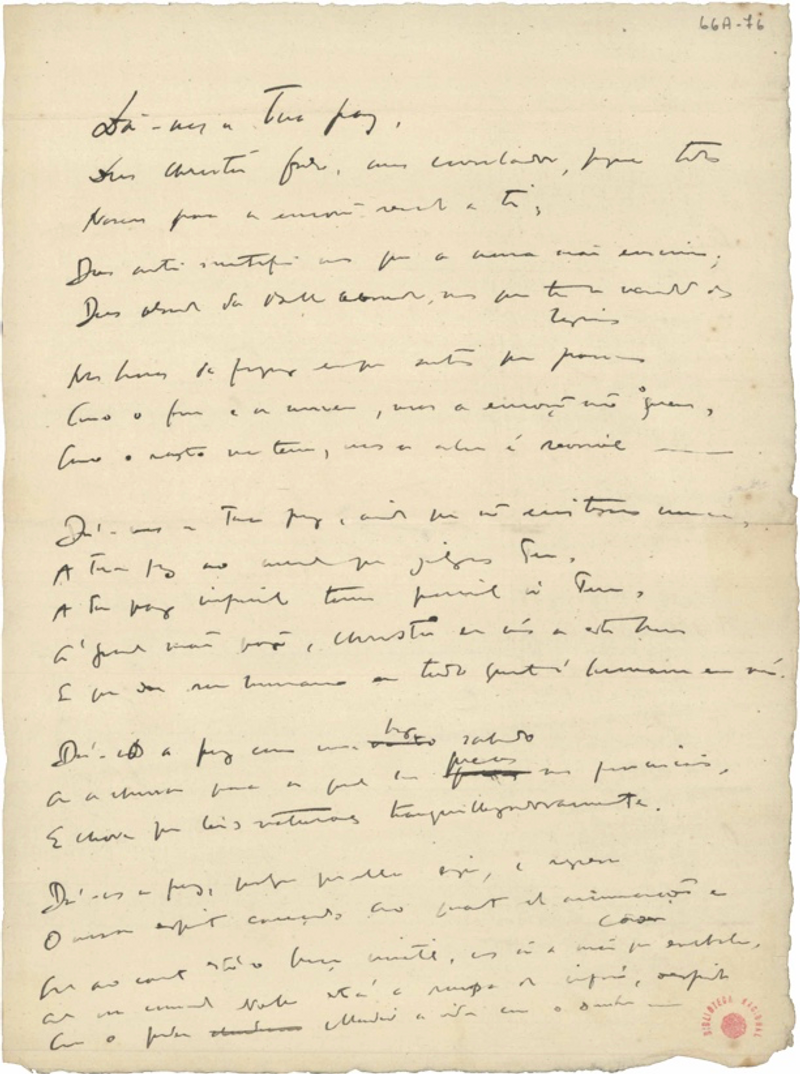
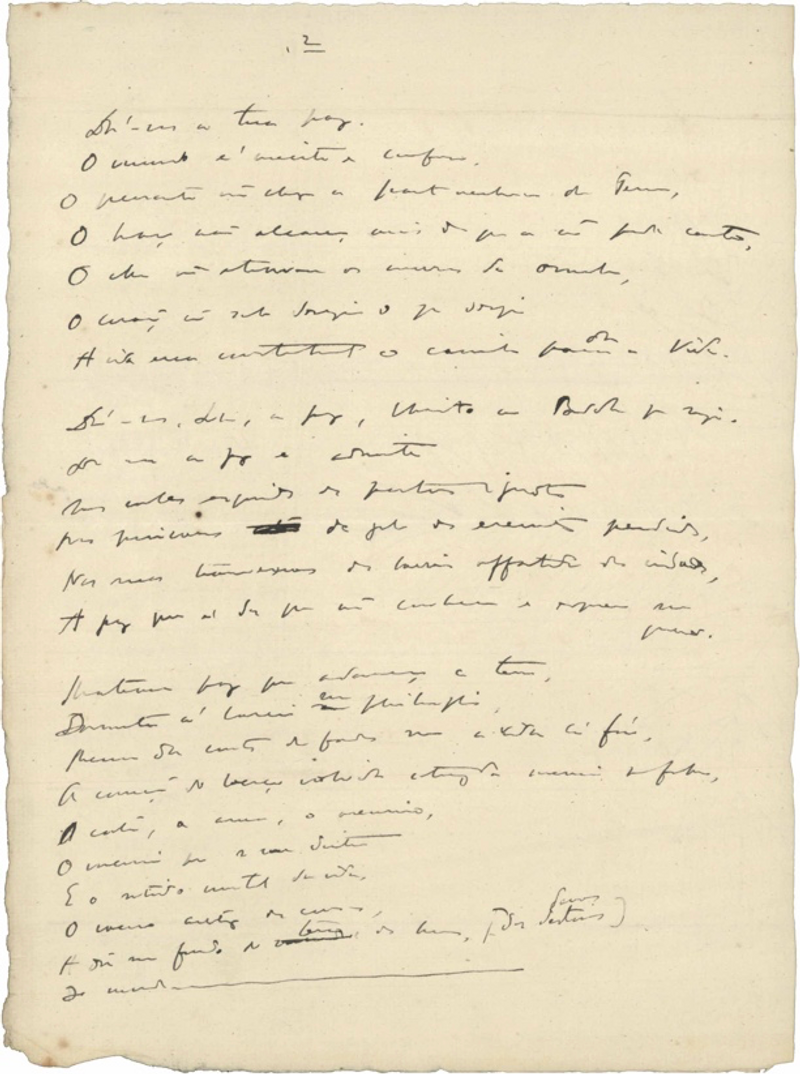
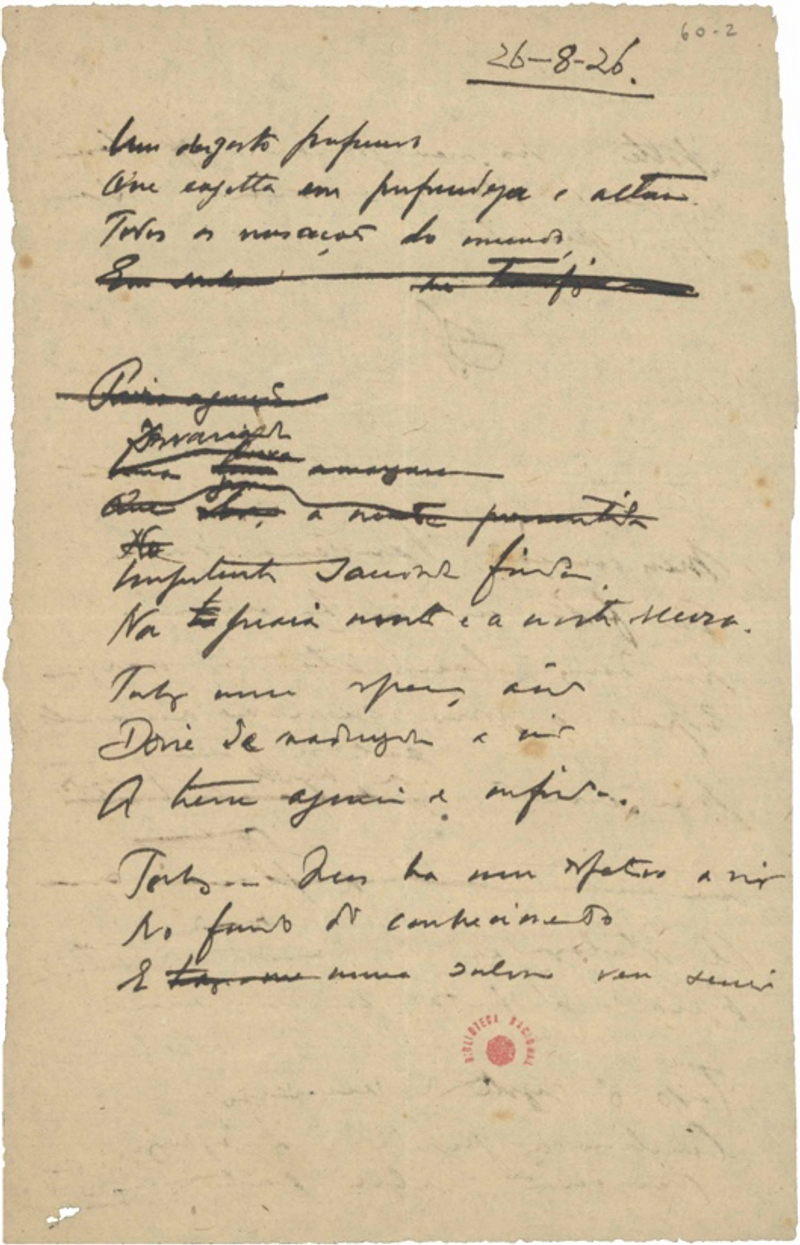
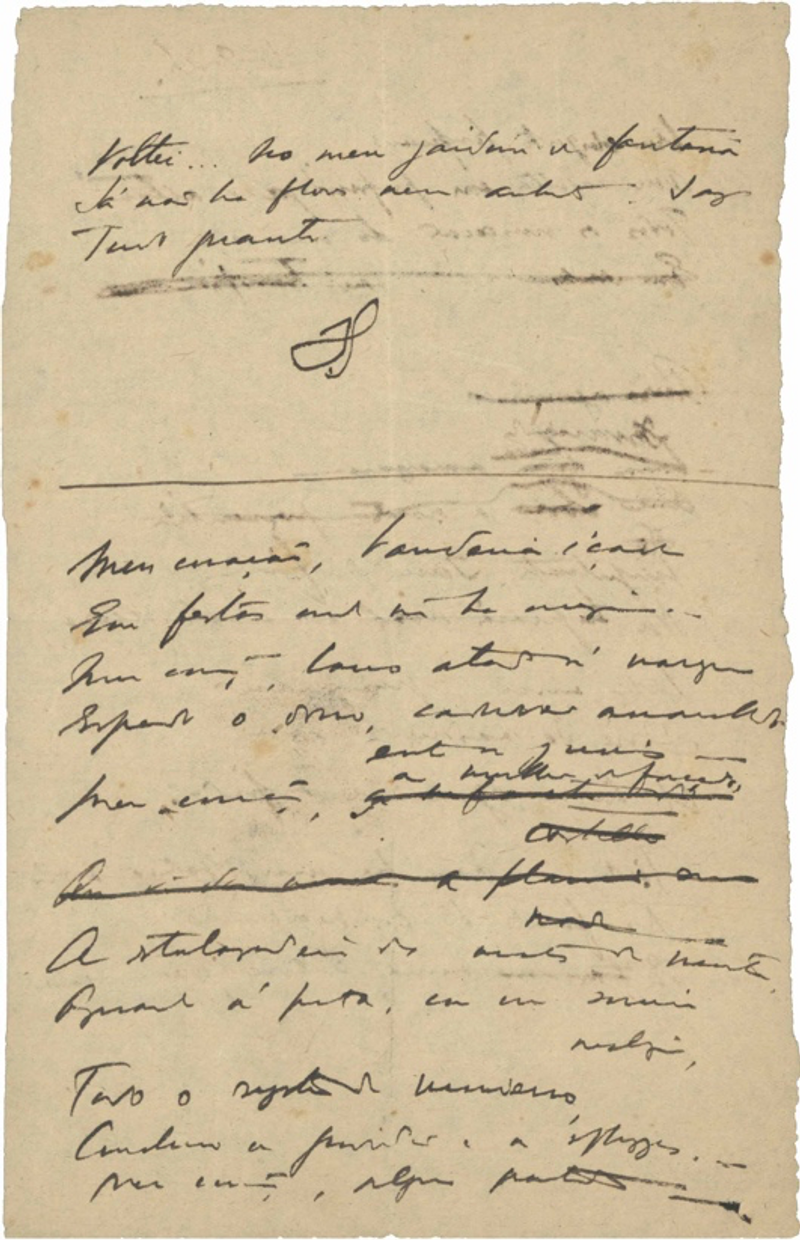
Annex 26 [c. 26-8-1926]
Meu coração, bandeira içada [My heart, a flag raised
Em festas onde não ha ninguem...
At celebrations no one goes to...
Meu coração, barco atado á margem
My heart, a boat moored to the bank
Esperando o dono, cadaver amarellado
Waiting for the owner, a yellowing corpse
[entre os juncaes... [among the reeds...
Meu coração, a mulher do forçado,
My heart, the prisoner’s wife,
A estalajadeira dos mortos da noite,
The innkeeper of the night’s dead,
Aguarda á porta, com um sorriso maligno,
Waits at the door wearing an evil smirk,
Todo o systema do universo,
The whole system of the universe,
Concluso a podridão e a esphynges...
Once there’s no more rot, no more sphinxes...
Meu coração, algema partida...
My heart, a broken handcuff...]
Annex 27 [c. 26-8-1926]
“The Times” [“The Times”
Sentou‐se bebado á mesa e escreveu um fundo
He sat at the table, drunk, and wrote a column,
Do “Times”, claro, inclassificavel, lido...,
For “The Times,” of course, unclassifiable, to be read...,
Suppondo (coitado!) que ia ter influencia
Believing (poor fellow!) that he was going to have
[no mundo...[influence in the world...
.................................................................................... ....................................................................................
Santo Deus!... E talvez a tenha tido!
Good God!... And maybe he did!]
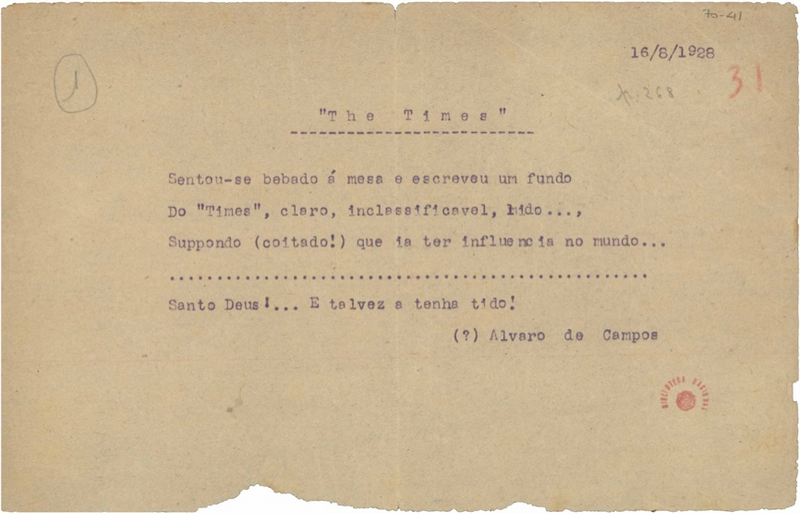
Annex 28 [c. 1-12-1928]
Canção abrupta Abrupt Song
O céu de todos os invernos [The sky of all the winters
Cobre em meu ser todo o verão...
Covers all the summer inside me...
Vae p’ra as profundas dos infernos
Go down to the deepest depths of hell
E deixa em paz meu coração!
And leave my heart in peace!
Quê? Não me fica se te oppões?
What? It won’t stay if you object?
Pois leva‐o, guarda‐o, bem ou mal
Well, take it, keep it, good or bad
Eu tenho muitos corações
I have many other hearts,
É um privilegio intellectual.
The privilege of the intellectual.
Madonna que vaes comprar couves
Madonna going off to buy cabbages
Não te esqueças de me esquecer
Don’t forget to forget me
O teu perfil da‐me trabalho
Your profile demands my attention
Quero [...] And I want (...)
Mas does – o teu perfil persiste –
But you feel pain ― your profile persists –
Penso‐te e é triste não poder
I think of you and feel sad not to be able
Deixar de ver‐te sem estar triste...
To stop seeing you without feeling sad...
Se és mulher que em verdade existe
If you are a woman who really does exist,
Raios te parta! Vae morrer!
Damn you! Go away and die!]
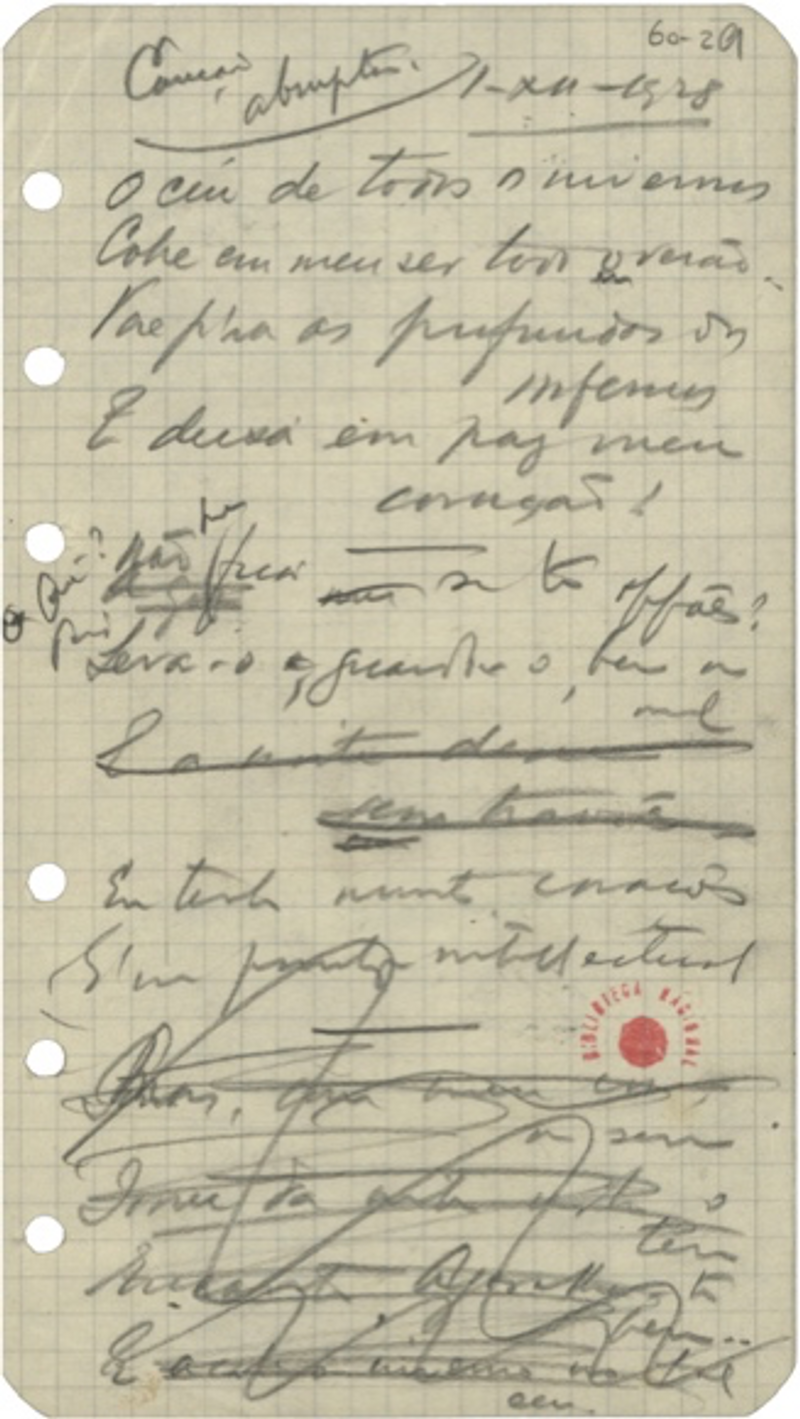
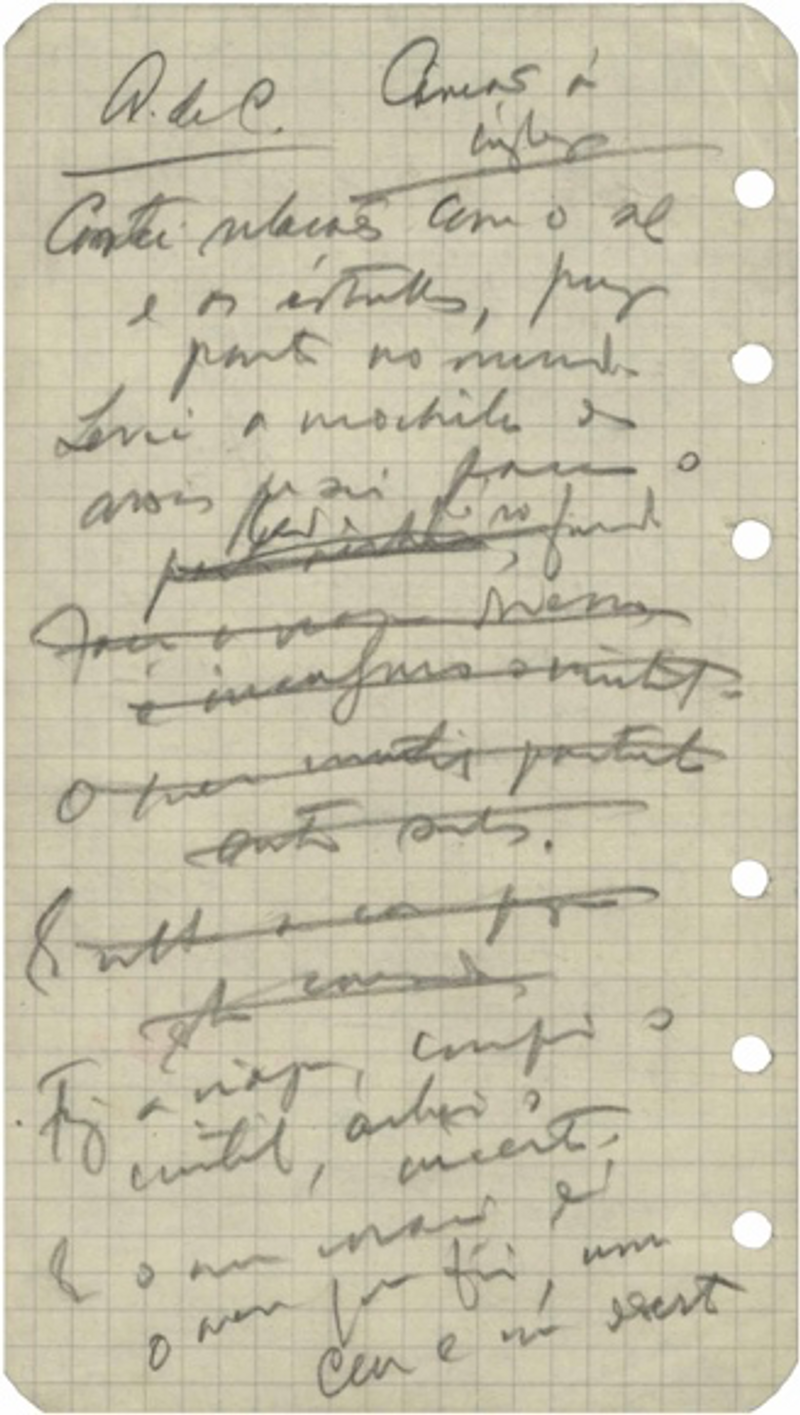
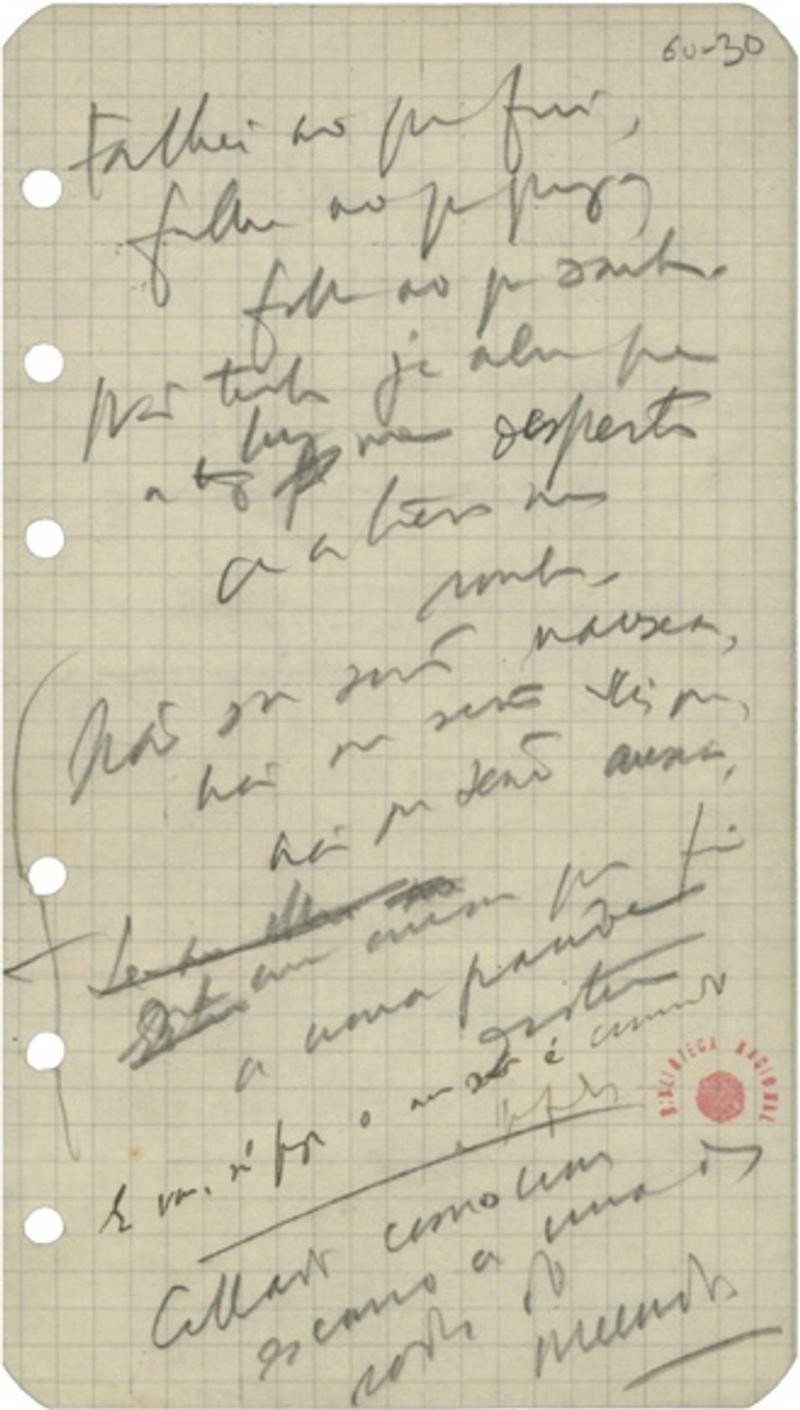
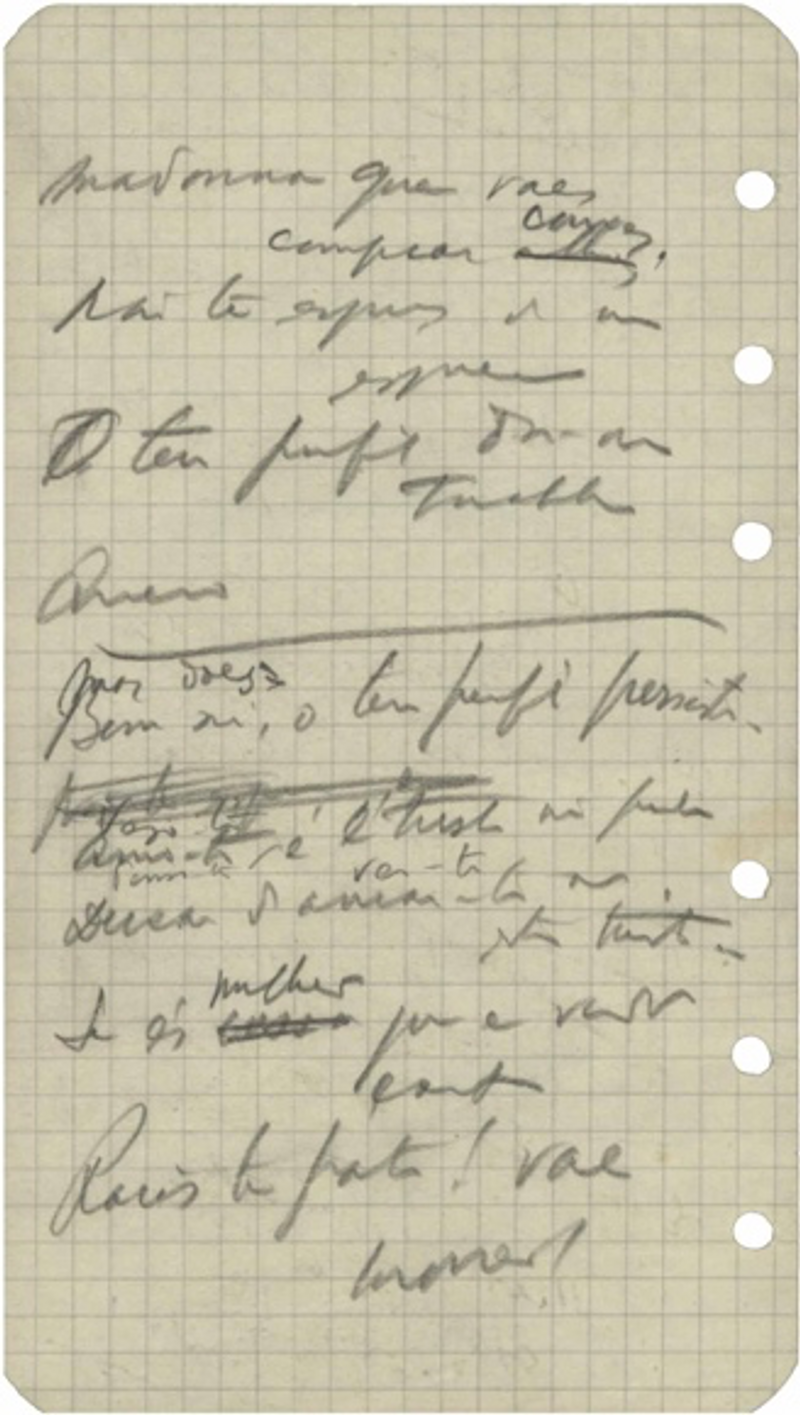
Annex 29 [c. Jan. 1929]
Esse é um genio, é o que é novo, é [...] [That one is a genius, the young one, the (...)
Outro é um deus, e as creanças do mundo
The other is a god, and the children of the world
[lhe cospem na cara. [spit in his face.
Queria ser uma pedra, não aspiro a mais, quero
I would like to be a stone, I have no higher aspirations, I want
Ser uma coisa que não possa ter vergonha
To be something that can feel neither shame
[nem desespero,[nor despair,
Fui rei nos meus sonhos, mas nem sonhos houve,
In my dreams I was a king, but there were no dreams,
[além de mim, [apart from me,
E a ultima palavra que vou escrever nos livros
And the last words I’m going to write in the books
[é a palavra Fim. [are the words The End.]
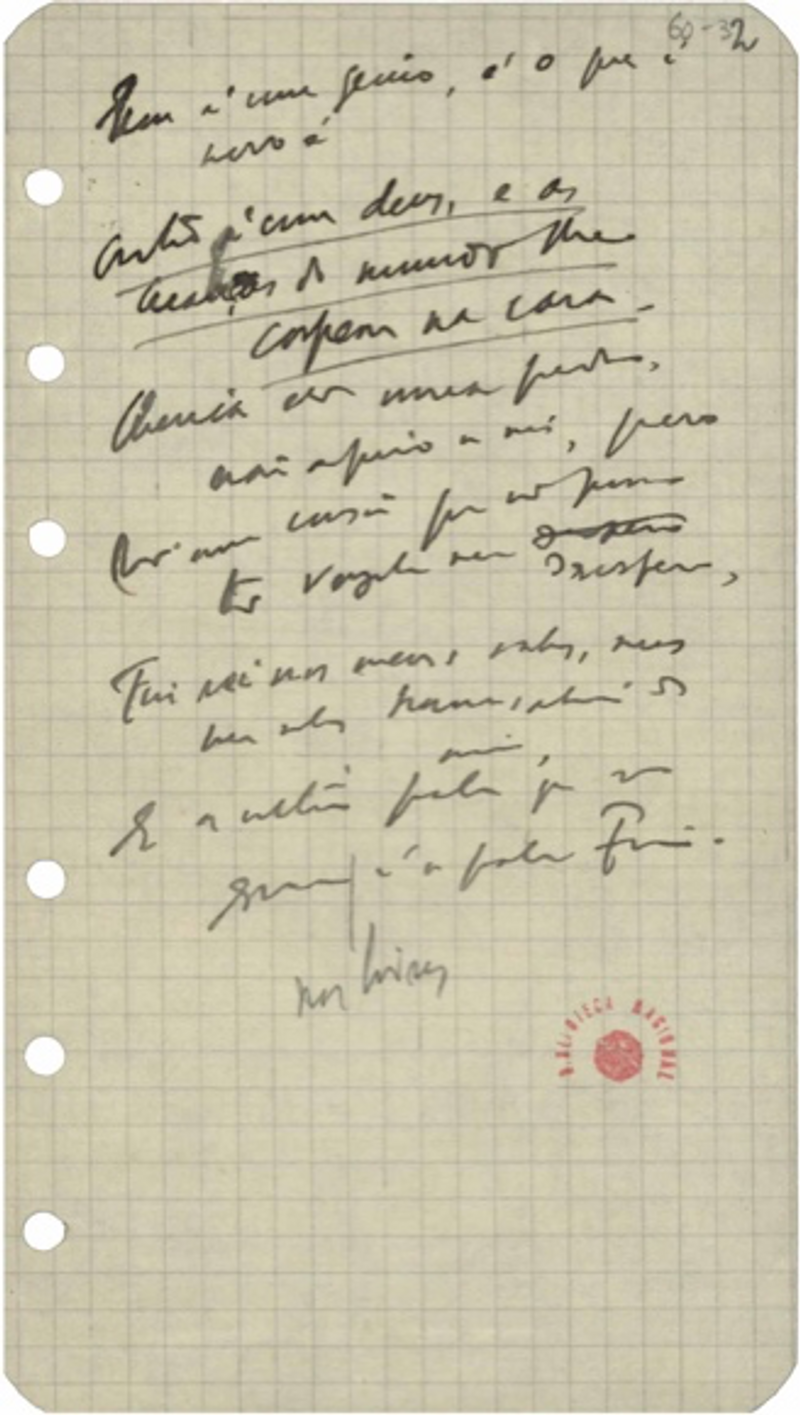
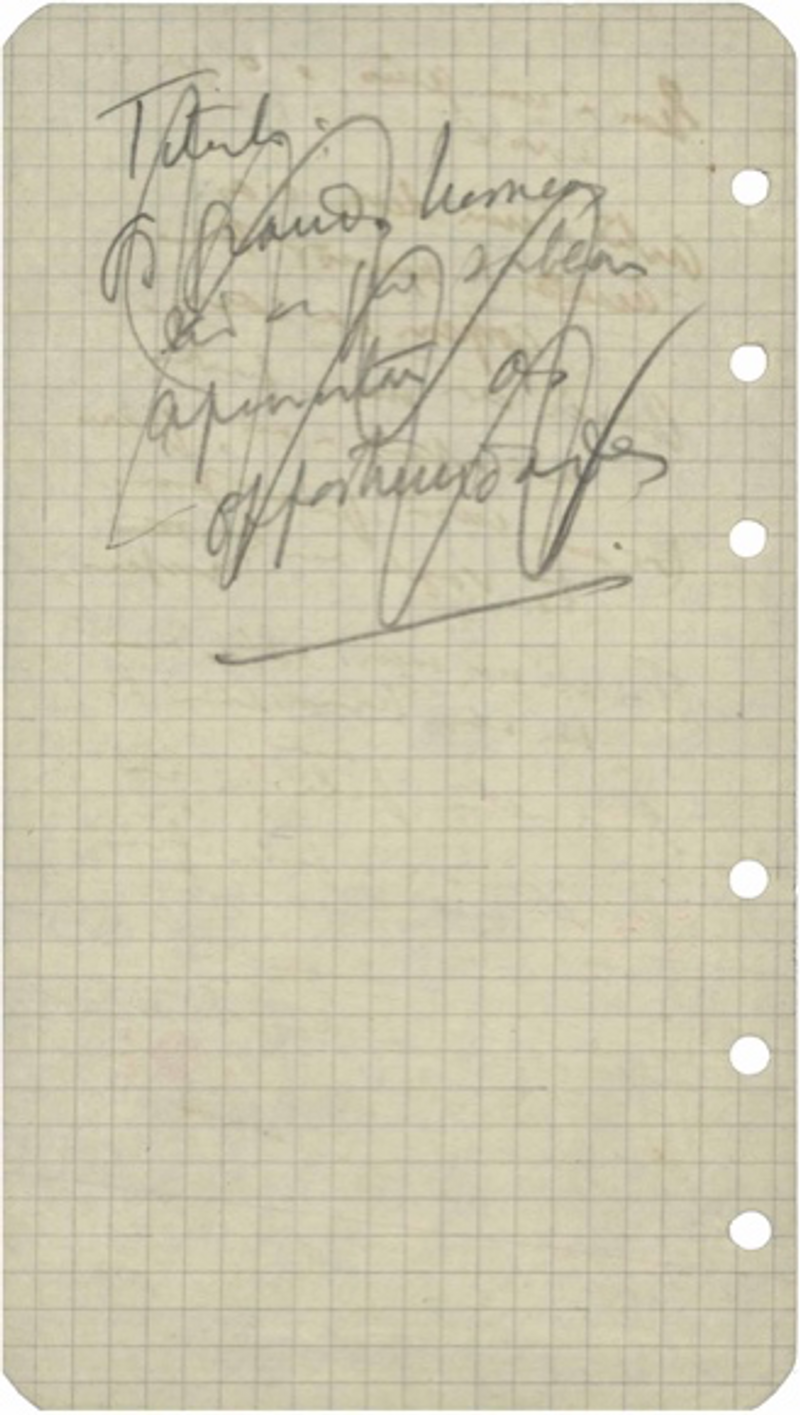
Annex 30 [16-8-1929]
Ah, no terrivel silencio do quarto [Ah, in the terrible silence of my room
O relogio com o seu som de silencio!
The clock with its sound of silence!
Monotonia! Monotony!
Quem me dará outra vez a minha infancia perdida?
Who will give me back my lost childhood?
Quem m’a encontrará no meio da estrada de Deus –
Who will find it for me in the middle of God’s road ―
Perdida definitivamente, como um lenço no comboio.
Definitively lost, like a handkerchief on the train.]
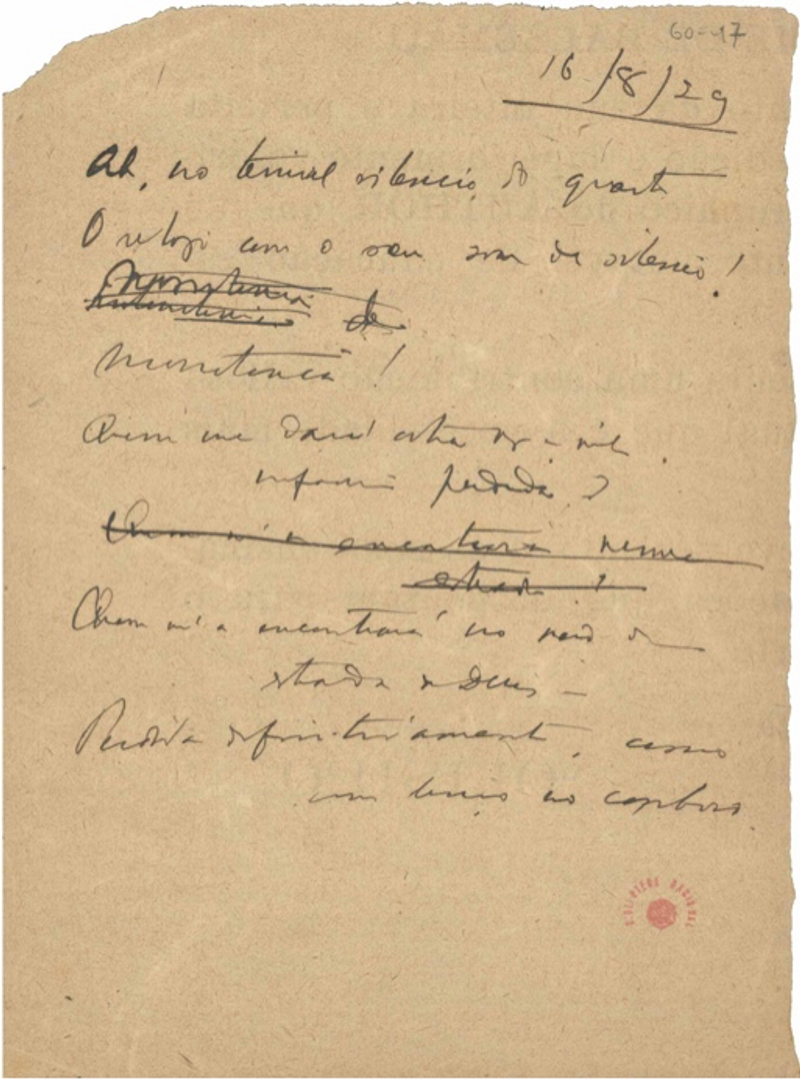
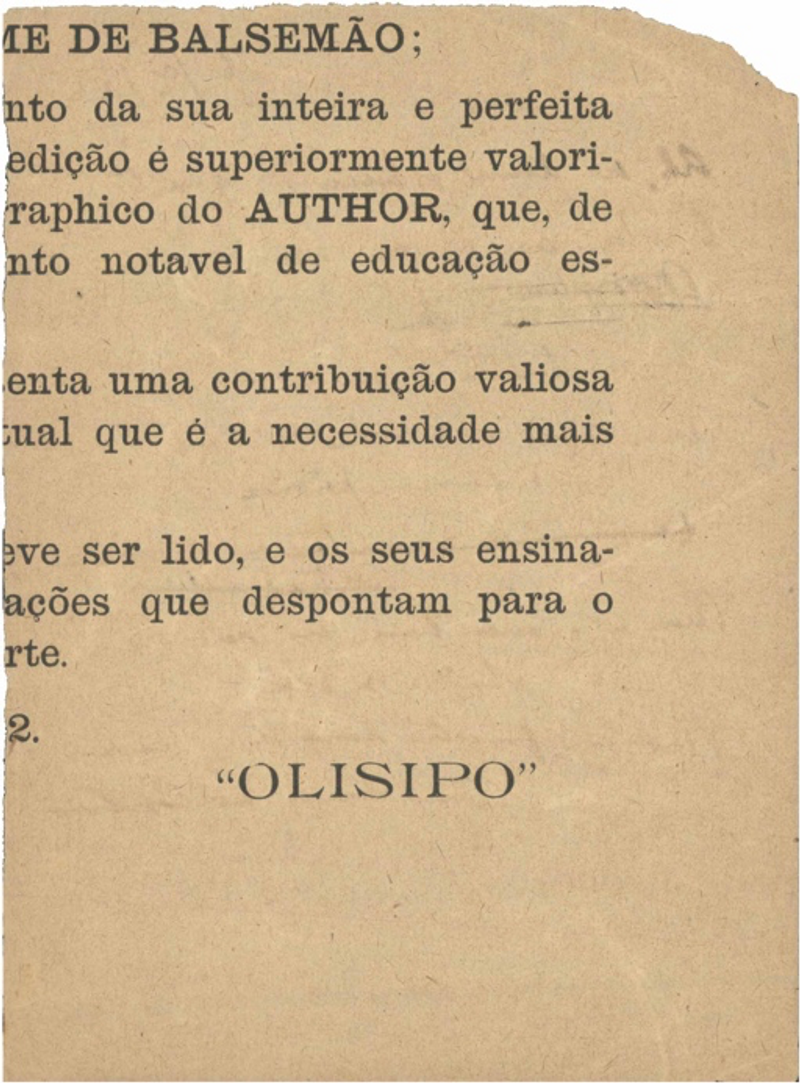
Annex 31 [c. 1929]
Accordar da cidade de Lisboa, mais tarde do que [Lisbon waking up, later than
[as outras, [other cities,
Accordar da rua do Ouro,
Rua do Ouro waking up,
Accordar do Rocio, ás portas dos cafés,
The Rocio waking up, at the doors of the cafés,
Accordar Waking up
E no meio de tudo a gare, a gare
And in the midst of it all, the train station, the station
[que nunca dorme, [that never sleeps,
Como um coração que tem que pulsar atravez
Like a heart that has to keep beating through
[da vigilia e do somno. [waking and sleeping.
Toda a manhã que raia, raia sempre no mesmo logar,
Every morning that breaks always breaks in the same place,
Não ha manhãs sobre cidades, ou manhãs sobre
There are no mornings in cities, or mornings in
[o campo.[the countryside.
Á hora em que o dia raia, em que a luz estremece
At the hour when the day dawns, when the light trembles
[a erguer‐se [as it rises
Todos os logares são o mesmo logar, todas as terras
Every place is the same place, every village
[são a mesma, [is the same,
E é eterna e de todos os logares a frescura que sobe
And the freshness that fills everything is eternal and
[por tudo [from everywhere
E [...] And (...)
Uma espiritualidade feita com a nossa propria carne,
A spirituality made of our own flesh,
Um allivio de viver de que o nosso corpo partilha,
A relief to be alive that our body shares,
Um enthusiasmo por o dia que vai vir, uma alegria
A zest for the day about to arrive, a feeling of joy
[por o que pode acontecer de bom, [for whatever good things might happen,
São os sentimentos que nascem de estar olhando
These are the feelings born out of watching
[para a madrugada,[the day dawning,
Seja ella a leve senhora dos cumes dos montes,
Whether she be the light lady of the mountain tops,
Seja ella a invasora lenta das ruas das cidades que
Or the slow invader of those east-west-facing
[vão leste‐oeste, [city streets,
Seja [...] Or (...)]
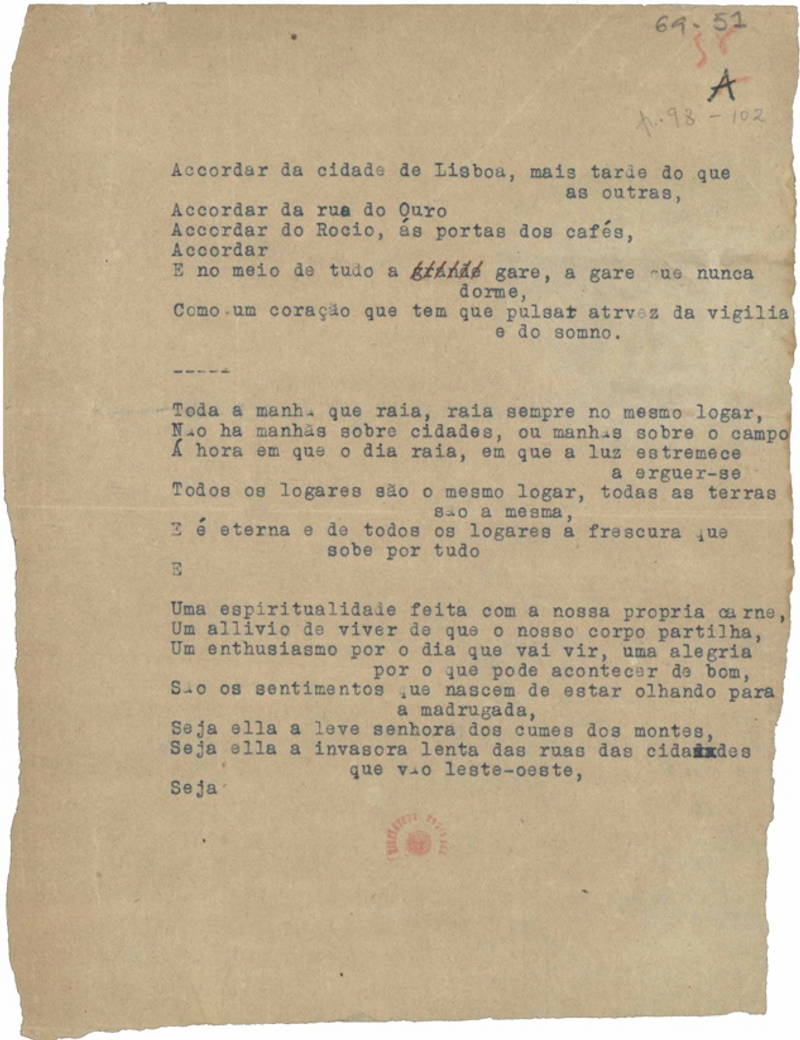
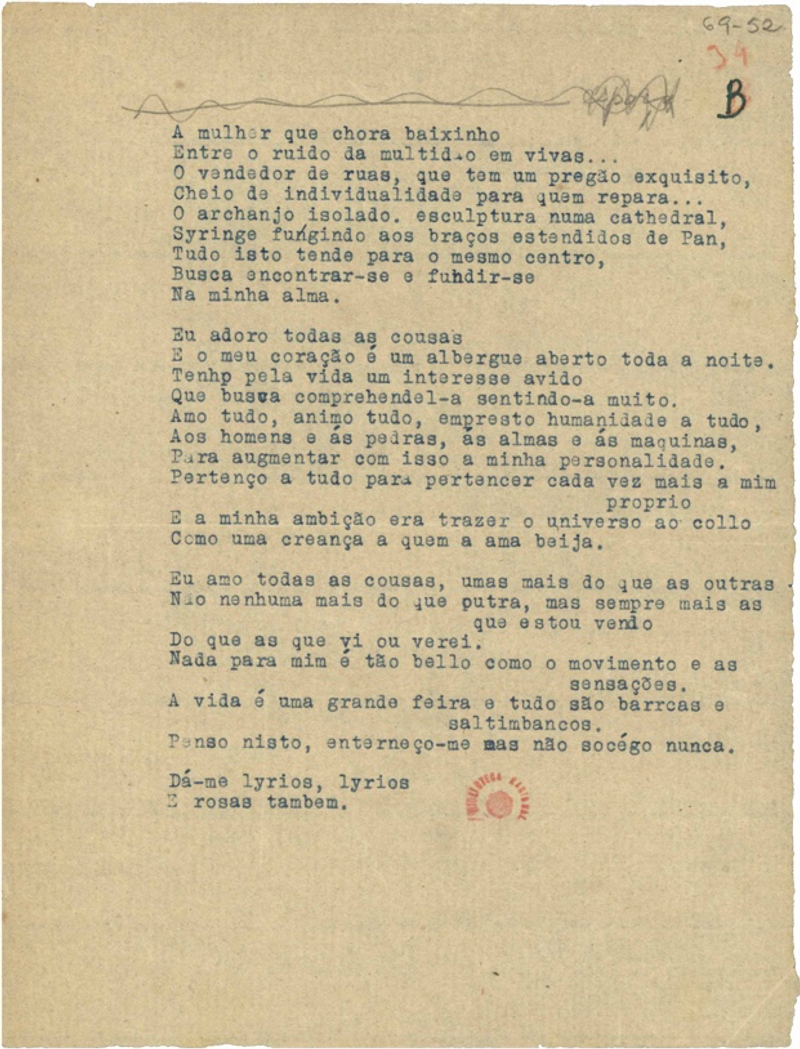
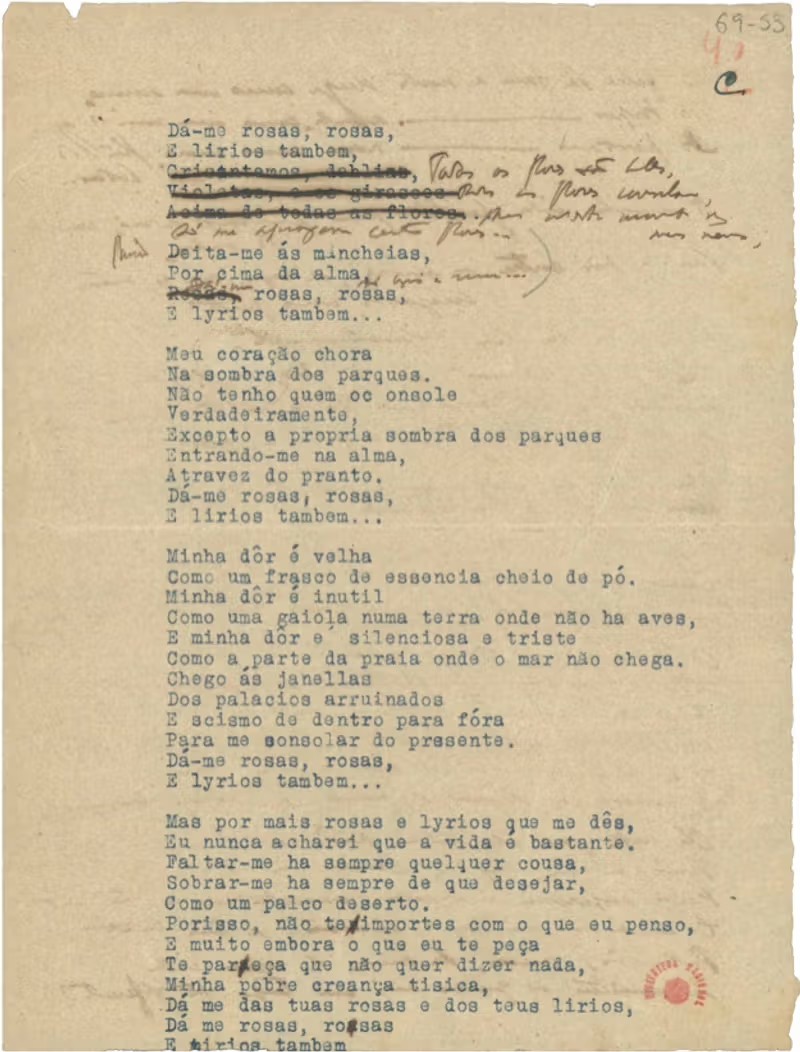
Annex 32 [c. 1929]
[I]
Dá‐me rosas, rosas, [Give me roses, roses,
E lirios tambem,
And lilies too,
Todas as flores são bellas,
All flowers are beautiful,
Todas as flores consolam,
All flowers are consoling,
Mas neste momento dos meus nervos,
But given the current state of my nerves,
Só me aprazem certas flores...
I only like certain flowers...
Porisso deita‐me ás mancheias,
So throw whole handfuls of them
Por cima da alma,
Over my soul,
Só lyrios e rosas...
But only lilies and roses...
Dá‐me rosas, rosas,
Give me roses, roses,
E lyrios tambem...
And lilies too...
Meu coração chora
My heart weeps
Na sombra dos parques.
In the shade of the parks.
Não tenho quem o console
I have no one who could console it,
Verdadeiramente,
Not really,
Excepto a propria sombra dos parques
Only the shade in the parks
Entrando‐me na alma,
That enters my soul
Atravez do pranto.
Through my tears.
Dá‐me rosas, rosas,
Give me roses, roses,
E lirios tambem...
And lilies too...
Minha dôr é velha
My sorrow is old
Como um frasco de essencia cheio de pó.
Like a dusty perfume bottle.
Minha dôr é inutil
My sorrow is as useless
Como uma gaiola numa terra onde não ha aves,
As a birdcage in a land where there are no birds,
E minha dôr é silenciosa e triste
And my sorrow is silent and sad
Como a parte da praia onde o mar não chega.
Like the part of the beach that the sea does not reach.
Chego ás janelas
I go over to the windows
Dos palacios arruinados
Of ruined palaces
E scismo de dentro para fóra
And send my ponderings out into the world
Para me consolar do presente.
To console myself for the present
Dá‐me rosas, rosas, Give me roses, roses,
E lyrios tambem... And lilies too...
Mas por mais rosas e lyrios que me dês,
But no matter how many roses and lilies you give me,
Eu nunca acharei que a vida é bastante.
I’ll never find that life is enough.
Faltar‐me ha sempre qualquer cousa,
I will always lack for something,
Sobrar‐me ha sempre de que desejar,
There will always be something I want and don’t have,
Como um palco deserto.
Like a deserted stage.
Porisso, não te importes com o que eu penso,
So, don’t worry about what I think,
E muito embora o que eu te peça
Especially if what I ask you
Te pareça que não quer dizer nada,
Seems to mean nothing at all,
Minha pobre creança tisica,
My poor, consumptive child,
Dá‐me das tuas rosas e dos teus lirios,
Give me your roses and your lilies,
Dá‐me rosas, rosas,
Give me roses, roses,
E lirios tambem... And lilies too...
[II]
A mulher que chora baixinho [The woman weeping softly
Entre o ruido da multidão em vivas...
Amidst the roar of the cheering crowd...
O vendedor de ruas, que tem um pregão exquisito,
The street vendor, who has an unusual cry
Cheio de individualidade para quem repara...
Full of individuality for those who notice...
O archanjo isolado, esculptura numa cathedral,
The lone archangel, a sculpture in a cathedral,
Syringe fugindo aos braços estendidos de Pan,
Syrinx fleeing the outstretched arms of Pan,
Tudo isto tende para o mesmo centro,
All this tends towards the same center,
Busca encontrar‐se e fundir‐se
Seeks to meet and merge
Na minha alma. In my soul.
Eu adoro as cousas
I love things
E o meu coração é um albergue aberto toda a noite.
And my heart is an inn open all night.
Tenho pela vida um interesse avido
I have a keen interest in life
Que busca comprehendel‐a sentindo‐a muito.
One that seeks to understand it by feeling it intensely.
Amo tudo, animo tudo, empresto
I love everything, I breathe life into everything, I lend
[humanidade a tudo,[humanity to everything,
Aos homens e ás pedras, ás almas e ás maquinas,
To men and stones, to souls and machines,
Para augmentar com isso a minha personalidade.
In order to enlarge my own personality.
Pertenço a tudo para pertencer cada vez mais
I belong to everything so as to belong more and more to
[a mim proprio [myself
E a minha ambição era trazer o universo
And my ambition would be to hold the universe
[ao collo[in my arms
Como uma creança a quem a ama beija.
Like a child receiving a kiss from his nanny.
Eu amo todas as cousas, umas mais do que
I love all things, some more than
[as outras,[others,
Não nenhuma mais do que outra, mas sempre
Not one more than the other, but I always love those
[mais as que estou vendo [I am seeing now
Do que as que vi ou verei.
More than those I have seen or will see.
Nada para mim é tão bello como o movimento
To me nothing is as beautiful as movement
[e as sensações. [and sensations.
A vida é uma grande feira e tudo são barracas
Life is one big fairground and all the things in it are stalls
[e saltimbancos. [and acrobats.
Penso nisto, enterneço‐me mas não socégo nunca.
I think this and feel moved, but I am never at rest.
Dá‐me lyrios, lyrios
Give me lilies, lilies
E rosas tambem. And roses too.]
Annex 33 [14-10-1930]
Cruz na porta da tabacaria! [A cross on the door of the tobacconist’s shop!
Quem morreu? O proprio Alves? Dou
Who’s died? Alves? So much for
Ao diabo o bem-star que trazia.
That sense of wellbeing I had.
Desde hontem a cidade mudou.
The city is quite changed since yesterday.
Quem era? Ora, era quem eu via.
Who was he? Well, he was the person I saw,
Todos os dias o via. Estou
Saw every day. Now, I’m bereft
Agora sem essa monotonia.
Of that monotony.
Desde hontem a cidade mudou.
The city is quite changed since yesterday.
Elle era o dono da tabacaria.
He was the owner of the tobacconist’s.
Um ponto de referencia de quem sou.
A reference point for the person I am.
Eu passava alli de noite e de dia.
I would walk past there at night or during the day.
Desde hontem a cidade mudou.
The city is quite changed since yesterday.
Meu coração tem pouca alegria,
I have so little joy in my heart.
Vejo que a morte está onde estou.
I see that death is wherever I am.
Taipaes jazigo – tabacaria!
Wall up that tomb-cum-tobacconist’s!
Desde hontem a cidade mudou.
The city is quite changed since yesterday.
Mas ao menos a elle, alguem o via,
At least in his case, he could be seen by others,
Elle era fixo. Eu, porque vou,
A permanent fixture, while I, a mere passer-by,
Não falto; por mim ninguem diria.
Will not be missed; no one will say of me
Desde hontem a cidade mudou.
The city is quite changed since yesterday.]
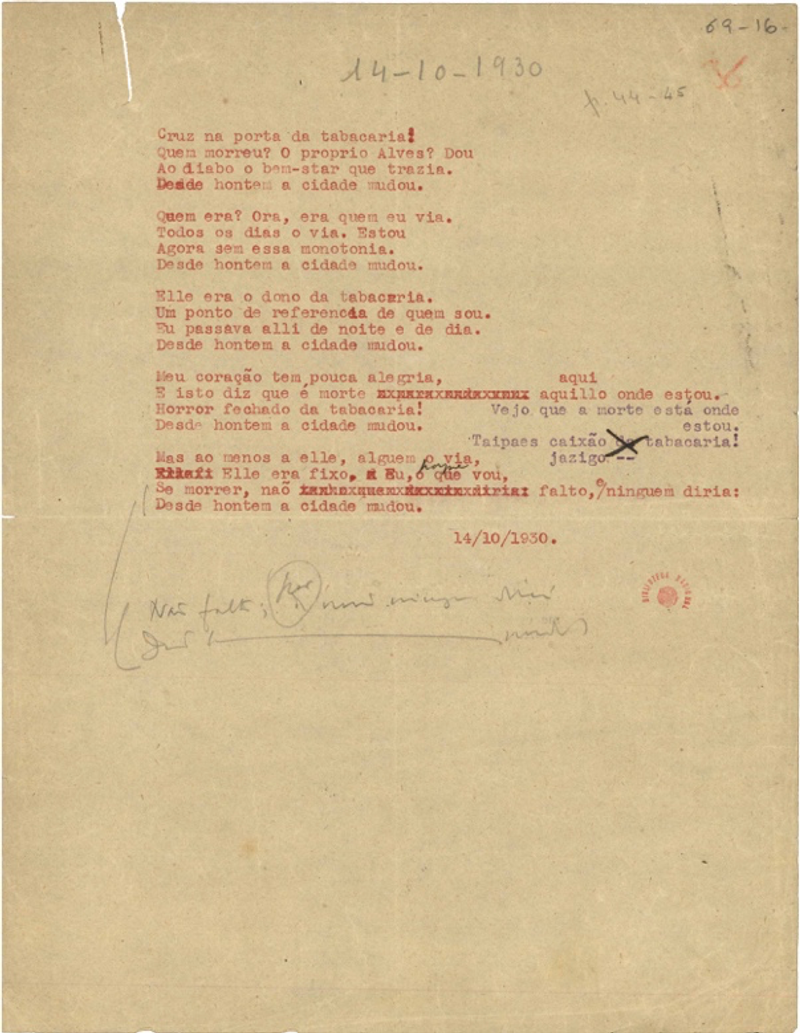
Annex 34 [c. 1930]
Estou vazio como um poço secco. [I am empty as a dry well.
Não tenho verdadeiramente realidade nenhuma.
I truly have no reality at all.
Tampa no esforço imaginativo! A lid on all imaginative effort!]
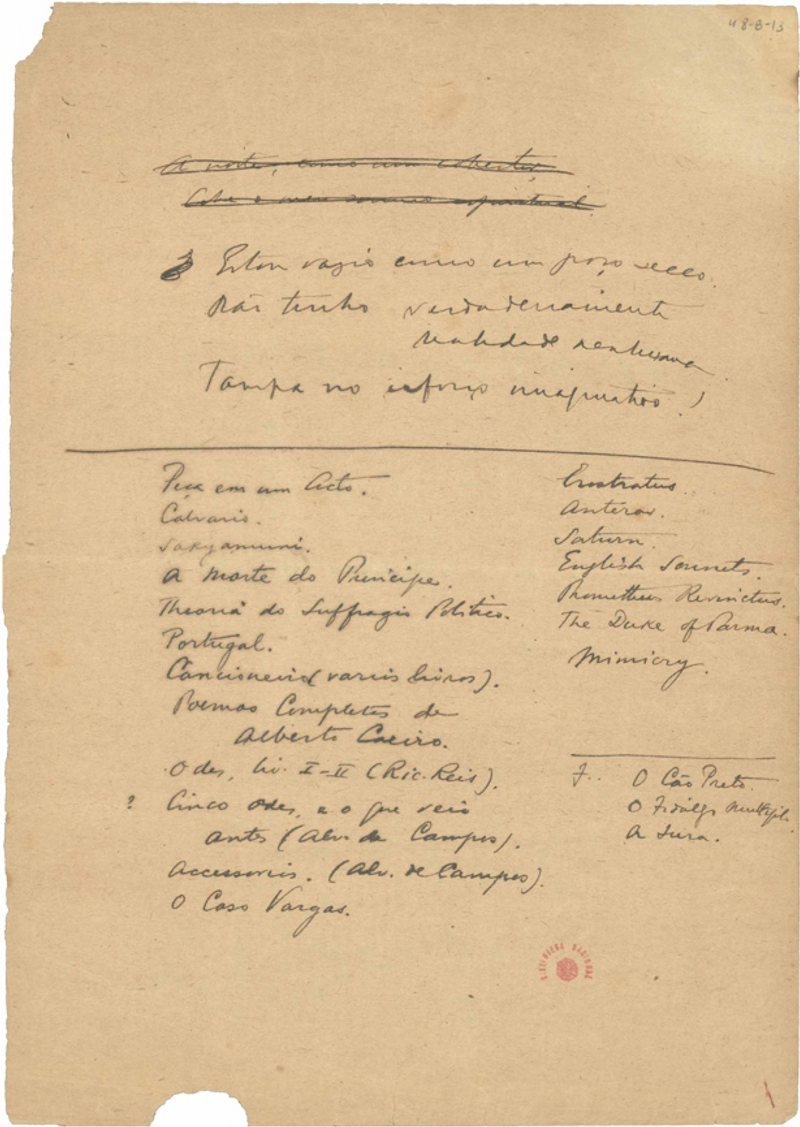
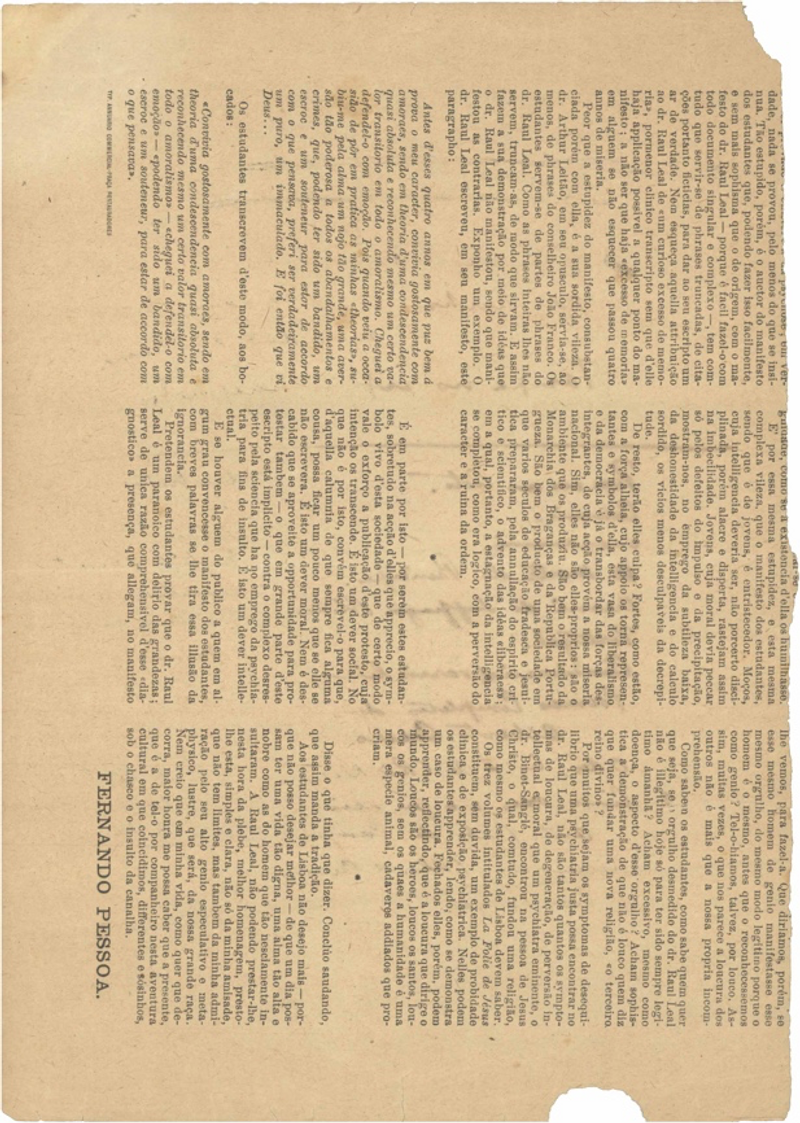
Annex 35 [c. 28-3-1932]
Ah, que extraordinario, [Ah, how extraordinary it is,
Nos grandes momentos do socego da tristeza,
Those great moments when one feels the peace of sadness,
Como quando alguem morre, e estamos em casa
Like when someone dies, and we’re in his house
[d’elle e todos estão quietos, [and everyone is still,
O rodar de um carro na rua, ou o cantar de
The sound of a cart rattling down the street, or the cry of
[um gallo nos quintaes. [a cockerel in someone’s garden.
Que longe da vida!
How far from life!
É o outro mundo.
Another world.
Viramo-nos para a janella, e o sol brilha lá fóra – We turn to the window, and outside the sun is shining –
Vasto socego placido da natureza
The vast placid peace of uninterrupted]
[sem interrupções!,
[nature!]
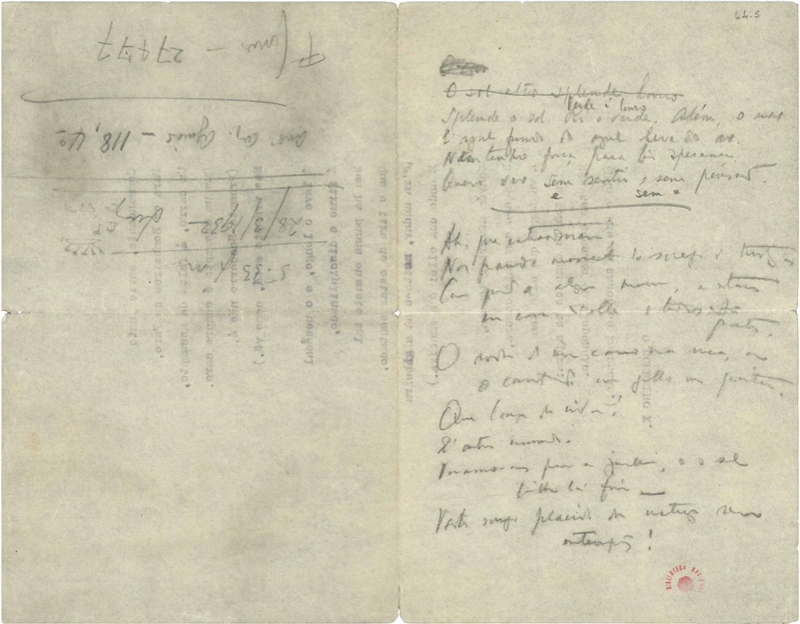
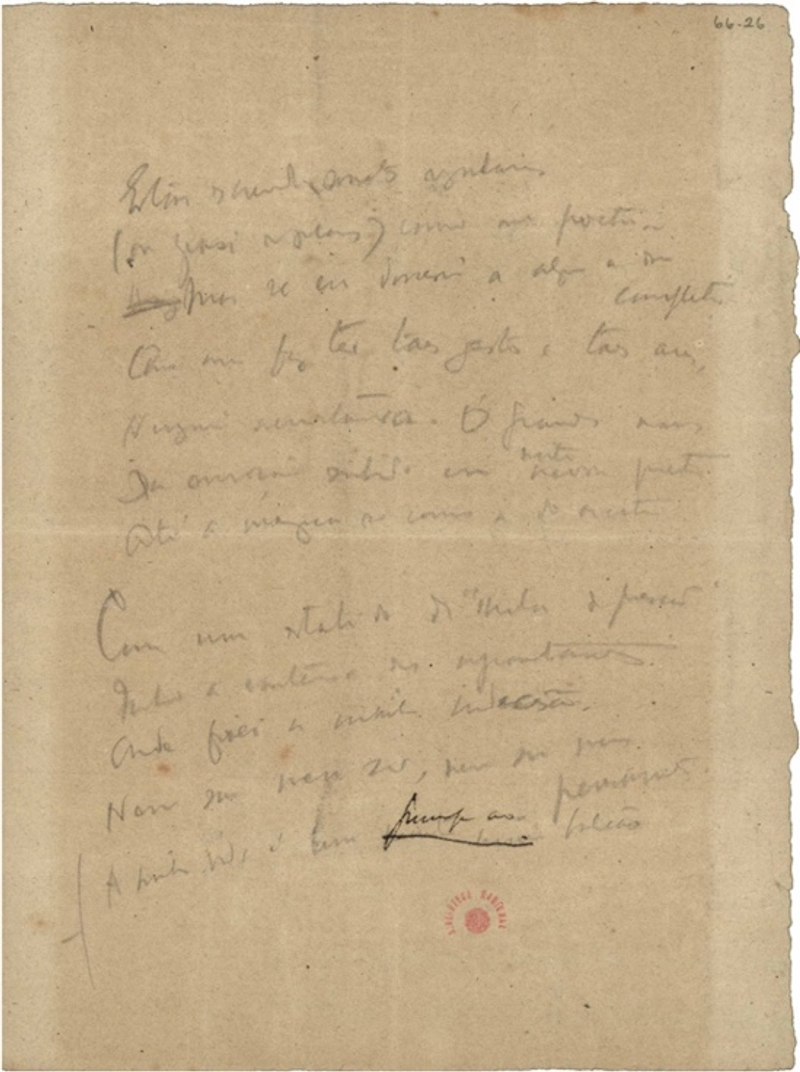
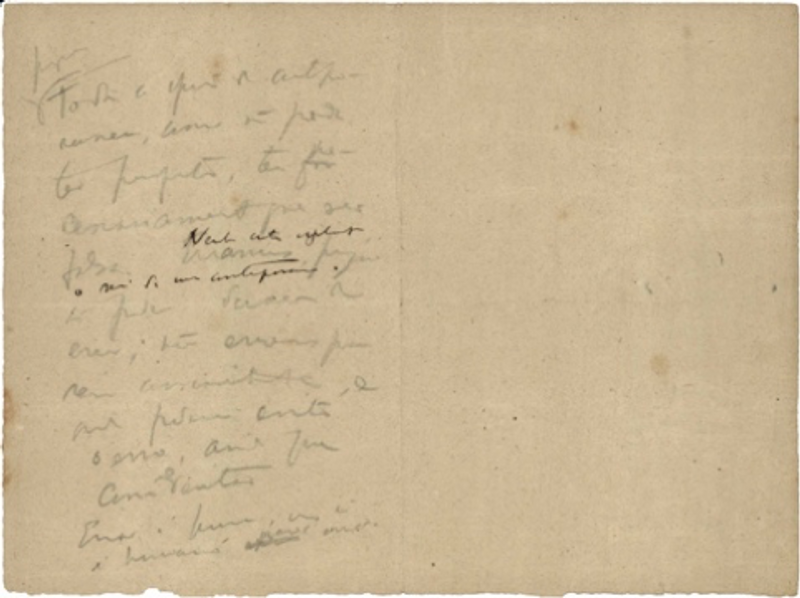
Annex 36 [c. 1934]
Estou escrevendo sonetos regulares [I’ve been writing regular (almost regular)
(Ou quasi regulares) como um poeta...
Sonnets as if I really were a poet...
Mas se eu dissesse a alguem a dor completa Were I to share, though, the terrible pain
Que me faz ter taes gestos e taes ares,
That makes me adopt such gestures, such airs,
Ninguem acreditava. Ó grandes mares
No one would believe me. O extreme tides
Da emoção subindo em noite preta
Of emotion rising up in the black night
Até a magua ser como a do asceta
Until grief is like that of the ascetic
[...] (...)
Como um estalido de “mola de pressão”
Like a snap, the snap of a “pressure spring”
Fecho a carteira dos apontamentos
I close the notebook full of my writing,
Onde fixei a minha indecisão,
And in which I have fixed my indecision,
Nem sou meu ser, nem sou meus pensamentos,
And I am neither my self nor my thoughts,
A minha vida é um principe ao balcão
My life is a prince standing on the balcony
[...] (...)]
V. Projects
One of the lists for the project “Triumphal Arch,” comprised of main poems by Álvaro de Campos.
Annex 39 [c. 1925]
Triumphal Arch
Poems by Álvaro de Campos
1. Triumphal Ode (1915)
2. Maritime Ode (1915)
3. Salute to Walt Whitman (1915)
4. Martial Ode (1916)
5. The Passing of the Hours (1916)
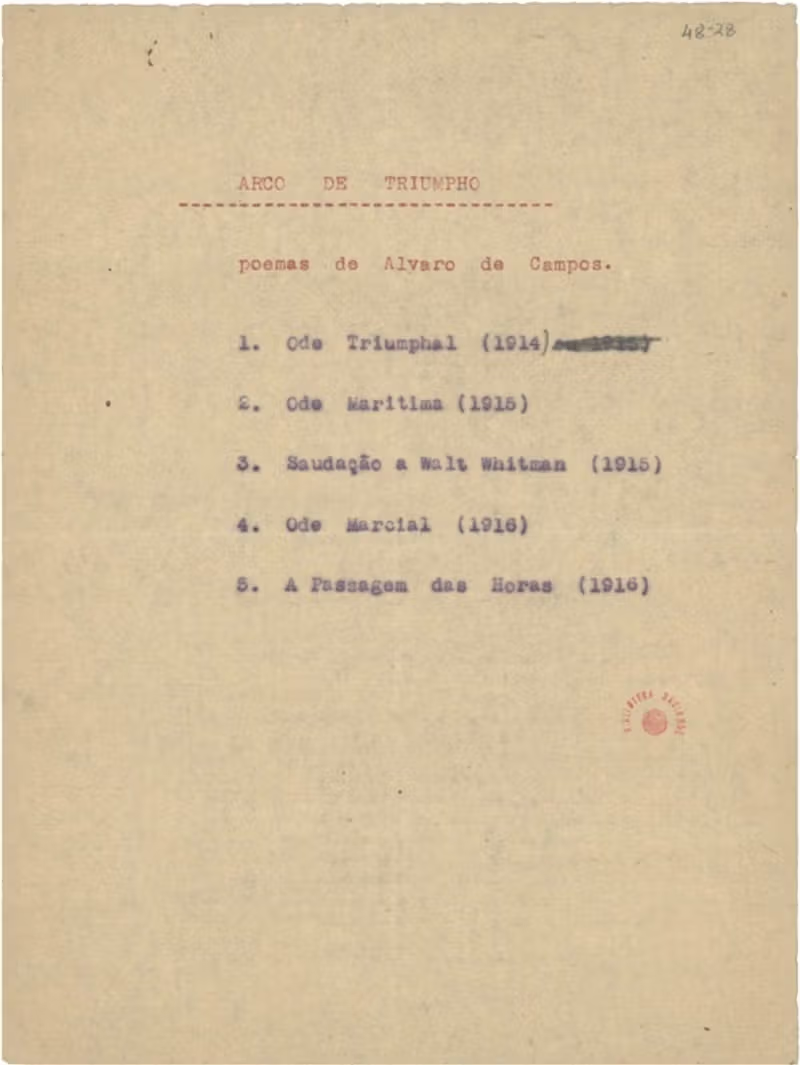
II. Prose
Texts for
Notes in Memory
of My Master Caeiro
1 [c. 1930]
I always addressed my master Caeiro humanly and simply as Caeiro. I never called him master: these things are said but not spoken, that is, written but not said.
2 [c. 1930]
What master Caeiro taught me was to have clarity, balance, and organization in my delirium and madness; he also taught me not to try to have any kind of philosophy, or only with my soul.
3[c. 1930]
The work of Caeiro is divided – not only in the book but in life too – into three parts: The Keeper of Sheep, The Shepherd in Love, and the third part, which Ricardo Reis aptly called Uncollected Poems. The Shepherd in Love is a futile interlude, but the few poems it contains are among the world’s great love poems, for they are love poems by virtue of being love poems and not just because they’re poems. The poet loved because he loved, and not because love exists, and this was precisely what he said.
The Keeper of Sheep is Caeiro’s mental life until the moment when the carriage appears over the hill. The Uncollected Poems are the descent. That’s how I think of them anyway: among the Uncollected Poems there are some that I believe I could have written. However, I have nothing in my imagination that allows me even to dream of having written any of the poems in The Keeper of Sheep.
In the Uncollected Poems, there is a weariness, and that is what makes the difference. Caeiro is Caeiro, but an ailing Caeiro. Not always, but sometimes. He’s the same, but somewhat distracted. This mostly applies to the middle poems in this, the third part of his work.
4[c. 1930]
My master Caeiro once told us that if the material world had no other advantage, it still had the advantage of being visible. And every time I think of those words, I feel them more deeply, despite their simplicity. Think only how difficult it is to use material things to deceive or swindle. If a man tells me that he has God in his pocket, I don’t know what test I have to put him through to verify it.
But if he tells me that he has five pounds in his pocket, the proof is very easy. And this means that in the spiritual realm we can all lie or deceive ourselves, and that in the end the physical is more valuable than the metaphysical.
5[c. 1930]
My master Caeiro hated suppositions. “Just suppose that...” I said once. But he interrupted me. “What am I to suppose with? With my eyes? With my ears?...” I answered, smiling, “With your soul…” And my Master retorted [...]
6 [c. 1930]
My master Caeiro hated ambition. One day I told him that I wished to be the freest person in the world. “Álvaro de Campos,” he replied, “you are what you are and no more.”
7 [c. 1930]
I don’t know who the woman Caeiro loved was. I never tried to find out, not even out of curiosity. There are things about which the soul refuses to remain in ignorance.
I know that nobody is obliged to return someone’s love, and that the great poets are not necessarily great lovers. But there is a transcendent resentment [...]
Let her remain anonymous, even to God!
8 [11 July 1930]
I don’t know who she was, the woman who had the sheer nerve to be loved by my master Caeiro. I prefer not to know with every ounce of my being. Whoever she was or pretended to be, I despise her with my entire self and in the name of the universe of things. May she always remain anonymous, even to herself. Let “to hell with her” be her passport and let what remains after that be her visa. May she un-exist! She deserves nothing better than such poppycock! Erase with the eraser what has not been read.
9 [c. 1930]
NEAIRA
It isn’t natural, said my master Caeiro, but it is as right as a bridge. Only a few moments later did I grasp how formidably true these words were.
“Neaira,” the concrete form of a classical abstraction, a bridge between the abstraction of the “beloved” and the concrete form of the “Baby Jesus” — false, but necessary, because when rivers flow artificially, that is, without swimming, they must have bridges.
10 [c. 1930]
“Blind! Blind!” cried Caeiro, with a shout that excluded all other alternatives.
— So would you prefer…
— “Anything but blindness,” cried Caeiro.
— And yet, I said…
— Remove my testicles and you take from me the possibility of all women; remove my eyes and you take from me the reality of the entire universe.
This was the child demigod speaking.
His essentially childish and divine judgment knows nothing of the meandering intricacies of the manly and the human. No, my master Caeiro doesn’t know that whoever removed our testicles could even take away our virginity if he wanted to. My master Caeiro knows nothing of the spiritual ramifications of the spermatic cord.
Horus, the crowned and victorious child, as the English occultist put it.
11 [17 October 1931]
The advantage of my verses over yours is that Gertrude can say them.
My master Caeiro interrupted:
— But that girl is not Gertrude.
— ?
— She is neither Gertrude nor Lidia: she is a girl.
One of you adopted the artifice of calling her the name that the Church had given her, the other the name he chose to give her.
12 [17 October 1931]
My master Caeiro was incapable of pessimism.
A “law of composition” that is scientifically clear is neither law nor anything else.
Ricardo Reis quoted in a desolate manner:
― What the Gods give, they sell.
― They sell but they hand over, said my master Caeiro.
13 [22 April 1931]
“If I knew English I would not be who I am, I would be someone else,” replied my master Caeiro.
14 [c. 1931]
“I never alter what I write,” my master Caeiro told me once. “If I wrote it like that, it’s because I felt it like that, and it doesn’t matter that today I feel differently. My poems often contradict themselves, I know, but what does that matter as long as I don’t contradict myself? There are things in some of my poems, you know, that I would be quite incapable of writing now or at any time. But I wrote them then, and that is the time when I wrote them. That’s why they will stay as they are.”
And when I asked him to explain further, he gave the following example:
“For instance, there are several things in that poem about the Baby Jesus. Today I would be incapable, however distractedly, of saying that the direction my gaze takes is his finger pointing. I would be incapable of saying that he plays with my dreams; and that he turns some upside down while others he places one on top of the other, and other such things. In short, I would be incapable of writing that poem today, and that says everything really.”
I defended the poem, and the very words that Caeiro criticized.
“No, it cannot be defended. They’re absolutely false. The direction of a gaze is not a finger: it’s the direction of a gaze. One doesn’t play with dreams as if they were stones or empty matchboxes. It’s pure nothing. I was distracted; but I also exist when I’m distracted, however distractedly.
“I can remember exactly how I came to write that poem. Father B... had been at home talking to my aunt and had been saying so many irritating things that I wrote the poem as a way of being able to breathe. That’s why the poem is outside of my normal way of breathing. But that state of irritation is, for me, a false state, which is why the poem doesn’t entirely chime with me, but only with my irritation and with that surplus person that irritation creates in us.
“If I felt irritated today – which is highly unlikely – I wouldn’t write anything. I’d let my irritation irritate itself. Then, when I felt the desire to write, I would write. I’d let the writing write itself.
“Even now, every once in a while, I sometimes write a poem that doesn’t agree with me, but I write it anyway. And just as I find everyone else interesting because they’re not me, I occasionally find a moment of me-not-being-me interesting too. In any case, I can no longer distance myself from what I want to say as much as I did in that poem about the Baby Jesus. I can distance myself from myself, but I can no longer distance myself from Reality.”
For a few moments Caeiro remained silent. And then he added:
“The poem where I distanced myself from myself the most is the one I wrote last month, following that conversation between Ricardo Reis and Antonio Mora about paganism and the gods.” (He was referring to poem [...] of the Uncollected ones).
“I heard what they were saying, and started to imagine how one could imagine a religion. And I thought that is how it would be. That’s the reason I wrote the poem, not as a poetic act but as an act of the imagination... Yes, as if I were telling a story to a child. That’s why I had to include the Prince... I can write fairy-tales too – but only once, of course...”
“There’s another poem of yours,” I said, “that is somewhat along those lines.” And when Caeiro looked at me questioningly, I went on: “It’s that one where you talk about a man in a brightly lit house in the distance, and you say that when you stop seeing the man, he stops being real.” (This is poem [...] in the Uncollected Poems).
“I don’t say that he stopped being real: I say that he stopped being real to me. I don’t mean that he stopped being visible to whoever else might be able to see him. He stopped being visible to me. He could even have died.”
“You admit, then, that there are two forms of reality?”
“More than two,” my master Caeiro unexpectedly replied. “As you can see... that chair is a chair and that chair is wood, and that chair is the substance that wood is made of and whatever it is chemically, and that chair may be – and certainly is – many more things as well. And it’s all of those things. If I look at it, it’s mainly a chair; if I touch it, it’s mainly wood; if I were to bite it and taste that wood, it would be mainly what the wood is made of. It’s like the right side and the left side, and the front and back of any given thing. All of those sides are real, each on its own side. The man I stopped seeing would continue to be real, but on a different side; since I wasn’t on that side, he stopped being real to me.”
15 [25 February 1931]
One of the most interesting conversations I had with my master Caeiro was the one in Lisbon, where everyone in our group was present, and the conversation turned to a discussion of the concept of Reality.
If I’m not mistaken, we got onto this subject because of a chance remark by Fernando Pessoa about something or other. He said this: “There’s no room in the concept of Being for parts or gradations; something either is or isn’t.”
“I don’t know if that’s quite true,” I objected. “You need to analyze that concept of being. It seems to me that it’s a metaphysical superstition, at least to a certain extent...”
“But the concept of Being isn’t open to analysis,” said Fernando Pessoa. “That’s where its indivisibility begins.”
“The concept may not be open to analysis,” I said, “but its value is.” Fernando Pessoa answered: “But what is the ‘value’ of a concept independently of the concept itself? A concept, that is, an abstract idea, isn’t susceptible to being more or less, and therefore it’s not susceptible to value, which is always a matter of more or less. There might be value in how a concept is used or applied, but that value is in its use or application, and not in the concept itself.”
At this point, my master Caeiro, who had been listening to this transpontine discussion with his eyes, interrupted, saying, “where there can be no more or less, there is nothing.”
“And why is that?” asked Fernando.
“Because everything that is real can be more or less, and only what’s real can exist.”
“Give an example, Caeiro,” I said.
“Rain,” replied my master. “Rain is a real thing. That’s why it can rain more or rain less. If you told me, ‘This rain cannot be more and cannot be less,’ I would reply, ‘Then that rain doesn’t exist.’ Unless, of course, you wanted to describe the rain at that specific moment: that rain is, indeed, what it is and wouldn’t be what it is if it were more or less. But I mean something different...”
“That’s all right, I understood you perfectly,” I said, interrupting.
Before I could go on to say quite what I can’t now remember, Fernando Pessoa turned to Caeiro: “Tell me something” (and he pointed with his cigarette) “how do you regard dreams? Are they real or not?”
“I regard a dream as I regard a shadow,” replied Caeiro unexpectedly, with his usual divine quickness. “A shadow is real, but it’s less real than a stone. A dream is real – otherwise it wouldn’t be a dream – but it’s less real than a thing. That’s what being real is.”
Fernando Pessoa has the advantage of living more in his ideas than in himself. He forgot not just what he was arguing, but even the truth or falseness of what he had just heard; he was so excited by the metaphysical possibilities of this new theory, regardless of whether it was true or false. That’s what esthetes are like.
“That’s an admirable idea! And it’s utterly original! It had never occurred to me.” (How about that “it had never occurred to me,” which so ingenuously indicated that he thought it impossible for an idea to occur to someone else before it had occurred to him, to Fernando?)... “It had never occurred to me that one could think of reality as susceptible to gradations. That’s equivalent to thinking of Being not as an abstract idea but as a numerical idea...”
“I find that a bit confusing,” Caeiro said and paused, “but yes, I think that’s right. What I mean is this: To be real means there are other real things, for it’s impossible to be real all alone; and since to be real is to be something that isn’t all those other things, that means being different from them; and since reality is a thing like size or weight––otherwise there would be no reality––and since all things are different, it follows that things are never equally real, just as things are never equal in size or weight. There will always be a difference, however small. That’s what being real is.”
“That’s even more extraordinary!” exclaimed Fernando Pessoa. “So you consider reality to be an attribute of things, given that you compare it to size and weight. But tell me this: what is reality an attribute of? What lies behind reality?”
“Behind reality?” said my master Caeiro. “Nothing lies behind reality. Just as nothing lies behind size or weight.”
“But if a thing has no reality it can’t exist, and yet it can exist without size or weight...”
“Not if it’s a thing that by its nature has size and weight. A stone cannot exist without size; a stone cannot exist without weight. But a stone isn’t a size, and a stone isn’t a weight. Nor can a stone exist without reality, but the stone is not reality.”
“All right, all right,” said Fernando, half impatient and half giddy with these new ideas, which were making him feel as if the ground were giving way beneath him. “But when you say ‘a stone has reality,’ you’re distinguishing stone from reality.”
“Of course. The stone is not reality; it has reality. The stone is just a stone.”
“And what does that mean?”
“I don’t know. That’s how it is. A stone is a stone and in order to be a stone, it has to have reality. A stone is a stone and has to have weight to be a stone. A man isn’t a face but he has to have a face to be a man. I don’t know the reason for this, nor do I know if there is a reason for this or for anything...”
“You know, Caeiro,” said Fernando thoughtfully, “you’re formulating a philosophy that’s rather contrary to what you think and feel. You’re creating a kind of personal Kantianism, making the stone into a noumenon, a stone-in-itself. Let me explain...” And he proceeded to explain the Kantian thesis and how what Caeiro had said more or less concurred with that thesis. Then he pointed out the differences, or what he thought were the differences: “For Kant these attributes – weight, size (not reality) – are concepts imposed on the stone-in-itself by our senses, or rather, by the fact that we observe it. You seem to be suggesting that these concepts are as much things as the stone-in-itself, and this is what makes your theory hard to grasp, while Kant’s theory – whether true or false – is perfectly understandable.”
My master Caeiro listened with rapt attention. Once or twice he blinked, as if to shake off ideas the way one shakes off sleep. And after thinking a bit, he said:
“I don’t have theories, I don’t have a philosophy. I see, but I know nothing. I call a stone a stone to distinguish it from a flower or from a tree – from everything, in other words, that isn’t a stone. But each stone is different from every other stone – not because it isn’t a stone, but because it has a different size and different weight and different shape and different color. And also, because it’s a different thing. I give the name stone to one stone and to another stone since they both share the characteristics that make us call a stone a stone. But we should really give each stone its own, individual name, as we do with people. If we don’t name stones, it’s because it would be impossible to come up with that many words, not because it would be wrong – ”
“Simply answer me this,” said Fernando Pessoa, breaking in, “just to clarify things. Do you think there is something we might call ‘stoneness,’ even as there is size and weight? I mean, just as you say ‘this stone is larger – has more size, as it were – than that stone’ or ‘this stone has more weight than that stone,’ would you also say ‘this stone is more stone than that stone,’ or in other words, ‘this stone has more stoneness than that one’?”
“Certainly,” replied my master without a moment’s hesitation. “I’m quite prepared to say ‘this stone is more stone than that stone’. I’m prepared to say that if it’s larger or if it’s heavier than the other one, since a stone needs size and weight to be a stone, and especially if it surpasses the other in all the attributes (as you call them) that a stone has to have to be a stone.”
“And what do you call a stone that you see in a dream?” asked Fernando, smiling.
“I call it a dream,” answered my master Caeiro. “I call it a dream of a stone.”
“I understand,” said Fernando, nodding. “So speaking philosophically, you don’t distinguish the substance from its attributes. A stone, in your view, is a thing composed of a certain number of attributes – those needed to make what we call a stone – and with a certain quantity of each attribute, which gives the stone a particular size, hardness, weight, and color, which distinguish it from another stone, even though both are stones because they have the same attributes, even if in different quantities. Well, that amounts to denying the real existence of the stone. The stone becomes merely a sum of real things...”
“Yes, a real sum! It’s the sum of a real weight, plus a real size, plus a real color, etc. That’s why the stone, besides having weight, size, and so on, also has reality... It doesn’t have reality as a stone; it has reality because it’s the sum of what you call attributes, all of them real. Just as each attribute has reality, so too does the stone.”
“Let’s go back to the dream,” said Fernando. “You call a stone that you see in a dream a dream, or at most, a dream of a stone. Why do you say ‘of a stone’? Why do you use the word ‘stone’?”
“For the same reason that you, when you see my picture, say ‘That’s Caeiro’ but you don’t mean that it’s actually me in the flesh.”
We all burst out laughing. “I understand and I submit,” said Fernando laughing with the rest of us. Les dieux sont ceux qui ne doutent jamais. The truth of that phrase by Villiers de L’Isle Adam was never clearer to me.
This conversation remained engraved on my soul, and I’ve reproduced it with what I think is near-stenographic precision, albeit without the stenography. I have the kind of clear, sharp memory characteristic of certain types of madness. And this conversation had an important outcome. It was, in itself, as inconsequential as are all conversations, and it would be easy to prove, by applying strict logic, that the only people who didn’t contradict themselves were those who held their peace. In Caeiro’s statements and replies – as fascinating as ever – someone of a philosophical turn of mind would doubtless be able to identify conflicting systems of thoughts. But although I accept this, I don’t believe there is any conflict. My master Caeiro was surely right, even when he was wrong.
As I was saying, this conversation had an important outcome. It provided Antonio Mora with the inspiration to write one of the most astonishing chapters of his Prolegomena – the chapter on the idea of Reality. Mora was the only one who said nothing during the whole conversation. He just listened to all the ideas being discussed, with his gaze turned inward. The ideas that my master Caeiro expounded in this conversation with an intellectual recklessness of instinct, and therefore in an inevitably vague and contradictory fashion, became a coherent, logical system in the Prolegomena.
I don’t wish to detract from Antonio Mora’s undeniable merit, but it should be said that just as the very basis of his philosophical system was born (as he himself reveals with abstract pride) from that simple phrase of Caeiro, “Nature is parts without a whole,” so too an important part of that system – that marvelous concept of Reality as “dimension,” and the related concept of “degrees of reality”– was born out of this conversation. To everyone his due, especially to my Master Caeiro.
Prose Unpublished
During Pessoa’s Lifetime
16 [c.1915]
MODERN TRENDS
IN PORTUGUESE LITERATURE
In every age and in every country, there are always two trends at odds with each other, one nationalist, the other cosmopolitan. Perhaps it would be fairer to call the first traditionalist rather than nationalist, since in countries where a nationalist trend has yet to be established, that is, where it’s not yet possible to gauge the feeling of the nation, this trend turns to some earlier one –– let’s say a classical one. Thus, in Elizabethan England, the trend represented by Ben Jonson was the traditionalist one, because it turned to the artistic ideals of Greece and Rome. The trend represented by Shakespeare was the cosmopolitan one, because it turned to itself, that is it surrendered to the influences of the moment, and since the most profound influences of the moment are common to all nations (more or less), it follows that this trend is inevitably what might be called cosmopolitan.
In Portugal today, two trends are on the verge of being at odds, for they are already antagonists. One stems from the Portuguese Renaissance, the other is divided and in fact made up of two trends, namely Sensationism, led by Senhor Alberto Caeiro, and Paulism, whose main representative is Senhor Fernando Pessoa. Both trends are opposed to that of the Portuguese Renaissance. Both are cosmopolitan, since they both stem from one of the two great present-day European currents. Sensationism is energetic and vibrant, and embraces Life, Matter and Force, and its representatives abroad include Verhaeren, Marinetti, the Comtesse de Noailles, and Kipling (so many different genres within the same trend!); Paulism belongs to the trend whose first clear manifestation was symbolism. Both proudly share the same starting point, in that they represent great advances in the trends of which they are a part. Sensationism is a great advance over what is happening abroad. As for Paulism, it is also a huge advance over all the symbolism and neo-symbolism out there.
17 [c.1917?]
Antonio Mora:
“Alberto Caeiro is a modern-day primitive. He can tell us what Nature is and how we should experience her.”
Álvaro de Campos:
“The direct way of feeling that I learned from Caeiro’s poetry –– the freshness of his impressions –– I applied to other subjects, to a Nature of a different order. I have come to realize that a machine is as natural as a tree, because it is real, and, after all, if you think about it, to be natural is to be real; and a city is as natural as a village. What matters is to feel things directly and innocently – trees or machines, countryside or city. My own sensibility predisposes me to “feel” the machine more than the tree, the city more than the countryside. This doesn’t mean that I don’t have the right to be considered a poet. The essential thing is to feel directly and simply. I feel directly and simply. Do I feel the complex, the abnormal and the artificial? That’s my way of feeling. As long as I feel these things in a spontaneous manner, I am in my proper place, the place that Nature, in creating me as I am, has given me. I do my duty. They call me a ‘transgressor.’ I am not. I feel and, although I transgress, I never transgress myself. I was born to feel things simply, just as simply as you; but unlike you, I wasn’t born to feel only simple things. If I am me and not you, why should I write as you write? I write as I write. What I feel in me is me being me. How do I transgress by being myself? For me, the only way to transgress is to create a system, or belong to a system. There are times of the day when I am a materialist and others when I am an ultramontanist, that is, a staunch supporter of Papal authority. That’s how I feel. And that I think is natural.
If, like the vast majority of poets, I followed an already well-trodden path, if I were a pantheist, a spiritualist, a Protestant, a Catholic, [...], or anything that is known and defined, I would deserve to be called a “transgressor,” because no one is born belonging to a system or a philosophy, everyone is born belonging to a brain and a nervous system, and with a way of feeling. not a religion, or an aesthetic, or any kind of morality.”
18 [1917?]
What I adore about Caeiro’s poetry is not the philosophical system that people say you can take from it. It’s the philosophical system you can’t take from it. It’s the freshness, the clarity, the primitiveness of the sensations. It is precisely the lack of any system. It’s the fact that his verses don’t make me think: they make me feel; and they don’t make me feel love, hate, or any other ordinary passion or emotion –– they make me feel things as if I were looking at them with great interest and attention.
I think that love poetry, sentimental poetry, patriotic poetry, nature poetry, [...] poetry –– all poetry that is poetry about this or that has run its course. Only the poetry of sensations has not yet done so, because sensations are individual and individuals cannot be repeated. We should, I believe, try to give as full an expression as possible to our sensations. Our individual sensations are not those of love, hate, [...] –– because these are too similar in all people, and there can only be a slight variation in their expression, which means that art is inevitably formalized and overly artificial. What is very much ours as regards sensations, those sensations that are very much ours, are direct sensations –– those that are not social in nature, those that come directly from sight, hearing, smell, touch, taste, and associations of purely individual ideas, ideas that come from our past, which, however contradictory, absurd, and inhuman they may be, belong to each of us alone,
That is why I say that there are no love poets, no patriotic poets, no [...] poets nor any other thing of a social nature. Poetry is individual. Poetry is not meant to express social emotions. Social emotions are expressed by action and each social emotion by a relevant action. Poetry exists to express what actions and gestures cannot express.
This is what I love about your poetry, my dear Master, not the quality, which is often attributed to them, that they sing of certain pagan virtues. Paganism matters to me as little as Christianity or anything else that is not me or my sensations. Caeiro’s contempt for current doctrines, literary and social, is enough to fill me with enthusiasm.
People will say, of course, that what is individual should not be considered art, because others will not be able to feel it. This is nonsense. As long as a thing can be expressed in words, another person can feel it, if he isn’t stupid or possessed of a very different sort of sensibility [...]. Those emotions that are so intimately ours that they cannot be expressed... if they cannot be expressed, how can others understand them or fail to understand them? If something can be put into words, other people can understand it. That understanding, it is true, is never perfect, because we are all different and do not feel things in the same way; but something is understood and that is enough.
Let me put it another way. Everyone is filled with joy by an extremely beautiful day. This emotion is an artistic emotion, because it does not serve any social purpose, nor can it be translated into an act, an action – we can look at the day and enjoy it, but it is a different sort of emotion. Appreciating a beautiful woman as a beautiful woman is something else –– and that is why it is to be scorned because it may conceal a desire to possess her in a different and more direct way, yes, direct. I’ve been told that there are landscapes before which one cannot help but howl with joy. Go ahead, howl, if that’s how you express joy.
If it’s something that can be said, then say it.
But let us be done, once and for all, with the poetry of society, sentiment, patriotism, hate, love, and [...]
Anyone who suffers bouts of humanitarianism should give alms, be a nurse, or something of the sort. Humanitarianism is distributed among the many, because it’s social in emotion.
Life is a journey that some make as a traveling salesman, others in ships on their honeymoon, and others, like myself, as a tourist. I go through life in order to look at it. For me everything is a landscape, as it is for any good tourist –– fields, cities, houses, factories, lights, bars, women, pain, joy, doubts, wars, harvests, [...]. In order to enjoy my journey, I want to feel as many things as possible in the shortest possible time. To feel everything in every way, to love everything in every way, to touch and see things without actually touching them, to pass by and not look back. This, I believe, is the only destiny worthy of a poet.
19 [c.30 October 1928]
Ever since I became convinced of the futility of all disinterested effort, I have never again thought of writing a book. I restrict myself to making notes. Since they are, in essence, useless, this at least cuts down the hassle. These notes concern the politics of the future and contain a political plan. They will not be adopted in practice, because practice does not adopt, but rather creates. I write these notes as if I were writing a poem – and that is the only reasonable attitude to recommend to any theorist: either consider yourself to be a poet or shut up.
20 [c. 1929]
I cannot accept Ricardo Reis’ response to Caeiro’s work, which he praises not because it is a work of art, but because it is a work of truth. I repeat, I do not accept this. I consider Caeiro’s work to be beautiful regardless of the truth it contains or does not contain. That’s why I call Caeiro’s work a work of art.
Anything that provokes pleasure, independently of any feelings of satisfaction, usefulness or truth, is a work of art. I repudiate the so-called artistic nude, because it gives, if it does, a sexual sensation, that is, a sensation, albeit frustrated, of satisfaction; because any sexual emotion implies the pleasure of satisfaction, not just pleasure. So-called industrial art is only art if it ignores the usefulness of the made object. A poster intended to produce a purely commercial effect can be a good poster, but it can also be a bad work of art. And –– and this is my point –– as long as the truth contained in a phrase – or the truth it might contain – is interesting, that phrase might be deemed philosophical, but it is not art.
When Caeiro says, “Nature is parts without a whole,” what gives us pleasure is the line itself and not its possible truth, or our acceptance of it as true; it is the line being what it is, in all its paradoxical vividness. Had Caeiro said the same thing in another way, in a philosophical way –– for example, “Nature is essentially plural, and it is impossible to reduce it to a unity” –– there would be nothing beautiful about that; the very idea loses reality; it becomes fleshless, a mere skeleton. mere philosophy.
This is why I have always disagreed with the thesis put forward by Fernando Pessoa, that philosophy is one of the arts. I have always thought that philosophy was a virtual science, or an attempt at science, or a failed science-in-the-making. Philosophers do occasionally come up with phrases that are poetry, sometimes great poetry. But they are only sentences. When Plato says “God geometrizes,” this is beautiful regardless of whether God does geometrize, or indeed if He exists. It’s beautiful because it expresses a great idea full of color and substance.
Poetry is any form of literary art that provokes an emotion for reasons independent of what the phrase or sentence means.
21 [c.1929]
The lovers, which, by the way, do not exist, in Ricardo Reis’ poetry are abstractions turned inside out, or perceived inside out. They are not abstractions in the sense of being abstract, but in the sense that they have just enough reality to be considered to exist. They are Chloes, Lydias and other such Romanesque names, not because they do not exist, but because they could just as easily be Chloe as Maria Augusta, and while the latter suggests a seamstress or something similar, with the aggravating factor that she might actually be a seamstress, a Lydia feels genuinely pagan.
Reis is very lucky to be writing in a style so compressed that it is almost impossible to follow with precise attention –– assuming it is precise –– the complete and exact meaning of everything he says. This is how the ode that begins: “A flor que és, não a que dás, eu quero” [“I want the flower you are, not the one you give”] (Aren’t you shocked by the fact that Reis includes the personal pronoun “eu” [“I”], thus going counter to his entire linguistic nature?) disguises the fact that it is addressed to a boy, since few readers (doubtless lost in the poet’s syntactic obscurity) will notice the masculine ending – “avaro” – in the following line:
Se te colher avarO [If you, miserly fellow, should be plucked
A mão da infausta sphynge... By the fateful hand of the sphinx...]
For the first time, syntax appears here as a veil of modesty, as a thin screen, or whatever, covering the parts of speech.
22 [c.1929]
Our Ricardo Reis’s sensibility is blatantly rheumatic.
He flatters and celebrates the Muse, all the while looking elsewhere, thinking I know not what. Let’s not ask. There are, of course, no fireworks at Ricardo Reis’ celebrations, because the Alcaic stanza always was a very quiet soul.
The two of us, that is, Caeiro and I, are both part of the inner turmoil of this Portuguese sensibility. Fernando Pessoa is a marginal note; Ricardo Reis merely strikes the wrong note.
We can conclude from Reis’ personal philosophy that he expects nothing from life but wine and death. A simple philosophy, but a little cold, since we don’t warm our wine as the Romans did. This calm and almost fond contemplation of the hope of absolute mortality has a whiff of near-death about it. A living being should at least rebel against having to die, unless he does not believe he will die. But Ricardo Reis treats mortality as if it were immortality and has a simple and confident faith in nothing at all. The fakirs would sit staring at some meaningless point in space; however, they could have not done so had they been staring into the void. Ricardo Reis achieves this fakirism of the sensibility: he stares into the Void, smiles, and asks for a glass of wine. From time to time, he turns aside and asks to be crowned with roses. In between, he turns to another side and says “Chloe.” This Chloe, who sometimes morphs into Lydia, is addressed mournfully in that ode from Book I with a masculine adjective.
I am well aware that in Caeiro there is the same indifference towards death. Whereas Caeiro sees death in the way a child does, having heard the grown-ups talking about it, Ricardo Reis acts like an old man with death knocking at the door. Neither of them believes in immortality, but Caeiro doesn’t believe in it because he doesn’t think about it. Reis, on the other hand, doesn’t believe in it because he doesn’t believe in anything. That is why, despite our mortality, reading Caeiro cheers and stimulates us like the sun and the sky –– for they don’t believe in immortality either, and for the same reason as Caeiro. Reading Ricardo Reis is a cheerless, depressing experience, strangling our poor heart to the point of blocking off the genuine esthetic happiness his poetry brings us. His poetry has the beauty of a beautiful cemetery. We admire it and immediately leave. The more beautiful it is the more it saddens us.
Underneath it all, in stark contrast to that beauty, one feels, like a physical presence in reverse, the all too imaginable reality of the Void.
23 [c.1929]
PARAGRAPH RHYTHM
Everything artificial in poetry –– rhyme, meter, stanza –– is harmful but only secondarily. It is not so much the harm caused by rhyme, meter or stanza, because they are themselves artificial. What they do, though, is divert our attention away from emotion or thought, thereby creating new thoughts, thus interrupting the original thought.
Anyone who has written using meter, rhyme or stanzas, knows that these elements suggest things that were not in their original thought, they know they are active elements in compelling thoughts and their expression to follow a path that, were it not for those elements, they would not follow. Now, if I feel something deeply and I want to say it deeply, so that others can also feel it deeply, I don’t want to be led astray from that deep feeling just because “love” doesn’t rhyme with “cheesecake,” or because “potato” has to become “turnip” where only two syllables fit, or because “today” is a spondee and I need a dactyl and am obliged to write “yesterday” instead.
The strenuous verbalism of great poetic sensibilities like Victor Hugo –– a man capable of real soul had he had the discipline to be undisciplined, that is, to make formidably emotional poems –– is based entirely on the desire to fit love or hate into alexandrine couplets, on the need to think and feel in alternating half-rhymes and full-rhymes, and to set out his feelings in two alexandrines with an exact number of metrical syllables and an aabccb rhyme scheme, etc. How is it possible to feel anything in such cages?
The river that could otherwise flow freely between its banks overflows into the fields; what should be a river becomes a flood. This seems all wrong; meter, rhyme and stanzas should really be like the banks of a river, but that isn’t the case. The banks should be those of our natural emotion. Rhyme or meter cause the waters in the river to rise up and overflow in a way unknown in nature. It’s not even a natural flood.
Can you become a great poet this way? Perhaps. But you would be a great poet despite those constraints and not because of it. You are a great poet because you are a great poet, not because “courage” rhymes with “rage” or “son” with “saucisson.”
If, when developing a poem that has meter or rhyme, my idea calls for the word “love,” but the meter or rhyme demands the syllables or the sound that can be filled only by the word “affection,” a possibly plausible synonym, it would only be human of me to use the word “affection” and consider the case closed. But the evolution of the poem will be changed by the fact that the word “affection” contains elements that are not contained in the word “love,” and, without my noticing, without my even realizing it, or not realizing it at all, the poem will become distorted because my own idea has been distorted.
Even allowing for the inevitable artificiality of all poetry, no one could deny that we have too much of it here. Anyone who genuinely feels does not speak in verse, or even in prose, but expresses that feeling by shouting or taking action, but anyone who feels slightly less genuinely and so can speak in verse will inevitably be speaking in a verse not entirely his –– because meter and rhyme are external impositions –– and what he writes will thus be less true and, ultimately, a mere nothing.
I am well aware that the word itself is an institution created by others, but the essence of life is assimilation, that is, converting what belongs to others into ours. The more what belongs to others becomes ours, the more alive we are. And to achieve this it is necessary, at least initially, that what belongs to others should already belong as little as possible to those others, so that it can more easily become ours. The human soul is not strong enough to work steadfastly through such immense difficulties. Napoleon said he did not know the word “impossible,” but if he hadn’t seen it before, he must have come across it in Moscow and Waterloo. Then, he must have come to know the word in all its full malignant power.
Goethe said: “It is in working within limits that the master reveals himself.” This is true, but master there is in the sense of jongleur of possibilities, a circus artiste of superior intelligence. Performing a somersault in which the body passes through a paper arch reveals the master in Goethe’s sense, because the paper arch is a limit, but in life, and in the art that is life, there are no such limits. The limit we have is our own personality; it is being us and not the whole of life. That’s the limit within which we have to work, because we cannot work outside of it. And that is limitation enough.
24 [c.1929]
Paragraph rhythm has been poorly received, and, in part, we can understand why. In the case of Whitman, the misunderstanding –– which in any case was not that great, and certainly not so very widespread –– may be explained by the novelty, not only of the rhythm itself (already presaged by various other poets, such as Blake, [...]) but of the content, since Whitman was the first poet to have what later came to be called a futuristic sensibility – and he sang of things that were considered unpoetic, when truth be told, only the prosaic is unpoetic, and the prosaic lies not in things but in us. Whitman, however, disoriented some readers because he introduced two novelties at once. I provoked the same ahurissement when my “Triumphal Ode” appeared in Orpheu I, given that, although written close to seventy years after the first edition of Leaves of Grass, no one in Portugal even knew of Whitman’s existence, just as, in general, they do not know of the existence of anything.
In the case of the French decadents and symbolists, however, the incomprehension and aversion with which paragraph rhythm was received had a different reason. The French decadents used irregular, unrhymed verse to spout nonsense: their content killed the continent. It is understandable, therefore, that the unfortunate ones who became aware of irregular verse through Maeterlinck’s imbecilic Serres Chaudes, René Ghil’s idiotic delirium, and Gustave Kahn’s senseless assonances, identified that lack of depth with the absence of rhythm –– which is not always absent either, because Kahn, for example, makes really impressive use of rhythm.
This, however, had nothing to do with rhythm. Mallarmé, who wrote in strict “classical” meters, was similarly nebulous when it came to meaning –– compelling the reader to decipher meaningless riddles and at the same time try to feel them. Paragraph rhythm, when it actually works, varies depending on the practitioner. In Whitman, it becomes a broad, complex, curious mixture of verse and prose rhythms; in Master Caeiro’s work, it is rather short, rigid, and dogmatic –– prosaic without being prose, poetic almost without being poetry. In Marinetti, it is the picturesque becoming pure idiocy, since his own banality of mind prevented him from inserting any ideas into the irregular rhythm, and because it did not allow him to do that, he called it “futurism” –– as if the expression “futurism” had any comprehensible meaning. “Futurist” simply means works that last, which is why Marinetti’s nonsense is the least futuristic of all.
Let us take a simple and brief example from Caeiro’s poetry:
Lightly, lightly, very lightly,
25 [c.1929]
Paragraph rhythm is as easy, or as difficult, as regular rhythm. To claim that anyone can write free verse successfully is false. It is easier to write well in regular verse. Modern regular verse allows us not to overthink, that is, not to feel another type of rhythm. And that’s true. It is often wrong. Quantitative rhythm was certainly more difficult.
Paragraph rhythm demands that we pay great attention to ideas, emotions, to the breath [...] because all this is part of the rhythm, which is not a matter for the ear alone, but for the way ear and understanding interpret that rhythm.
26 [c.1929]
If I approached a reader and said: “That car of yours is not a vehicle, because it’s not drawn by horses,” the reader would probably reject my argument as unsound and frivolous. When someone comes up to me and says, “This poem is not a poem because it has no regular meter or rhyme and therefore, cannot be scanned or read as poetry,” that person would be making a statement as absurd as my hypothetical claim about the reader’s automobile.
My assertion, had I made it, would have been based on the criterion that only horsedrawn vehicles can be called vehicles. The other statement, which is often made, is based on the criterion that poetry requires rhyme and meter, otherwise it cannot be called poetry. Now, what remains to be seen is whether being drawn by horses determines that a thing with wheels can be called a vehicle, and whether scansion determines that something is not prose but poetry. In the case of the former, it would be necessary to start by defining what a vehicle is; in the latter, it’s necessary to start by defining what poetry is.
Poetry differs from prose not only materially, but mentally. If they didn’t differ, there could be neither one nor the other, or there could be just one that was a mixture of both. The mental state that produces poetry is different from the mental state that produces prose. The external difference between prose and poetry is rhythm; the internal difference between the two is a mental state that naturally expresses itself in words, and a mental state that naturally expresses itself in a rhythm made of words. I say “naturally” in both cases, but for different reasons: any mental state that doesn’t [...]
There is rhythm in prose, and there is rhythm in poetry. In poetry, however, rhythm is essential; in prose it is not, it’s merely an accessory –– it’s an advantage, but not a necessity. Basically, there is no poetry or prose [...]
27 [c.1930]
DEBATE BETWEEN RICARDO REIS
AND ÁLVARO DE CAMPOS REGARDING
THE CLASSIFICATION OF THE ARTS
Ricardo Reis:
There are only two true arts: Poetry and Sculpture.
Reality is divided into spatial reality and non-spatial, or ideal, reality. Sculpture represents spatial reality (which painting misrepresents and debases and architecture renders artificial because it doesn’t reproduce something real but something else entirely). Music, which is the architecture of poetry, isolates one thing ––sound–– and aspires to reproduce the rhythm that exists beyond what’s human, namely, the idea.
Alvaro de Campos:
There are five arts –– Literature, Engineering, Politics, Representation (which includes drama, dance, etc.) and the Decorative Arts. (The latter ranges from the art of arranging objects on a table to painting and sculpture. Fernando Pessoa was right about one thing: painting and sculpture are essentially the art of decoration, but he was wrong to limit the decorative arts to just painting and sculpture).
28 [9 April1930]
Alvaro de Campos:
Everything is prose. Poetry is prose with an artificial rhythm. This artifice, which insists on creating deliberate, unnatural pauses – different from, although sometimes coinciding with, those created by punctuation – consists of writing the text on separate lines, with each line preferably beginning with a capital letter, to indicate that the lines are like separate sentences, to be read separately. This process creates two things that do not exist in prose –– a rhythm peculiar to each line as if each were an independent person – and stress, which comes to rest on the last word of each line, thus creating an artificial pause, or (of course) on just one word, if there is only one, which then stands out with no need for italics.
But you ask: why this need for an artificial rhythm? Answer: because intense emotion is too large to be accommodated by mere words –– it has to lower itself to become a shout or elevate itself to become a song. And since to express yourself is to talk, and since you can’t scream and talk at the same time, you have to sing-talk, which means putting music into speech; and since music is foreign to speech, music is inserted into speech by arranging the words in such a way that they contain a music that is foreign to them and therefore artificial. That is poetry: singing without music. That is why the great lyrical poets, in the broadest sense of the word “lyrical,” cannot be set to music. How could they, if they are already music?
Ricardo Reis:
Campos says that poetry is prose in which rhythm is an artificial element. He considers poetry to be prose made into music, hence the artifice. However, I would say, rather, that poetry is music created out of ideas and, therefore, words. Imagine making music with ideas rather than with emotions. With emotions you will only make music. With emotions making their way to becoming ideas, and which use ideas in order to define themselves, you will make music. With ideas alone, containing only the emotion that necessarily exists in every idea, you will make poetry. Thus, singing is the primitive form of poetry, not the primal form, but the path leading to it.
The colder the poetry, the truer it is. Emotion should only enter poetry as a device for rhythm, the distant remnant of music in verse. Rhythm, when it works perfectly, must arise from the idea rather than from the word, a perfectly conceived idea is in itself rhythmic; the words in which the idea is perfectly expressed will in no way diminish it. They can be hard and cold, no matter, they are the only possible words and therefore the best. And, being the best, they are the most beautiful.
Without ideas, the mere rhythm of words is useless. There are no beautiful names, there is only the evocative power that makes them names. To lull someone to sleep with Milton’s proper names is fine if the person knows what those names mean, but quite absurd if not –– the words being merely the torpor of a slumbering consciousness.
29 [12 December1930]
To have opinions is to betray oneself. Not to have opinions is to exist. To have all possible opinions is to be a poet.
30 [c.1930]
When you think about something seriously, it is hard to have an opinion about it. To be right means to be oblivious. Only someone who doesn’t see something clearly can see that thing clearly. To exist is to be distracted. To die is to focus so intently on the body that, under that intense scrutiny, it dies. Is this a joke? One of God’s jokes?
Today, on turning the page of a philosophy book, I had the sudden realization that the next page would be equally pointless. I had come to great though entirely marginal conclusions, but... All human thoughts are pages to be turned, and the next one continues the previous thought, sometimes in the middle of a word. The meaning of the chapter is merely the great attentive effort made by one possible reading. As for the entire book... it will always be a work whose subsequent volumes will never see the light of day. La suite au prochain zéro.
31 [c. 6 December 1930]
MESSAGE TO THE DEVIL
It is necessary to create abysses, so that the humans who don’t know how to jump over them will be engulfed in them forever.
And to create all possible pleasures, the more artificial and the more stupid the better, so that the flames attract and burn.
The problem with overpopulation and overproduction could be eliminated by creating focuses for human elimination (through all the vices) and for human inertia (through all available temptations). The great sociological solution would be to create more suicides.
It’s easy to hear some guiltless shrew say she “does not believe in the Law of Christ,” it’s just a matter of encouraging her to follow the non-law of Christ. In three years, she’ll be worn out and done in, and then she’ll discover that the worst thing about not following the law of Christ is that no one else is following it either. And the trash can will welcome her along with the theories of the teachers she herself taught.
As sociologists our duty is to anoint the ground, even if only with our tears, so that those who dance may slip on it.
And communists, lip service batonnières, humanitarians, internationalists – all of them are ardently collaborating in the necessary elimination of themselves. Then, from the corners of the provinces, where they take tea with their families, or work the land without theories or desires, the strong will survive and civilization will continue.
Because Reality is always just a simple patch of sunshine, an inherited backyard, and the certainty of being an individual.
32 [c.1930]
When our Ricardo Reis reduced his poetic art to six lines of poetry, I have to say that he had a happy inspiration, if, that is, explanations apart, he relies on inspiration:
Ponho na activa mente o fixo exforço [I apply my mind to the effort
Da altura, e á sorte deixo,Of the moment – and the line?
E as suas leis, o verso.I leave that to chance’s laws.
Que, quando é alto e regio o pensamento, For when the thought is fine and lofty
Subdita a phrase o buscaSubmissive words seek it out
E o scravo rhythmo o serve.And slavish rhythm gladly serves.]
Not the poetic art, but his own. I grant that he may well actively apply his mind to the effort “da altura” (whatever that means), although any poetry that occupies only the tiny amount of space characteristic of a pinnacle does seem to me rather narrow. However, I find the relationship between altura and lines of a certain number of syllables more obscure. And yet oddly – apart from that business about altura, which is personal and therefore known only to Reis – who does, in fact, keep it to himself – the poem is full of truth:
Que, quando é alto e regio o pensamento, [For when the thought is fine and lofty,
Subdita a phrase o busca Submissive words seek it out
E o scravo rhytmo o serve. And slavish rhythm gladly serves.]
While I have doubts about thought being emotion, and, again, about that word altura, it is true that when an emotion is strongly conceived, the words describing it do spring forth spontaneously, and the rhythm that translates it emerges out of those words. I cannot believe, however, that emotions, not even Reis’ emotions, are universally obliged to appear in Sapphic or Alcaic odes, and that Reis, whether telling a boy not to run away from him, or saying how sorry he is to have to die, necessarily has to do this in submissive lines, two long and two short, and in slavish rhythms that must accompany the submissive words with two lines of ten syllables and two of six –– with a measured step that must prove disconcerting for the emotion.
I don’t criticize Reis more than I do any other poet. I admire him, and as a matter of fact, I admire him more than many other poets. His inspiration is narrow and dense, his thought compactly sober, his emotion real albeit overly focused on the cardinal point called Ricardo Reis. But he is a great poet –– this I admit –– if there are any great poets in this world outside the silence of their own hearts.
33 [c.1930]
Better never than late. And the Portuguese saint, as the saying goes, is Saint Never. Let’s celebrate his saint’s day ― 29 February in a non-leap year.
Two birds in the hand are worth more than one in the bush.
Not all that is gold is glitters.
Shining a lamp ahead of you is worth two prayers.
God writes crookedly on straight lines.
34 [c.1930]
God is an economic concept. In God’s shadow, the priests of all religions create their metaphysical bureaucracy.
35 [c.1930]
I am going to throw a bomb at Destiny.
36 [c.1930]
Ah, if only I had the courage to truly desert!
37 [c. 22 April1931]
Sensations are the means by which God creates the world. The subjective is the brush with which the objective is painted. The objective never ceases to be objective, but it is the subjective that makes it objective, that makes it really objective.
38 [c. 21 October1931]
The historian is a man who puts the facts in their proper place. It’s not how it was: it’s just the way it is.
I have never managed to be entirely incoherent. To talk nonsense, yes, but sensibly.
Hargrave Jennings ― Retired Onanist.
AB(C) – .
O banner of my dream,
You are now but a dish rag.
We miss out if we delay.
What we lack ― as does everyone except the French ― is the ease and naturalness of prose with which Chateaubriand exemplifies the eighteenth century, in all its acquired ease.
I reluctantly love France, because it knows how to know how to write.
39 [c. 1932]
It’s true...
Who would proofread the Book of Destiny?
40 [c. 1932]
DEFINITIONS
Mallarmé:
The music of half the words, and half the words of music.
Victor Hugo:
The whole visible universe gyrating around an absent center.
Musset:
The fine-tuned violin that accompanied the out-of-tune voice.
Vigny:
The philosophy of the man who was not there.
Rousseau:
Ça m’est inégal.
I don’t not-mind.
The violent [...] man in a carnival costume
Goethe:
The ladder leaning against the whole
Shakespeare:
Everything but the whole.
Milton:
To every angel hisown fall.
Flaubert: (or Keats)
The goddess of the south to the north of the goddess of the south.
Montaigne:
The apoplexy of the final smile.
Homer:
Then Jupiter stood up.
Nietzsche:
Unhuman, too human.
Camões:
The ship at half-love.
Dante:
[...]
Corneille:
[...]
Voltaire:
The malice of malice. [...]
Diderot:
The UnNun.
Swift:
Seeing clearly from the darkness.
? Hoyos:
Heliogabalus’s childhood.
Audacity is merely the opposite of cowardice.
Vanity is the pride of the rich.
Pride is the vanity of the poor.
The flying gravestone.
Pumice stone of the future.
Include Alvaro de Campos ― epitaph.
Shelley:
The Other Bird.
Keats:
[...]
Kant:
The truth [...]
The Mystery of Goethe Cathedral ― detective novel turned upside down.
41 [c.1932]
EPITAPHS IN PROSE
Alvaro de Campos
He was the only Great Consequence of Futurism. He was not a consequence of Futurism.
42 [c.1932]
This show is a protest by substance of Decadence against the attribute of Futurism. They gave opium to the cause closest to this kind of art-in-motion. The real appearance of this dream, built out of people and colors moved by people, is of a purely fluid essence. That’s what is so admirable about it ― the static nature of that pretend dynamic.
43 [c.1932]
Sport is the revelation of the human body in its imitation of the soul in the way it conquers. The body conquers what the soul desires: that is love; the soul conquers what the body desires, that is the other love. But in sport the body conquers what the soul conquers; they are as one in that dynamic.
44 [c.1932]
OLYMPICS
Sport is useless intelligence manifested in body movements. While paradox rejoices in the contagion of souls, sport makes light of it in its puppet shows. Beauty only truly exists in elevated thoughts, in great emotions, in achieved desires. In sport ––– as game, pastime, play –– what exists is superfluous, like what the cat does before eating the mouse about to run away. Nobody thinks seriously about the result, and while what is about to disappear lasts, what doesn’t last exists. There is a certain beauty in this, as in dominoes, and when chance provides the right move, wonder enshrines the winner’s weary body. What’s left in the end – and always tending to the futile – is what the game fails to achieve. Pueri ludunt, as in the Latin primer...
The young bodies that will one day grow old gleam in the sun, in their brief moment of spurious glory; the paths that, because of the very fact that they exist, have ceased to exist. The sun sets over what we see, as it did over what we saw. Ancient Greece only touches us intellectually. Blessed are those who fail even as they seem to possess glory. They are the ordinary and real. The sun in the arenas makes the faces of others sweat. Poets sing of them before the sun sets completely. They are all fish in an aquarium taken care of from beyond the glass by the intelligence that does not touch them. And their beauty, much like that of everything else, is this –– a movement behind a wall of glass, the flicker of a shining body dogmatized by withdrawal.
45 [c.1933]
A specialist is someone who knows something about one thing and nothing about all things. You can only know something about anything, because human knowledge is limited. And in order to understand something, it would be necessary to understand all things, because a thing is part of all things. Thus, a specialist is someone who knows nothing and lives by this knowledge.
The specialist is only useful when his specialty is so restricted that it is of no importance whatsoever. There may be specialists in hammering in nails, but there can be no good specialists in building civilizations. There are very good diggers, but no good psychiatrists.
The specialist is someone who enjoys the respect of others, albeit only as regards one subject. The specialist is incapable of initiative. This is why there are so many happy specialists.
Prose
Interview
46 [1925]
ÁLVARO DE CAMPOS
NAVAL ENGINEER AND FUTURIST POET
grants a sensational interview to [...]:
Some really original observations on the current situation in England –
in Europe – in Portugal
The chance visit to Lisbon from Newcastle-upon-Tyne by Álvaro de Campos –– a naval engineer working for Forsyth & Co. and one of the most famous collaborators on the celebrated review Orpheu –– gave us the idea of asking one of the most original and brilliant minds of what we can no longer really refer to as “the new generation” what he thought about the current state of affairs in Portugal, especially in relation to Europe (which was what most interested us).
By a happy coincidence we met Álvaro de Campos in the Terreiro do Paço, on his way, ahead of schedule, to catch the fast steamboat to the Algarve. After a few initial words of greeting, our first question was this:
– What is the current situation in England?
– As regards industry, it’s currently doing very badly, which means that it will be doing very badly politically in the future.
– The industrial crisis stems from various causes, both old and new, some are very real economic woes, others merely fictitious. The malaise is deepseated. Successive governments have shown a complete inability to solve the main problems facing them –– namely, the industrial problem, the unemployment problem, and the housing problem. Great Britain continues to be stuck in a lot of old political fictions, relics of a now dead era. There are still many people in England who are convinced that a general election is something like a law of nature, and that the “will of the people” is a phrase that actually means something. The strangest thing about politicians is how little they learn from painful experience. They get certain ideas in their heads, and go through life with those same ideas, even though daily experience belies them. As long as those ideas survive –– and this is the case in all societies which, as in England, are not in a state of revolution –– the clinging to old formulae and to dead fictions persists, the idiotic dream of the good old days, when those ideas were just as false as they are today and where they went equally unnoticed.
Politicians in these peaceful, orderly countries give me the impression, when a period of turmoil and revolution approaches, that they wish they could rule over water for the simple reason that water, like earth, has a nice smooth surface. They use the experience of a past that was one thing to serve them in a future that is something else entirely. If they read history, they would read it as if it were a novel rather than an account of what actually happened. I’m sure that an Englishman has the obscure idea that, in England, civil war and revolution are “things that happened in the seventeenth century,” as if we were merely the numbers in dates, and so can never recur.
– English politicians, who are intelligent about secondary matters and crassly stupid about fundamental ones, are saying, along with a large number of newspapers, that the “majority” of the working class are, as they put it (a meaningless phrase, of course), “solidly” on the side of the working class, rather than on the side of the communists. It’s enough to make a grown man cry. What the hell does it matter that the majority of the working class “is” or “is not” on the side of the extremists, when the extremists can lead this passive majority wherever they want to? What the hell does it matter that the majority of the working class don’t agree with extremism, if the majority of the working class isn’t organized and the English communists are? Why does the opinion of this “majority” matter, if it thinks politically, and communism thinks in revolutionary terms? In a time of peace and general elections (and English politicians think that general elections are the key to the universe), it’s all right that a million voters are worth more than ten thousand voters. But in wartime, a million people organized for peace are not worth an army of ten thousand men expressly organized for war. English politicians believe that revolutions cannot be made when the majority of the country does not want revolution; when revolutions require only a bold, organized minority capable of making them. The masses never matter. Does anyone really think that the “people” make revolutions? Does anyone think the present Russian regime is a majority? Why are there are so many stupid people in the world?
The majority of people are mere spectators. Elections, given the complexity and cost of the electoral machinery, can never be won except by electorally organized parties. Voters don’t choose what they want; they choose from what they’re given to choose from, which is quite different. In the life of societies everything is oligarchic. Democracy is the most stupid of all myths, because it doesn’t even have a mystical character.
– What do you think about the social issue, sir?
– There is no social issue anywhere –– it’s an expression dreamed up by fools. Europe today is the setting for a great conflict, a slightly triangular conflict. Two great forces are at war in the world –– the industrial plutocracy and the financial one. The former with its organizing mentality, the latter with its speculative mentality; the industrial with its more or less nationalistic character, because the industry has roots and therefore connects with other forces that also have roots, the financial with its more internationalist character, because it has no roots, and therefore connects only with itself, or else only with that rather privileged race which today, through international finance, and despite having no country of its own, could be said to govern and lead all countries.
– What about the proletarian forces, Bolshevism, radicalism?
– These are mere myths. There are no proletarian movements, there is no Bolshevism (not even in Russia), there is no radicalism anywhere. All this is the reverse side of the financial plutocracy, who clearly direct and finance it. There is no radical movement that is not moved, ultimately, by the Frankfurter Bund, or by some other organization derived from the Financial International, which is the only authentic international. Workers are all idiots, and their bosses are idiots too, or simply mad; all are essentially suggestible elements, unwitting instruments of forces whose existence many of them do not even suspect. At the recent Trades Union Conference in Britain, several extremist motions were voted through; but what’s remarkable is that all those motions leave international “capitalism” quite free. Putting into action the principles enshrined in those motions would mean the ruin of English industry and of the British Empire; it would, however, leave untouched all the forces of genuine capitalism, international finance. Such extremism is interesting, don’t you think? These motions were hastily drawn up, they say; but it’s odd that this haste did not affect the main phenomenon of capitalism, since they are all directed against capitalism...
– And what about the current situation in Portugal?
– Portugal is a particularly asinine version of financial plutocracy. It is, like all modern countries, except perhaps Italy, an oligarchy of simulators. But it’s an oligarchy of provincial simulators, unversed in their own fake hysteria. Nobody fools anybody any more –– which is very sad –– in the birthplace of the Shaggy Dog Story. All we have are our street conmen as proof that those roguish traditions still survive in our country. Now, a country without great swindlers is lost, because civilization, at any level, is essentially organized fakery, that is, swindling. “If you don’t swindle, you don’t eat,” that is the sociological form of a proverb that ordinary people can’t say, because ordinary people can’t say anything. And anyway, sociology doesn’t exist either.
– Did you attend any sessions during the April 18th trial?
– Whatever for? I’ve never found farces funny. April 18th –– during which, by the way, not a single intelligent person emerged, not a single leader –– because being a leader means not being defeated –– not even a [...] –– was simply the conflict between two trends that are currently troubling Portugal with equal intensity. Today in Portugal there are two perfectly defined and perfectly fused trends: the one that finds this state of affairs unbearable and the one that no longer believes that revolutionary processes can resolve it. On April 18th those two trends collided, and the latter won. That’s all. The rest is a farce of personal matters that are only of interest to idiots. Neither side cares about people; what matters are the basic trends, which those people, on both sides, one way or another, temporarily embodied. What does it matter that so-and-so gave his word that he would do this or that, or that someone thought he had heard him tell someone else, who apparently heard from someone else, that he had given his word?
What matters is the country’s conflict with itself, the civil war in the national soul. Today the country wants two things at the same time: it wants change, but it doesn’t want revolutions. It’s a case of squaring the circle to resolve a matter of little importance ��� in anima vili.
– What’s to be done then?
– To save ourselves? Keep close to the future empire of Israel. The Jews have won the first battle; they won it in Moscow, where Napoleon lost. In due course they will also take their Waterloo. Today’s European civilization is dying. It’s not capitalism, nor the bourgeoisie, nor any of those empty formulae that are dying; it’s the current civilization –– the Greco-Roman and Christian civilizations. Nothing can save it now. We might think for a while about saving ourselves with the industrial plutocracy, but how if the industrial plutocracy is on the downward path? And is doing so to the advantage of the financial plutocracy?
– Assuming that the future empire of Israel does arrive, how will we become part of it?
– By deliberately breaking down all the opposing forces, by trying to destroy national industry, to bring down what little remains of Catholic influence (apart from its rituals it’s no longer of any great importance), to replace a classical culture with a technical culture, to break up the family in its traditional sense...
– But this is monstrous! You, an engineer, are talking about dismantling industry?
– Yes, it is monstrous, it really is; life is often monstrous. As for me, an engineer talking about dismantling industry, I don’t mean industry per se but national industry. I don’t say “dismantle technical knowledge.” We must create a humanity of technicians... Something of the sort –– before Bolshevism started talking about this, directed from above, from outside, and by the hand of a master, I had already proclaimed the essence of this in my “Ultimatum” from 1917, published in the only issue of Portugal Futurista that same year.
– But this is Bolshevism!
– It both is and isn’t. It’s not Bolshevism because nothing here is of any interest to the plebs, to the workers, who must be reduced to a condition of slavery even more intense and rigid than what they call “capitalist slavery.” The masses must be compelled to amalgamate into a class composed of the current proletariat and the remains of the middle classes.
– But what does the Empire of Israel have to do with the empire of technicians?
– Essentially nothing. The only possible empire is that of Israel, and the only way to create an empire today is through technical progress, which is the hallmark of our time. You see, empire itself is one thing, the process by which it is maintained and preserved is quite another.
– The process...?
– It seems that all civilizations are born out of the dominion of one nation over another, of one class over another. One of the most notable but now forgotten sociologists, Stuart Glennie, put forward this theory a good thirty years ago. Let’s see... Maybe I can recall his definition of civilization, gleaned from the most exhaustive examination of myths and primitive usages.
– It has always seemed to us that this story of “Judaism” and the Jewish peril was the mania of the fanatics...
– In some ways, yes. But in essence it’s not a mania at all. It would definitely be a mania if someone who in the time of Tiberius or Nero were to say that the Roman Empire was in danger of being absorbed, conquered, by an obscure Jewish sect called Christianity.
Selection from
Correspondence
47 [4 June 1915]
Lisbon, 4 June 1915.
To the Director of the Diário de Notícias
Dear Sir,
I returned to Lisbon yesterday, and only then did I have the chance to read a review published a few days ago in your excellent newspaper, a review of the extraordinary book written by Senhor Mário de Sá-Carneiro, my illustrious comrade from my Orpheu days.
I am not interested in commenting on the review, because no one can hope to be understood until others learn the language in which they speak. To attack it would, as well as being absurd, indicate a serious lack of knowledge of literary history, for innovative geniuses have always been treated like madmen (Verlaine and Mallarmé), as fools (Wordsworth, Keats and Rossetti) or as enemies of the country, religion and morality, as happened with Antero de Quental, and more especially in the important pamphlets written by Jos�� Feliciano de Castilho, who, incidentally, was no idiot.
But let me get to the point. What I wish to highlight and to highlight well, very well indeed, concerns the current confusion about the term “futurism,” compounded by our ignorant critics. This must stop. Talking about futurism, whether with regard to the first issue of Orpheu or to Senhor Sá-Carneiro, is quite simply nonsense. No futurist would find Orpheu acceptable. For a futurist, Orpheu would be a regrettable demonstration of obscurantist and reactionary thinking.
Futurism’s main principal is Absolute Objectivity, the elimination of art, of everything that is soul, feeling, emotion, lyricism –– in short, subjectivity. Futurism is dynamic and analytical par excellence. Now, what typifies Intersectionism (which is the name of the Portuguese movement) is excessive subjectivity, synthesis taken to an extreme, an exaggeratedly static pose. Indeed “Static drama” is the title of a play by Senhor Fernando Pessoa, included in the first issue of Orpheu. The usual attitudes of my fellow poets featured in that brilliant magazine are tedium, dreams, and abstraction.
Render unto Caesar the things that are Caesar’s. Intersectionists are called intersectionists. Or call them paulicos, if you like. This term, at least, represents them properly, distinguishing them from any other school. Putting all of Orpheu’s collaborators in the bag of futurism is not even, alas, to spout utter nonsense.
A truly futuristic collaboration will be featured in the second issue of Orpheu. Then you will be able to see the difference, even though the collaboration will be pictorial rather than literary. There will be four paintings emanating from the very modern sensibility of my friend Santa Rita Pintor.
So far, I’ve been speaking, in general, more about my colleagues than about myself. My case is altogether different. Allow me, Sir, to explain.
My “Triumphal Ode,” featured in the first issue of Orpheu, is the only thing that comes close to futurism. But it comes close because of the subject that inspired me, not in its realization –– and in art it is how things are realized that characterizes and distinguishes trends and schools.
Besides, I am neither an intersectionist (or paulico) nor a futurist. I am me, just me, concerned only with myself and my own sensations.
I hope that out of journalistic loyalty you will publish this letter in a place where at least your journalists may read it. Given the impossibility of making our critics understand, let us at least try to have them pretend that they do.
Yours gratefully and respectfully,
Álvaro de Campos
engineer and sensationist poet
48 [c. 4 June 191]
Monsieur,
I enclose an issue of the Portuguese review Orpheu along with a French translation, just completed, of my “Triumphal Ode,” published in the same issue.
In Orpheu, my ode bears no dedication. Allow me to dedicate it to you, once my book is published, that is.
I want to tell you quite frankly that I am definitely not a futurist. I have, however, read, in your attitude (not in your work), a love of things modern which I already shared, and to which, in my “Triumphal Ode,” I tried to give expression from an engineer’s point of view, purely mechanical and technical.
Given that I do not accept any relation between art and reality, I do not, needless to say, accept your technique or your process. To me, your words, once unbound, make no sense at all. I accept only my own sensations and, to use your own expression, in art I accept only sensations unbound.
I know that you understand this very well. There are no words. There are no things. There are only sensations. In art there are only sensations. There is only what is in us. That is the sensationist school to which I belong. And that school is me. I am the only Sensationist. My intellectual ancestors are Blake and Walt Whitman. Your school is a doused lamp that has illuminated our path. And yet I do not think of your school as a light. Its sole importance to me is what it shows me. You and your fellow futurists are wonderful suggesters. You need art in order to be artists.
But what is art? Oh, just that –– art. For me, it’s me. For you –– not me –– it would be you, but you are never you, you’re always other. You sacrificed yourself to art, when there should be no art for you, but you. The art you are producing now is what remains of what was.
49[6 July 1915]
Lisbon, 6 July 1915.
To the editor of A Capital,
An article published in yesterday’s issue of A Capital contains some inaccurate information regarding the theatrical intentions expressed by my colleagues from Orpheu, a literary journal under my diligent editorship.
It is neither futurism nor does it represent a dynamic drama of the lithographic kind as claimed in your newspaper. To shed some light on the subject – and given that it is already being talked about in public – I will say only that the drama we are trying to put on is called “The Journalists,” which is a brief study of Portuguese journalism, in which, as you (in part) say, you can see only the twelve feet of the three journalists who appear only partially on stage.
I will ignore –– because it would be pointless to protest at this stage – the accusation that we are futurists. It would be bad taste to repudiate connections with the futurists at such a deliciously dynamic time when Divine Providence herself is using electric trams to spread her lofty teachings.
Yours respectfully,
ÁLVARO DE CAMPOS,
engineer and sensationist poet
50 [17 October 1922]
FROM NEWCASTLE-ON-TYNE
ALVARO DE CAMPOS
WRITES TO “A CONTEMPORANEA”
Dear José Pacheco:
I am writing to congratulate you on Contemporanea, to tell you that I have not yet written anything, and to make some comments on Fernando Pessoa’s article.
I would also have liked to send you a contribution for the magazine. But as I told you, I no longer write. I was once a decadent poet; today I think I am both decadent, and no longer decadent.
That’s me, who, despite everything, is the person closest to me. As for you and your magazine, I do miss our Orpheu. You, however, are continuing our work surreptitiously, which is just as well. After all, we are, all of us, in the same place. It seems that we change only in the way someone wobbling along a tightrope changes. Congratulations once again. I thought that it would be very hard for something in print to bring so much pleasure to our eyes in Portugal. I was quite wrong. I celebrate this and wish you and your Contemporanea a prosperous future.
Now as for Fernando’s article. Given the time that has elapsed between the first word of this letter and the first word of this paragraph, I can barely recall what it was I wanted to say about the article. Maybe I was thinking of saying exactly what I’m about to write. Anyway, I promised I would. So, I’ll say what I feel now, and according to the feeling of this moment.
Fernando Pessoa continues with his mania, about which I have so often reproached him, of believing that things can be proved. Nothing can be proven apart from the hypocrisy of non-affirmation. Reason is a kind of timidity –– two timidities perhaps, the second being a sense of shame at saying nothing.
As for the aesthetic ideal, my dear José Pacheco, ah, the aesthetic ideal! Where did that expression go when it went in search of meaning? And what did it find there when it found a meaning? There are no ideals or aesthetics except in the illusions we make of them. The ideal is a myth of action, a stimulant like opium or cocaine: it allows us to be other, but we pay for this dearly by not being who we could have been.
Aesthetics, José Pacheco? There is no beauty, just as there is no morality, just as there are no formulae except to define chemical compounds. In the physical-chemical tragedy called Life, these things are flames –– mere signs of combustion.
Beauty began as an explanation given to itself by sexuality to explain preferences probably of a magnetic origin. Everything is a game of forces, and in a work of art we don’t have to look for “beauty” or anything that might deserve that name. In all human or non-human work, we look for only two things, force and a balance of forces –– energy and harmony, if you like.
When confronted by any work of art –– from raising pigs to building symphonies –– I merely ask: how much force is there? how much more force? how much near-violence? how much reflex violence, violence turned on itself, the force of the force in not deviating from its path, which is an element of its force?
The rest is the myth of the Danaids, or any other myth –– because every myth is that of the Danaids, and all thought (tell this to Fernando) is eternally filling an eternally empty barrel.
I read Botto’s book and liked it. I like it because his art is the opposite of mine. If I only liked my own art, I wouldn’t even like my art, because I am constantly changing.
And, apart from liking it, why do I like it? It’s always bad to ask, because there might be an answer. And yet I do ask –– why do I like it? Is there force, is there a balance of forces, in his Canções?
What I admire in this book of poems is their force. A force that has nothing to do with ideals or esthetics. It has to do with immorality. It’s absolute, indubitable immorality. There is absolute direction ― and therefore force; and there is a harmony in not allowing that immorality to be qualified in any way. Botto leans with tenacious energy towards all things immoral; and there is a harmony in not leaning towards anything else. I think it’s pointless introducing the Greeks. Fernando himself would feel that it was all Greek to him if the Greeks themselves appeared before him demanding an account of the aesthetic tangle he had got them into. The Greeks were aesthetes! The Greeks existed.
Botto’s art is entirely immoral. There is not an iota of decency in it. And that is a strength because it’s a non-hypocrisy –– a non-complication. Wilde was constantly prevaricating. Baudelaire formulated a moral thesis of immorality; he said that the bad was good because it was bad, and so he called it good. Botto goes further: he gives his immorality purely immoral reasons, by not giving them any at all.
Botto is strong and firm about this: he doesn’t make excuses. And I think, and I should perhaps always think, that not making excuses is better than being right.
I don’t need to say any more. If I did, I would contradict myself. And that would be dreadful, because that might well be a (contrary) way of being logical. Who knows?
I fondly remember –– here, in the inconvenient North –– our Orpheu days, the old camaraderie, everything in Lisbon that I liked, and everything in Lisbon that I didn’t like –– all with the same nostalgia.
I greet you from across a Constellated Distance. May this letter bring you and your magazine all my affection. It doesn’t bring my friendship because you’ve had that for a very long time.
Tell Fernando Pessoa he’s wrong.
A hug from your
comrade friend
ÁLVARO DE CAMPOS
Newcastle-on-Tyne,
17 October 1922
51 [17 September 1926]
Dear Senhor Ferreira Gomes:
I give below my answers to the six questions in the survey, which I do not think is yours.
They are numbered as follows:
(1) Which one of your books are you most pleased with?
(2) Which one has brought you most admirers?
(3) Did any love affair come about because of your book?
(4) What was the greatest moral reward literature has given you?
(5) Did any of the characters in your books exist in reality?
(6) What is your greatest intellectual concern when writing?
My answers:
(1) Not having published any books, but only poems that are worth more than all the books of my contemporaries (in any language), I will speak only of poems rather than books.
I am stridently pleased with my “Triumphal Ode,” featured in the first issue of Orpheu. I am aware that “Maritime Ode,” published in the second issue, is more constructed and has a larger periphery, however, I know, too, that I wrote the former with all my emotions in a straight line, and that it’s a masterpiece of modern sensibility. These are favors I owe to the Gods, and I would not want to seem ungrateful by not acknowledging them.
(2) I have had some vague influence on several subsequent compositions, not possessing the secret of exerting any influence on previous ones. However, I don’t know if those who have admired me really did admire me. What I do know is that I haven’t been able to pass on my intellectual emotion to those who emulate my way of expressing it. But I content myself with what does not actually cause me discontent, and that’s enough... A short while ago, I came upon a Brazilian publication containing poems that had clear roots in my emotions. This I accept. Fate offers us such gifts. At least it did not take long. Bis dat qui cito dat, as my Latin teacher used to say. (3) I tend not to place the yoke of sexuality on art. I confess, however, that I do owe a love affair to a particular work of mine, albeit indirectly. It was in Barrow-in-Furness, which is a port on the west coast of England. There, one day, after measuring the tonnage of a ship, I was sitting on a barrel, on an abandoned quay. I had just written a sonnet –– one in a sequence of several others –– in which the fact of being seated on that barrel was an element in its construction. A girl came up to me, so to speak –– a student from the local high school as I later learned –– and struck up a conversation with me. She saw that I was writing something, and asked me, as people often do, whether I was writing poetry. I replied, as one does on these occasions, that I was not. The afternoon was fulfilling the traditional duty of all afternoons, declining slowly and gently. And I let it decline.
Both the Portuguese character and the propitious nature of time are well known, regardless of both character and the Portuguese. Was this a love affair? I couldn’t say. It was a late afternoon, on a quay far from my homeland; and today it is, of course, a darkly golden memory. That’s how we would put it in Orpheu, and that is how I will put it to you now. What more do you want from me, Senhor Ferreira Gomes? Life is extremely complex, and chance encounters are sometimes necessary. The story has no moral, from start to finish. The dark gold grew damp and the afternoon finally turned into evening.
(4) The only moral reward I owe to literature is the future glory of having written my present works.
(5) I haven’t written any novels or stories, and so I don’t use characters, other than the variety of people I myself have been. None of them has any real existence, because, scientifically speaking, nothing does have any “real” existence. Things are our sensations with no determinable objectivity, and I, for I am also a sensation to myself, cannot believe that they have any more reality than other things. I am, like everyone else, a fiction of the “intermezzo,” as false as the hours that pass and the works that remain, in the subatomic whirlpool of this inconceivable universe.
(6) When writing I have no intellectual concerns. My only concern is to put forth emotions, leaving the intellect to cope with them as best it can. I have a desire to be of all times, all places, all souls, all emotions, and every kind of understanding. Anything less than everything is nothing to the soul that doesn’t look for lice in logic or study the fingernails of esthetics. Since I cannot be the actual universal force that surrounds and penetrates us everchanging beings, I want at least to be an audible awareness of it, a momentary glow in the nocturnal clash of things... The rest is delirium and decay.
Cordially yours,
ÁLVARO DE CAMPOS
Naval engineer and poet of “Orpheu”
52 [25 September 1929]
Dear Senhora Ophelia Queiroz:
A wretched, abject individual called Fernando Pessoa, my dear and very special friend, has instructed me to inform you –– given that his mental state prevents him from communicating anything, even to a dried pea (an example of obedience and discipline) –– that you are forbidden to:
(1) weigh a pinch less
(2) eat little
(3) lie awake at night
(4) have a fever
(5) think about the person in question.
For my part, and as a close, sincere friend of the ruffian whose communication (with a great deal of effort) I hereby undertake, I advise you to take the mental image you may have formed of the individual whose words are besmirching this reasonably white piece of paper, and to pour that mental image down the sink –– since it would be physically impossible to bestow this fate on the supposedly human entity to whom it should be meted out, were there any real justice in the world.
Greetings from yours truly
Álvaro de Campos
Naval engineer
9/25/1929.
Prose
Annex
53 [c. 1930]
Pigsty poppycock!
54 [c. 1930]
And even in the middle of the street drunk on the distraction of dreams.
55 [c. 1930]
Notes (?)
Even Whitman, that vast universe ―
56 [c. 1930]
Alvaro de Campos (?) or The Book of Disquiet (or something else)
Art is the avoidance of acting, or of living. Art is the intellectual expression of emotion, as distinct from life, which is the wilful expression of emotion. What we do not have, or do not dare, or do not manage to attain, we can possess in a dream, and it is out of that dream that we make art. At other times, the emotion is so strong that, although reduced to becoming action, the action, to which it has been reduced, does not satisfy it; out of the emotion that remains, which remains unexpressed in life, comes the work of art. Thus, there are two kinds of artist: the one who expresses what he doesn’t have, and the one who expresses what remains of what he had.
57[c. 1932]
the grand insomnia of genius
(Álvaro de Campos?)
58 [1932?]
This indicates that the order of publication should be as follows: (1) Caeiro, complete; (2) Ricardo Reis, several books of Odes, (3) Notes in Memory (since Campos himself is not mentioned in them), (4) a book by Álvaro de Campos, (5) a discussion en famille.
Bibliography
Ferrari, Patricio (2014). “Proverbs in Fernando Pessoa’s Works.” Proverbium: Yearbook of International Proverb Scholarship, vol. 31, Fall, pp. 235-254. Editor-in-chief: Wolfgang Mieder. The University of Vermont.
Pessoa, Fernando (2023). The Complete Works of Álvaro de Campos. Edited by Jerónimo Pizarro and Antonio Cardiello. Translated from the Portuguese by Margaret Jull Costa and Patricio Ferrari. New York: New Directions.
_____ (2022 [2013]). Eu Sou Uma Antologia: 136 Autores Fictícios. Edited by Jerónimo Pizarro and Patricio Ferrari. Lisbon: Tinta-da-china. 2nd edition.
_____ (2020). The Complete Works of Alberto Caerio. Edited by Jerónimo Pizarro and Patricio Ferrari. Translated from the Portuguese by Margaret Jull Costa and Patricio Ferrari. New York: New Directions.
_____ (2019 [2014]). Obra Completa de Álvaro de Campos. Edited by Jerónimo Pizarro and Antonio Cardiello, in collaboration with Felipa Freitas and Jorge Uribe. Lisbon: Tinta-da-china. 2nd edition.
_____ (2017). The Book of Disquiet: The Complete Edition. Edited by Jerónimo Pizarro. Translated from the Portuguese by Margaret Jull Costa. New York: New Directions.
_____ (2010). Provérbios Portugueses. Edited by Jerónimo Pizarro and Patricio Ferrari. Lisbon: Ática.
Patricio Ferrari is a polyglot poet, literary translator, and editor. He left his native Merlo (Buenos Aires) at the age of 16. Since then, he has lived a life bridging literature and languages. He received a Master’s Degree in Comparative Literature from the Université Sorbonne Nouvelle, an MFA in Poetry from Brown University, and a PhD. in Portuguese Linguistics at the Universidade de Lisboa. As a literary translator and editor, Ferrari has published nearly 20 books, including The Galloping Hour: French Poems by Alejandra Pizarnik (with Forrest Gander; New Directions, 2018), The Complete Works of Alberto Caeiro (co-ed. with Jerónimo Pizarro and co-trans. with Margaret Jull Costa; New Directions, 2020), Verde amargo by Martin Corless-Smith (with Graciela S. Guglielmone; Buenos Aires Poetry, 2022), and The Complete Works of Álvaro de Campos (with Costa; New Directions, 2023). His forthcoming translations include Habla terreña by Frank Stanford (with Guglielmone; Pre-textos, 2023). Other work has appeared in national and international literary journals and magazines including The New Yorker, The Paris Review, Poetry Magazine, Fence, The Southwest Review, The Brooklyn Rail, Buenos Aires Poetry, Perfil, Nexos, and Words Without Borders, and scholarly journals such as The Translator, Variaciones Borges, Rhythmica, and Proverbium. Patricio has resided in New York City since 2017, where he works as an adjunct professor at Sarah Lawrence College and Rutgers University, hosts World Poetry in Translation (a reading series showcasing foreign poets and translators of major and minor languages), and collaborates with the Endangered Language Alliance. He is currently finishing “Mud,” volume I of “Elsehere”―a trilogy of multilingual poetry.
Patricio Ferrari é um poeta poliglota, tradutor literário e editor. Deixou a sua terra natal, Merlo (Buenos Aires), aos 16 anos. Desde então, tem vivido uma vida que une literatura e línguas. Obteve um mestrado em Literatura Comparada na Université Sorbonne Nouvelle, um mestrado em Poesia na Brown University e um doutoramento em Linguística Portuguesa na Universidade de Lisboa. Como tradutor literário e editor, Ferrari publicou cerca de 20 livros, incluindo The Galloping Hour: French Poems de Alejandra Pizarnik (com Forrest Gander; New Directions, 2018), The Complete Works of Alberto Caeiro (co-ed. com Jerónimo Pizarro e co-trad. com Margaret Jull Costa; New Directions, 2020), Verde amargo de Martin Corless-Smith (com Graciela S. Guglielmone; Buenos Aires Poetry, 2022) e The Complete Works of Álvaro de Campos (com Costa; New Directions, 2023). As suas próximas traduções incluem Habla terreña de Frank Stanford (com Guglielmone; Pre-textos, 2023). Outros trabalhos apareceram em jornais e revistas literárias nacionais e internacionais, incluindo The New Yorker, The Paris Review, Poetry Magazine, Fence, The Southwest Review, The Brooklyn Rail, Buenos Aires Poetry, Perfil, Nexos e Words Without Borders, e revistas académicas como The Translator, Variaciones Borges, Rhythmica e Proverbium. Patricio reside em Nova Iorque desde 2017, onde trabalha como professor adjunto no Sarah Lawrence College e na Rutgers University, organiza o World Poetry in Translation (uma série de leituras que apresenta poetas e tradutores estrangeiros de línguas maiores e menores) e colabora com a Endangered Language Alliance. Actualmente, está a terminar “Mud”, o volume I de “Elsehere” — uma trilogia de poesia multilingue.
Margaret Jull Costa has translated the works of many Spanish and Portuguese writers, among them novelists Javier Marías, José Saramago, and Eça de Queirós, and poets Fernando Pessoa, Sophia de Mello Breyner Andresen, Mário de Sá-Carneiro, and Ana Luísa Amaral. Her work has brought her many prizes, among them, in 1997, the International IMPAC Literary Award, for A Heart So White by Javier Marías; in 2008, the PEN Book-of-the-Month-Club Translation Prize and the Oxford Weidenfeld Translation Prize, for The Maias, by Eça de Queirós; and, in 2018, the Premio Valle-Inclán for On the Edge, by Rafael Chirbes. In 2014, she was awarded an OBE for services to literature; and in 2018, she was awarded the Ordem Infante D. Henrique.
Margaret Jull Costa traduziu obras de vários escritores espanhóis e portugueses, entre os quais os romancistas Javier Marías, José Saramago e Eça de Queirós, e os poetas Fernando Pessoa, Sophia de Mello Breyner Andresen, Mário de Sá-Carneiro e Ana Luísa Amaral. Recebeu diversos prémios pelo seu trabalho, entre eles, em 1997, o International IMPAC Dublin Literary Award, por Coração tão branco, de Javier Marías; em 2008, o PEN Book-of-the-Month-Club Translation Prize e o Oxford Weidenfeld Translation Prize, por Os Maias, de Eça de Queirós, e, em 2018, o Premio Valle-Inclán por Na Margem, de Rafael Chirbes. Em 2014, recebeu a Ordem do Império Britânico (OBE) e, em 2018, a Ordem do Infante Dom Henrique, por serviços à literatura.
